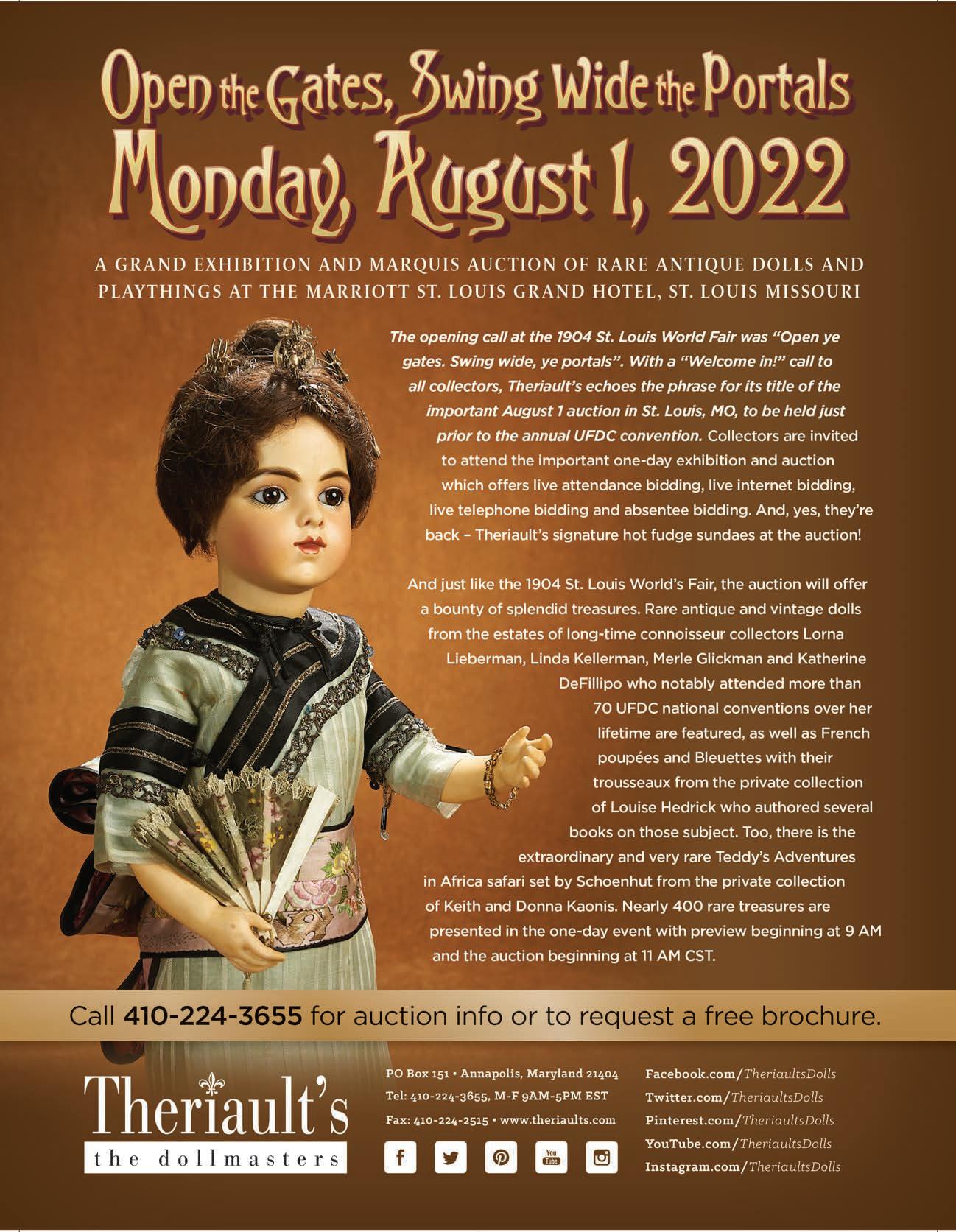







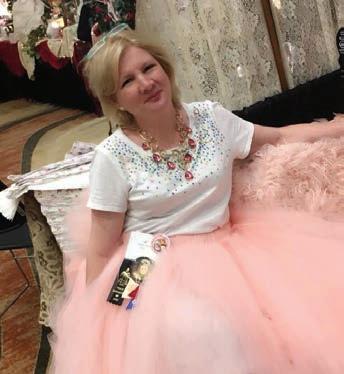
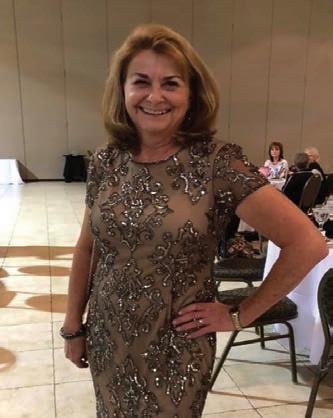

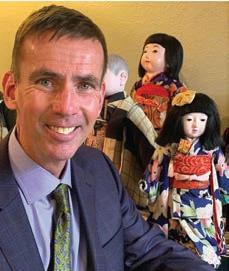
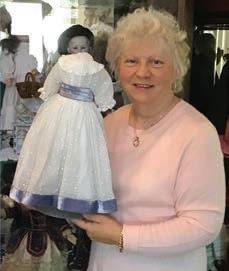

Minty 18” Shirley Temple all original in 1936 Curly Top blue & white dress w/ pin Beautiful $395.
14” Effanbee Skippy all original in Sailor suit w/ hat, great condition $245.

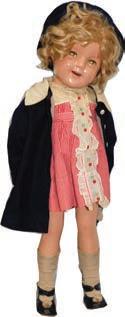
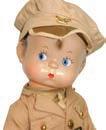
14” Effanbee Patsy in vintage sun suit beautiful condition $129.
20” Alexander Cissy in 1956 pink satin A-line gown, slip & w/ fur wrap (hard to find outfit), bracelet, ring & shoes $965.
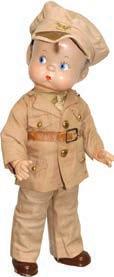
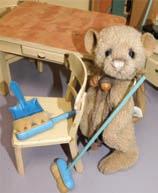
14” Effanbee All Original Skippy Soldier with great compo, belt a bit worn at buckle $265.
25” Communion Girl in original clothing Germany 6 w/ Revalo look, HH wig, blue sl eyes, beautiful coloring $495. 6.5” K*R 17 on 5 piece body w/ molded shoes, blue sleep eyes, mohair wig $165.
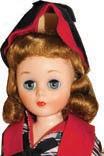
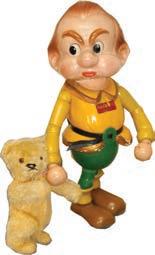
10” Ideal 1939 Gabby from Gulliver’s Travels, compo & wood jointed doll, few chips on inside rim of coat, few paint chips on head $225.
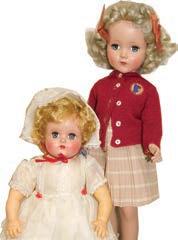
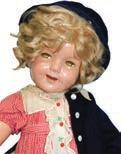
5.5” Steiff 1950’s golden mohair bear #5315.01 w/ button & ear tag, some wear $125.

10”


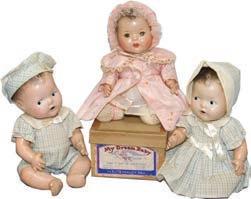
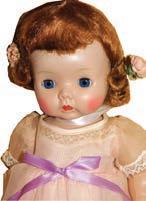

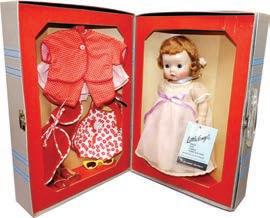
10” R & B My Dream Baby All Original w/ Box, sleep eyes, brown molded hair, some spots on coat, sweet white organdy dress w/ pink trim $149.95
12.5”
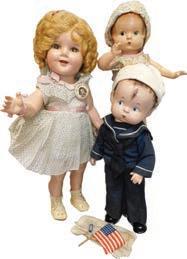
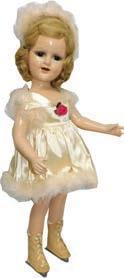
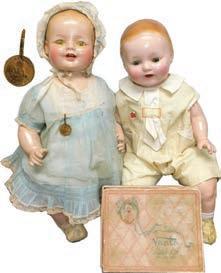
15” Alexander 1952 all original Bitsey? In organdy dress & bonnet, hard plastic head, vinyl/ cloth body, high facial coloring $105. 21” Arranbee Nancy Lee all original late 40’s, few holes in sweater $105.
Nancy Ann Style
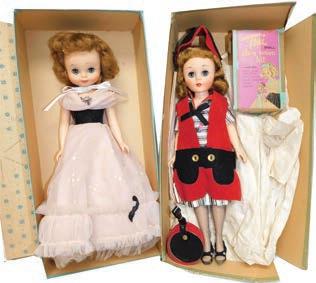
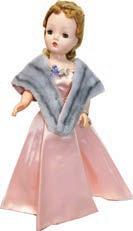
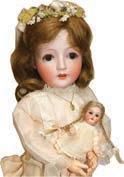
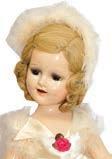
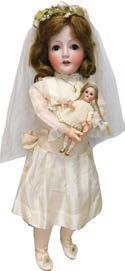
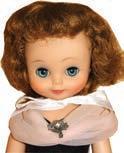
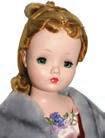
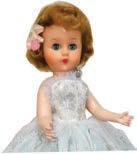
Show Dolls 18” All Original Her Royal Majesty, The Queen #3401, crown missing a few stones $289.
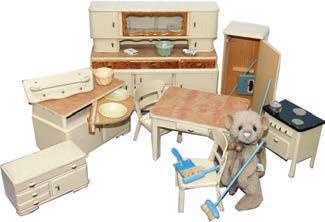
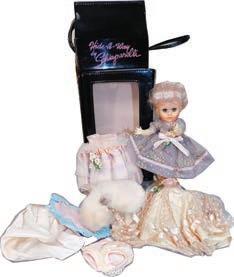
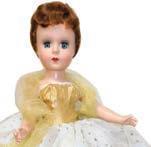
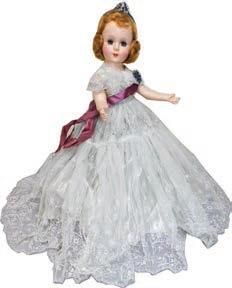
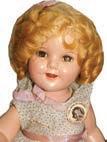
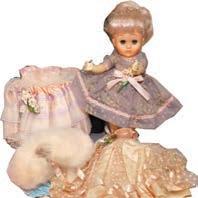
Golden Gleam #1902 w/ hand tag, missing flower in hair $265.
Vinyl face/ hard plastic body, all original $189.95
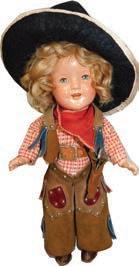
27”
21” Alexander Sonja Henie All original in white satin tagged dress w/ marabou trim, head piece & skates, slight crazing $225.
11” Texas Ranger Shirley Temple all original w/ gun, hat band reads – 1836 Texas Centennial 1936, tin eyes, nice compo $795.
1950’s
1940 – 50’s German Wooden Kitchen Furniture, scaled for a 7 – 10” dolls – Cabinet 12x10x4, work counter 8x5x4.5, lower cabinet (door off hinge) 5.25x3.5x2.5, stove 4x4.5x3, broom closet 9x3.5x2.5, table 7x4x5, 2 chairs 5x3x3 & towel rack 5.5x2 $265. 7” Artist made jointed alpaca mouse by Tender Heart Teddies – Cathy Knapp $99.95
21”
28” S & H 1079 – 13 ½ DEP, brown sleep eyes, pierced ears, beautiful BJ body, little peppering by nose, antique leather shoes $425.
9.5” 1920’s Early Black Folk Art dolls w/ wooden heads, painted facial features, leather arms & legs $195.
14”
14F
published by the www.antiquedollcollector.com
Publications Director: Lisa Brannock
Editor-in-Chief: Gay Bryant
Production Director: Louann Wilcock
Art Director: Lisa Claisse
Administration Manager: Valerie Foley
Social Media Director: Brigid McHugh Jones
Contributors: Elizabeth Ann Coleman, Linda Edward, Bradley Justice, Samy Odin and Andy and Becky Ourant
Subscription Manager: Jim Lance
Subscriptions: adcsubs@gmail.com
Display Advertising:
Lisa Brannock lbrannock@antiquedollcollector.com phone: 717-517-9217
Monica Bessette monicab@antiquedollcollector.com phone: 717-752-9090
Classified & Emporium Advertising: Louann Wilcock louannw@antiquedollcollector.com phone: 872-216-8842
Design Team
Lisa Claisse adclisa@gmail.com Louann Wilcock louannw@antiquedollcollector.com
Marketing: Penguin Communications, Inc.

Editorial: Gay Bryant, antiquedoll@gmail.com
Send all catalogs to this address: Antique Doll Collector, 4800 Hampden Lane, Suite 200, Bethesda, MD 20814
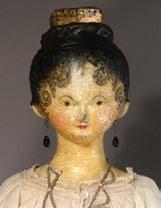
Subscriptions: Send to Antique Doll Collector, P.O. Box 349, Herndon, VA 20172. Phone: 631-261-4100
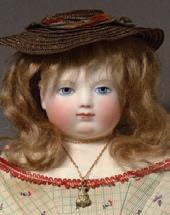
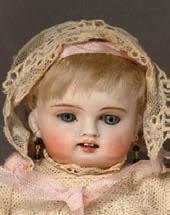
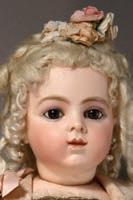
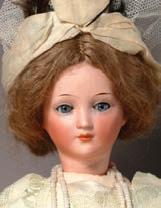
Subscription Rates:
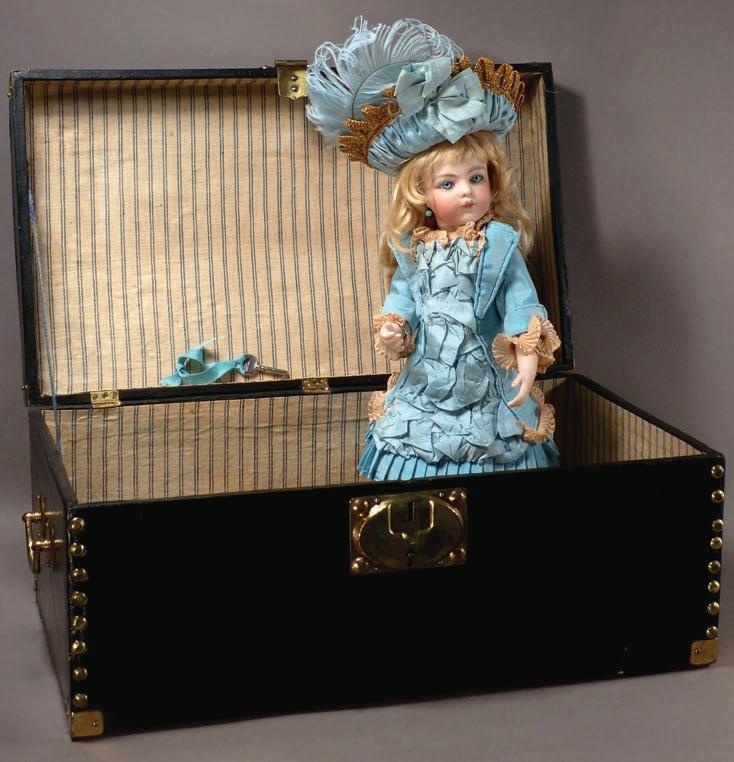
One Year $49.95; Two Years $95.90. First class delivery in U.S. add $34.95 per year. Outside the U.S. add $35 per year. Foreign subscriptions must be paid in U.S. funds. Do not send cash. Credit cards accepted.
Antique Doll Collector (ISSN 1096-8474) is published monthly with a combined issue in July/August (11 times per year) by the Puffin Co., LLC, 4800 Hampden Lane, Suite 200, Bethesda, MD 20814

Phone: 631-261-4100
Periodicals postage paid at Northport, NY. and at additional mailing offices. Contents ©2022 Antique Doll Collector, all rights reserved.
Postmaster: Send address changes to Antique Doll Collector, P.O. Box 349, Herndon, VA 20172.
Antique Doll Collector is not responsible for any inaccuracies in advertisers’ content. An unsolicited manuscript must be accompanied by SASE. Antique Doll Collector assumes no responsibility for such material. All rights including translations are reserved by the publisher. Requests for permissions and reprints must be made in writing to Antique Doll Collector. ©2022 by the Puffin Co., LLC.
Important: We need your old address and your new address. The Post Office will forward magazines for 60 days only. Call 631-261-4100, email at adcsubs@gmail.com or write to us at: P.O. Box 349, Herndon, VA 20172

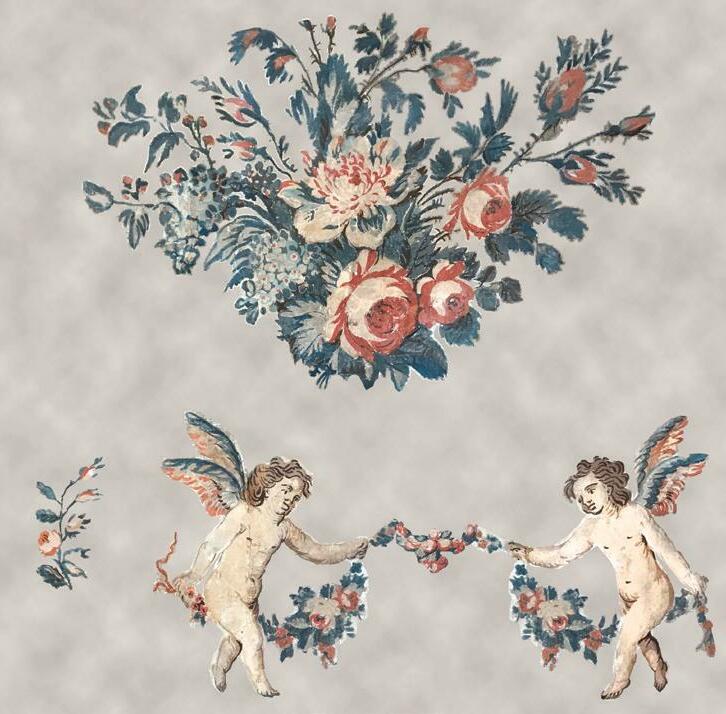
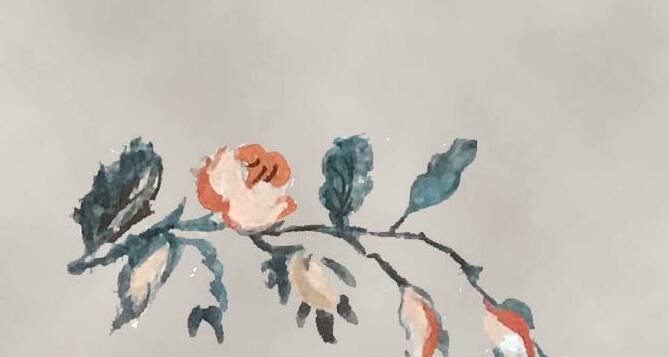
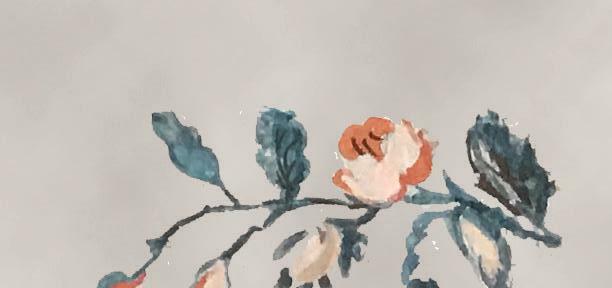
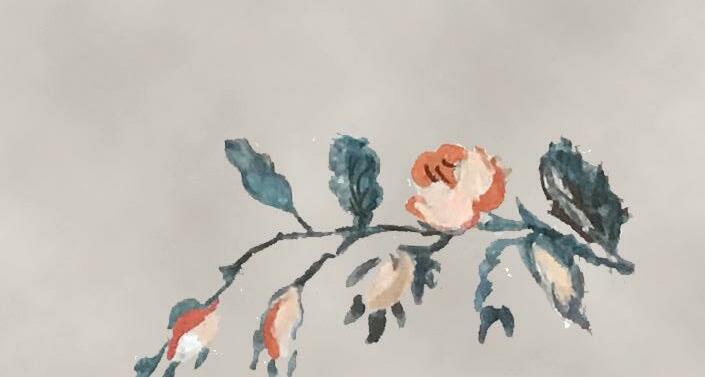
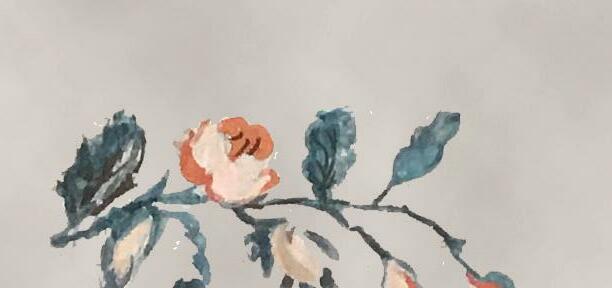
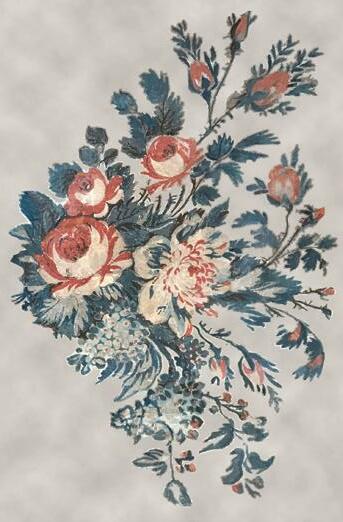
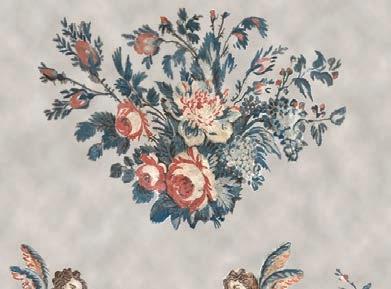
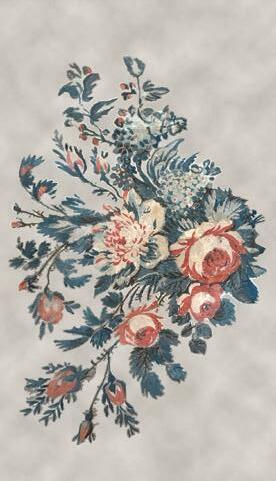
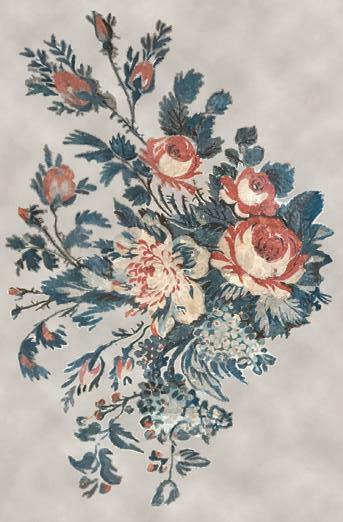
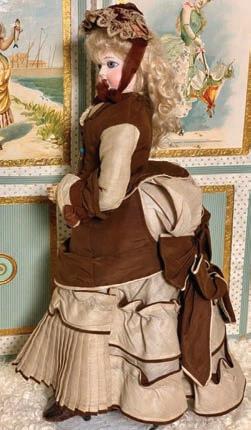
Fine Dolls & Precious Playthings from our Past www.beautifulbebes.com Always Buying! Trades and Consignments Considered Tel: 425.765.4010 Beautifulbebes@outlook.com
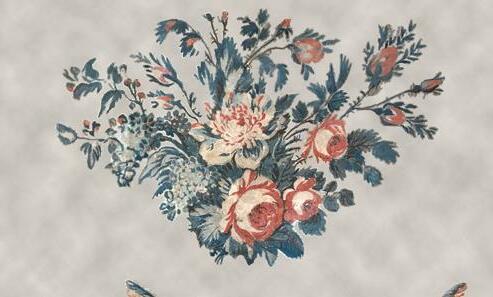

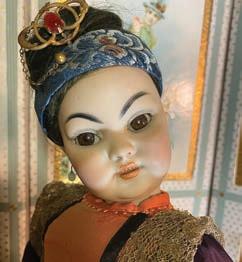

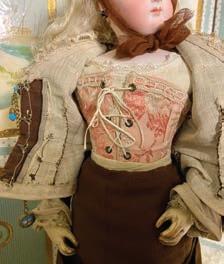
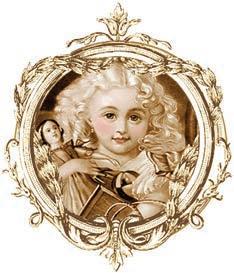
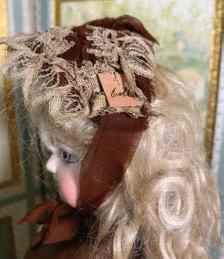
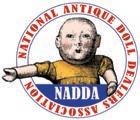
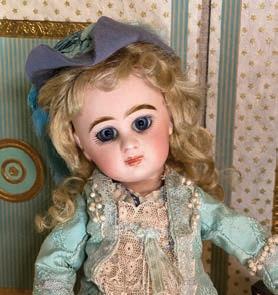
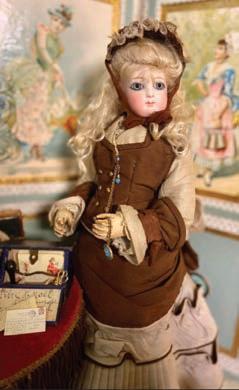
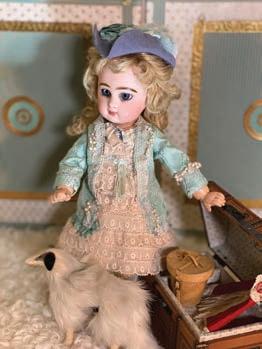
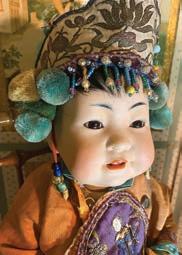
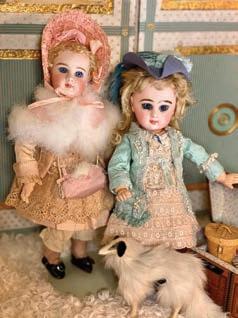
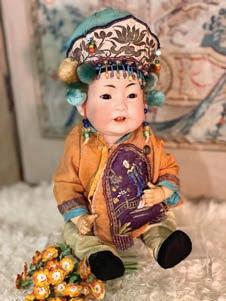
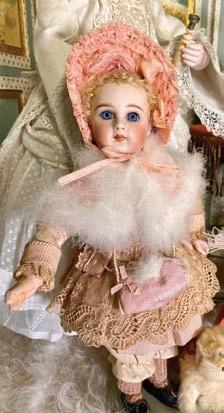
Tiny Bébé - Rare to locate 10 ½-inch Bébé made to appeal to the French market. Domed head, spiral threaded blue eyes, lovely closed rosebud mouth, beautiful creamy bisque, charming pink ensemble with swan’s down edged cape, tiny leather shoes, quality straight wrist body, generally excellent condition. Curly hair is firmly attached. So adorable in person! $3800
Petite size 1 Jumeau - It’s time to meet one of the tiniest little Jumeaux in the house! This little darling is 9 ¾-inches tall… Huge blue eyes, generously swept with lashes, and a precious closed mouth give her such an innocent look. Her original wig and cork pate have stayed with her over the years. Her body bears the blue Jumeau stamp and her head is stamped with the red Tete Jumeau 1 mark. She is charming in her blue ensemble and tiny leather shoes. This darling is in generally excellent condition. Short shadow line in the exterior glaze of her left temple. It is not through the bisque. Most likely a manufacturing anomaly and does not distract from the charm or value of this little darling. These tiny ones are so hard to come by! $7350
Come to Booth 503 for Fantastic Timeless Treasures at the UFDC Convention Salesroom August 2-6
Adorable Kestner Baby13-inch Asian Kestner Baby in excellent condition with all original black wig, extravagant beaded hat, matching costume and slippers on five piece baby body. Marked 243. Beautiful bisque, gorgeous expressive face and charming presentation. All in wonderful condition. $2600
Wood Body Fashion17 ½-inch Wood Body Fashion in an all-original stunning bronze and tan weighted silk and wool walking suit with fabulous bustle and detailing. Original matching bonnet, wonderful turquoise enameled watch pendant, and antique leather boots. This beauty enjoys a deluxe articulated body, pristine creamy bisque head with desirable almond blue eyes. Antique undergarments and a beautiful thick blonde mohair wig with loads of curls complete this charming Mademoiselle’s toilette. Truly a treasure! $10,500
Exceptional Simon Halbig 1199 Asian doll with beautifully modeled features. This 19-inch doll is in excellent condition overall and free of damage or repair. The costume is original. The coral tunic is in fine condition, however, the silk pants are frail and will eventually need replacement. She wears her original wig and headband. This is a harder to locate model and it’s easy to see why it’s such a desirable doll with her delightful features and lifelike expression. $2275
cover doll is a French bisque poupee by Adelaide Huret, circa 1861, from the collection of Louise Hedrick, with trousseau. She is to be auctioned by Theriault's at the Marriott St. Louis Grand Hotel in St Louis, Missouri, on August 1. For more information on the auction, see www.theriault's.com. (Photo by Theriault's)
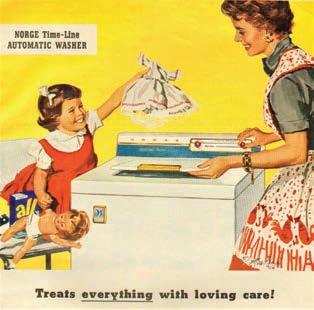
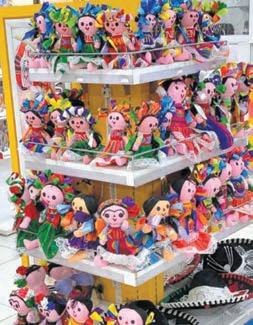

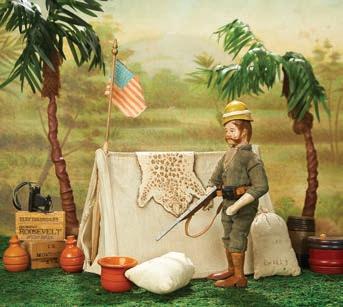
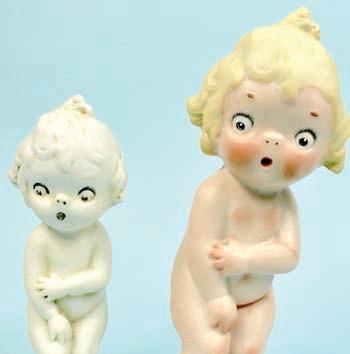
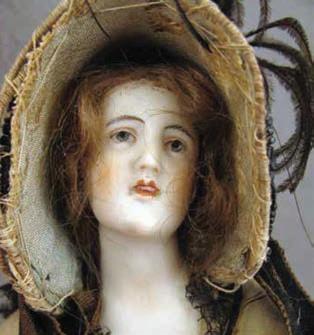
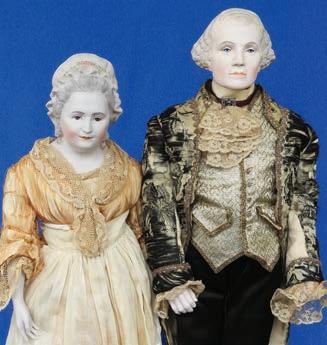
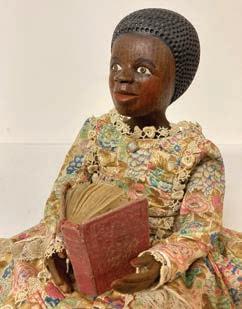
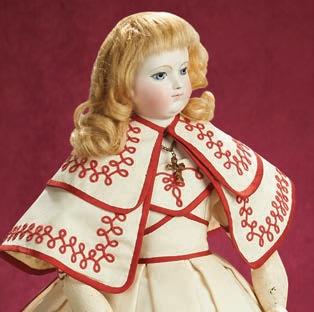
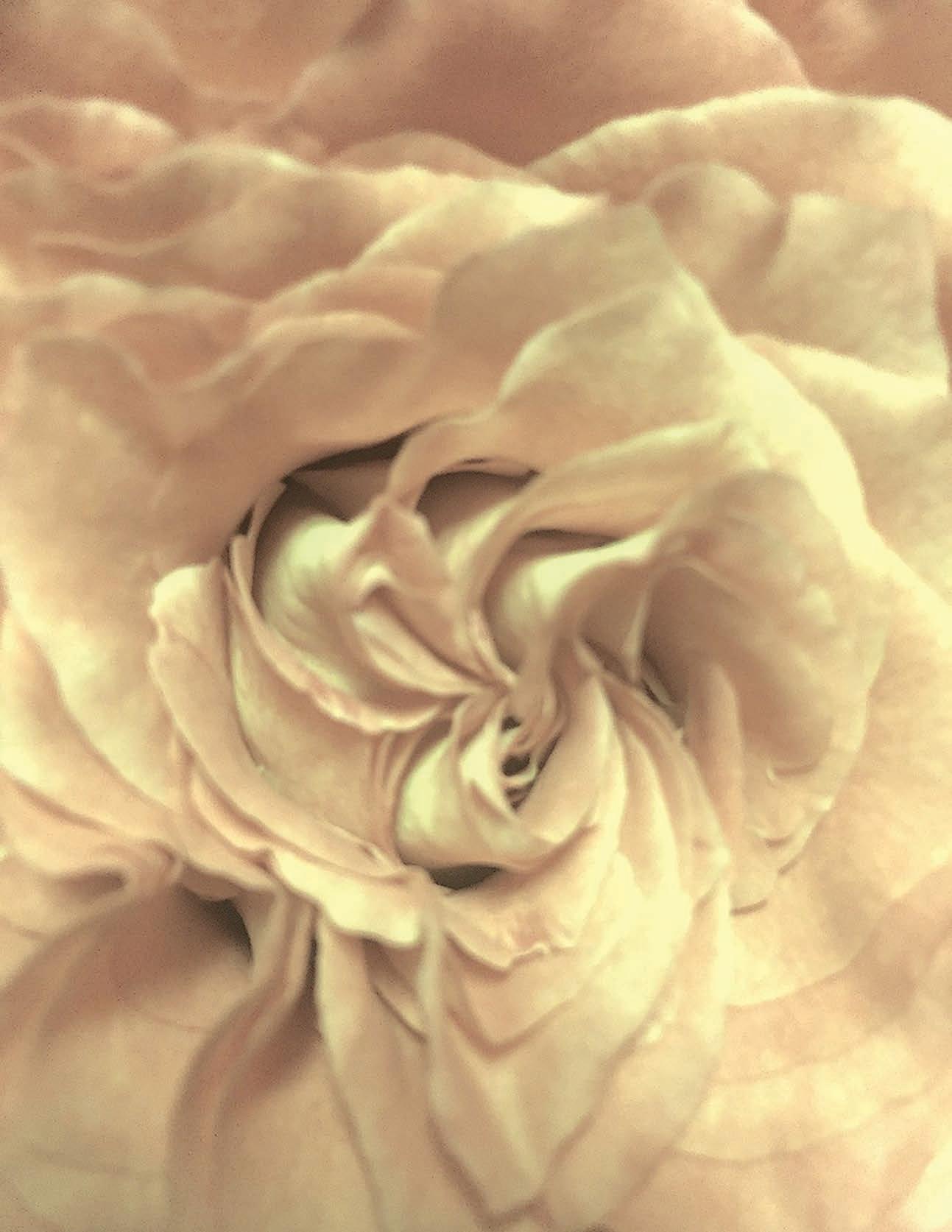
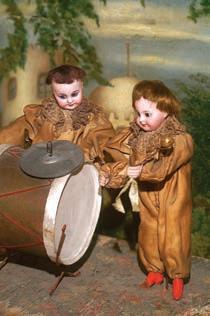
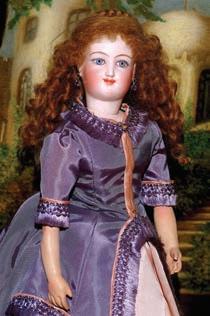
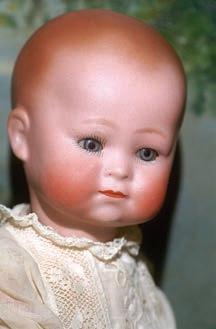
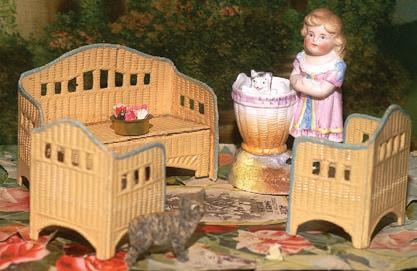

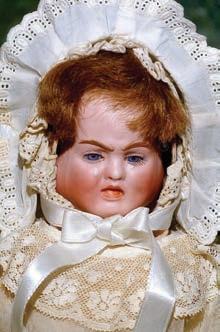
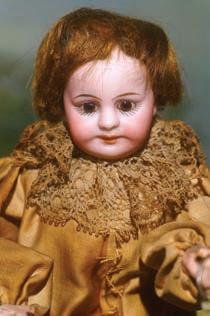
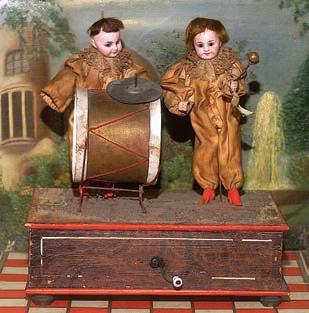
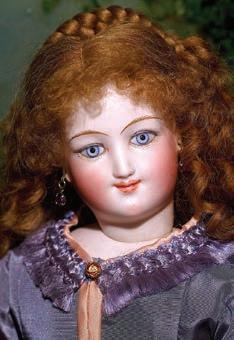
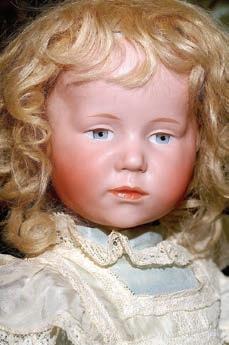
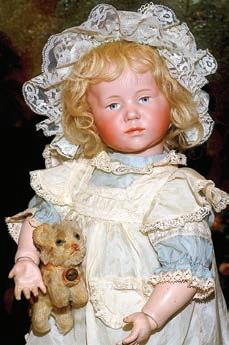
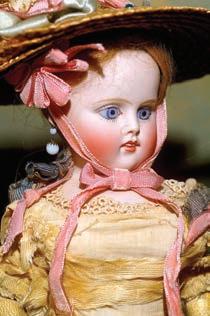
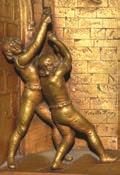
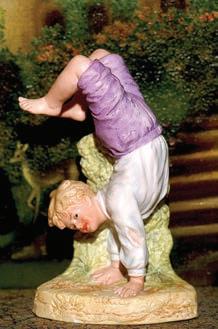
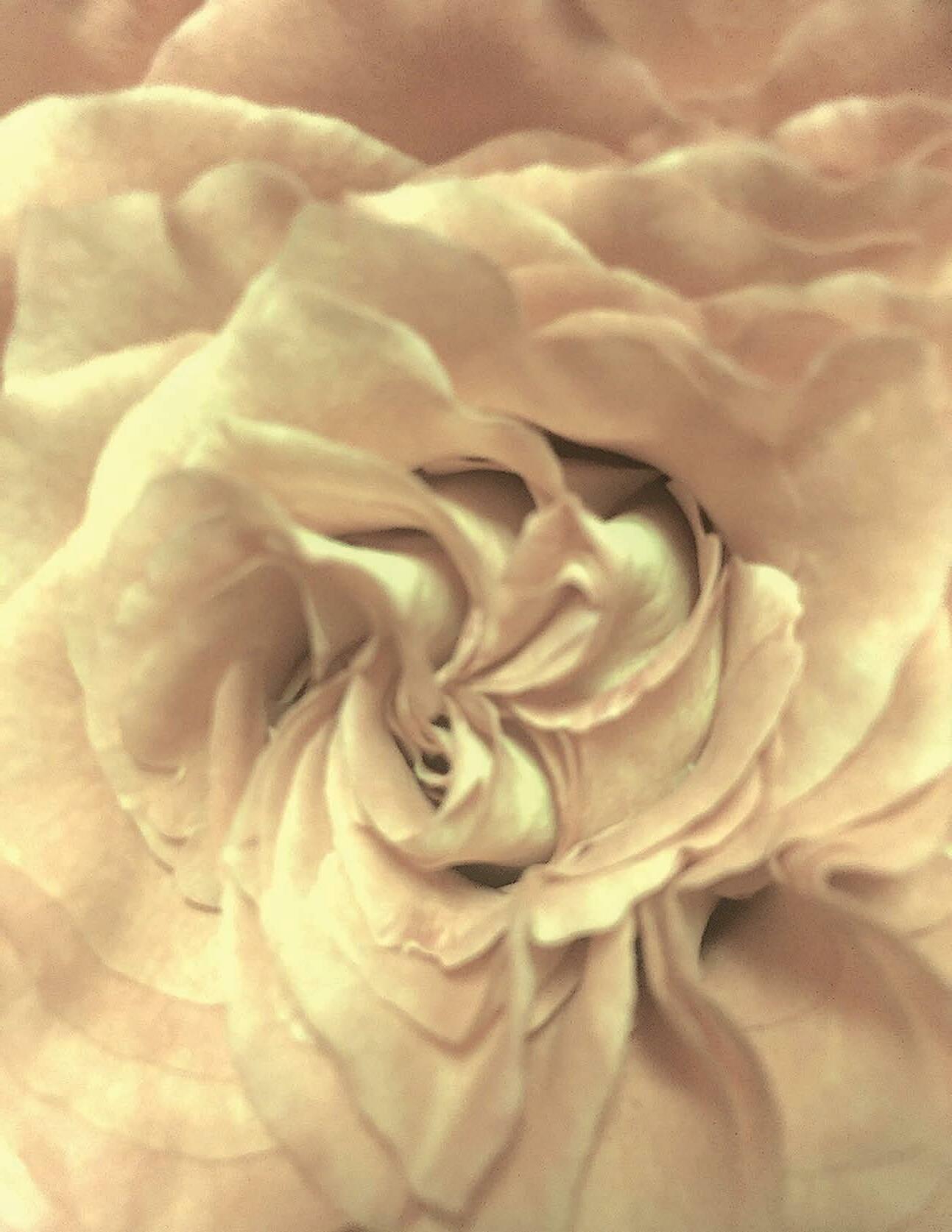

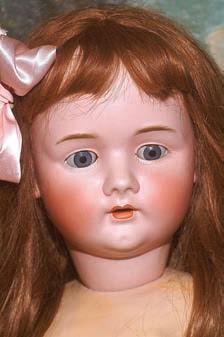
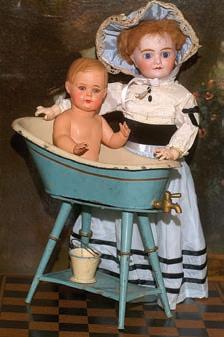
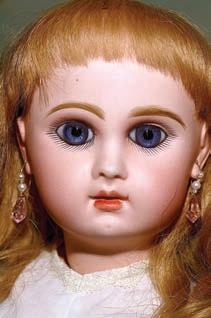
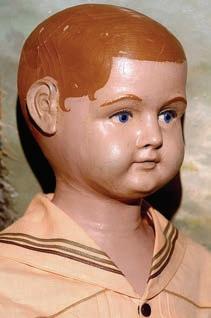
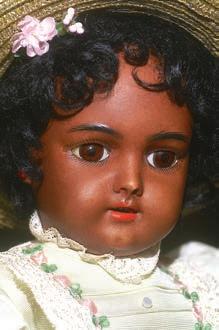
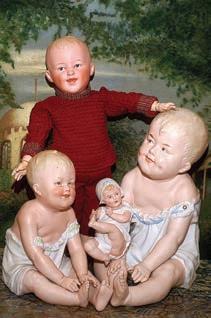
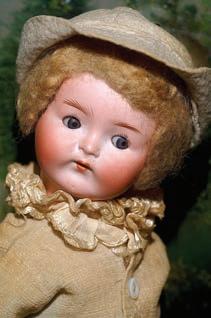
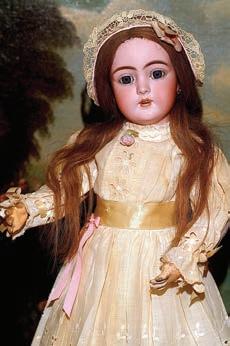
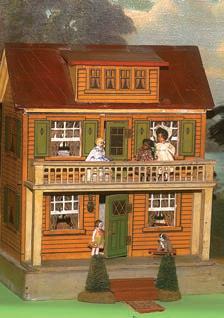
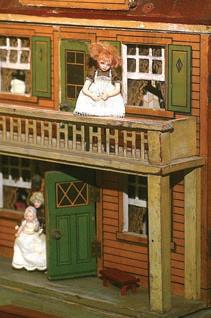
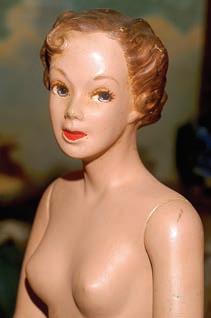
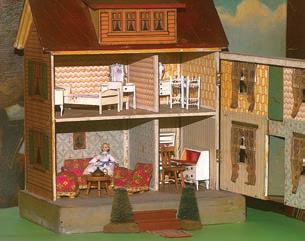

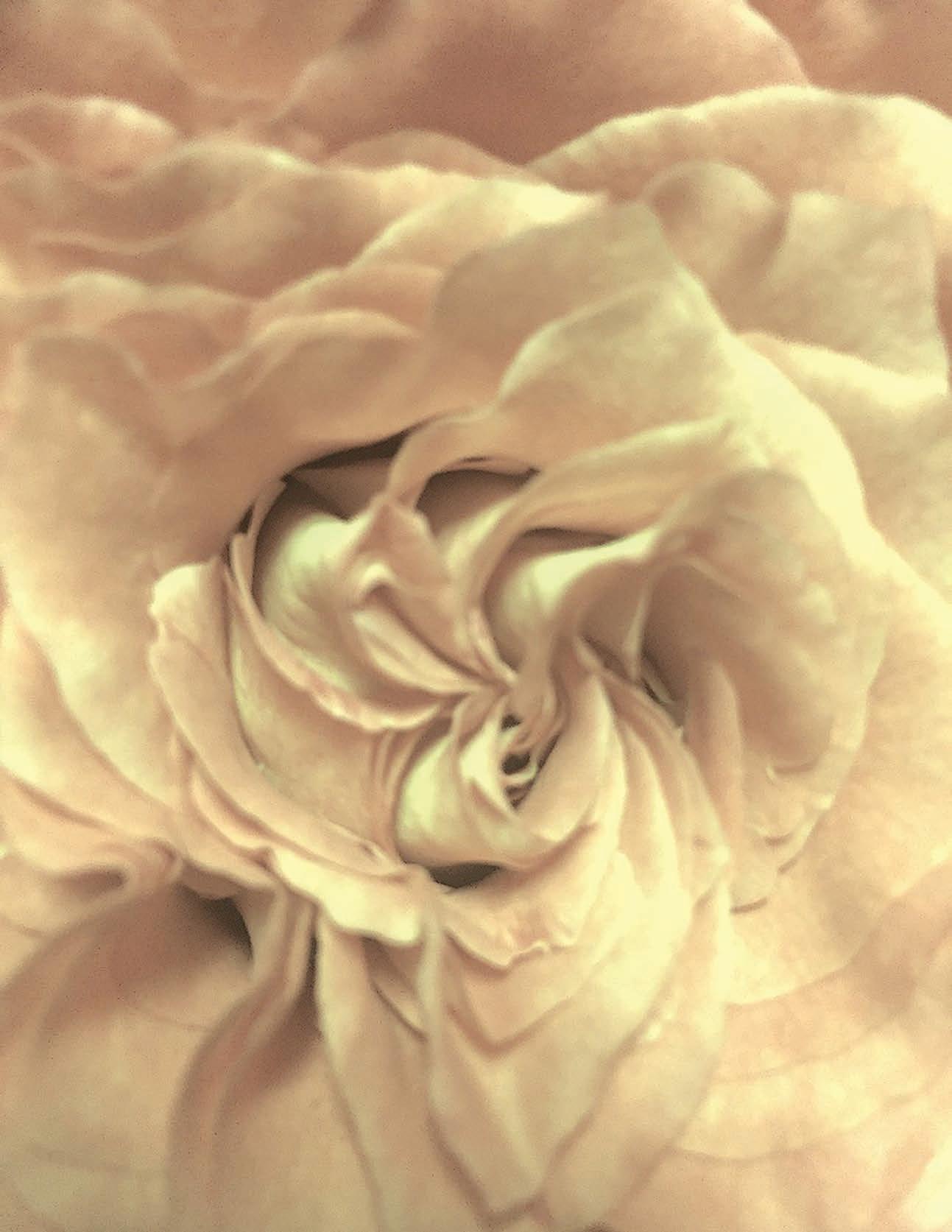
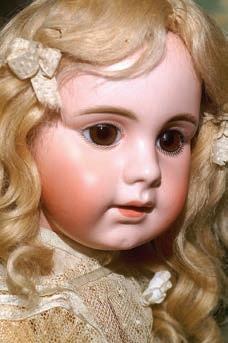
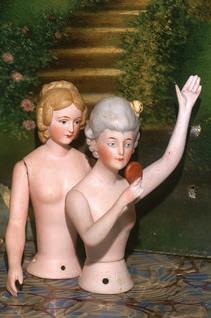
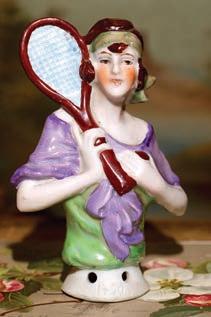
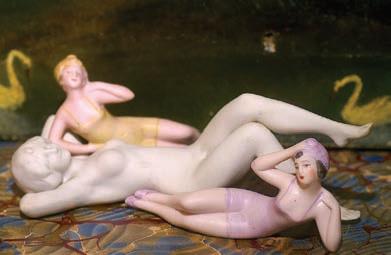
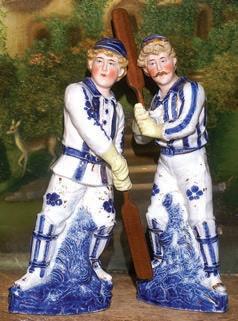
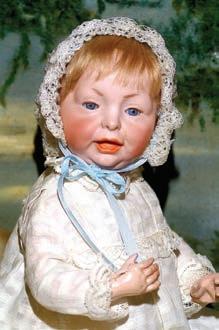
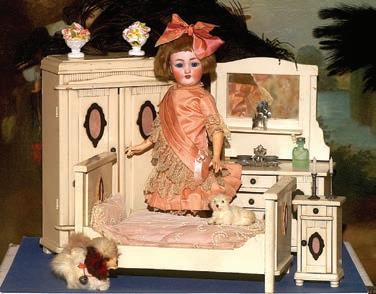
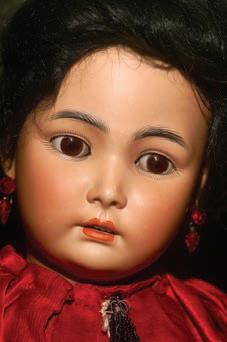
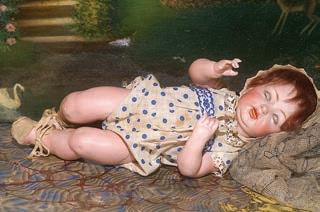
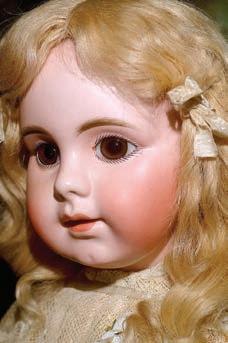
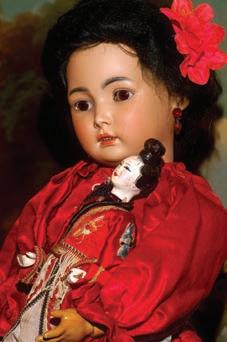
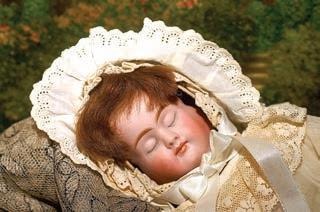
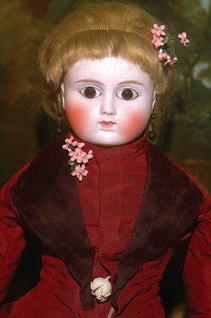
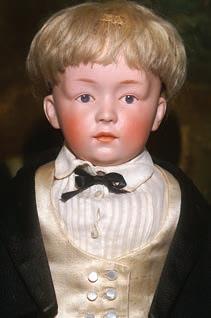
ynchronicity: the simultaneous occurrence of events that appear significantly related but have no discernible causal connection. The concept of Synchronicity was first introduced in about 1930 by analytical psychologist Carl G. Jung.
Have you ever thought about someone, and then they telephone? That’s synchronicity. Or you walk into a book store not knowing what to buy, and the book you need falls from a shelf and practically hits you over the head. That’s synchronicity.
Well, I had a synchronous doll moment on May 28, 2022. That was the day that I purchased an extraordinary Floyd Bell carved wooden doll depicting the poet Phillis Wheatley.
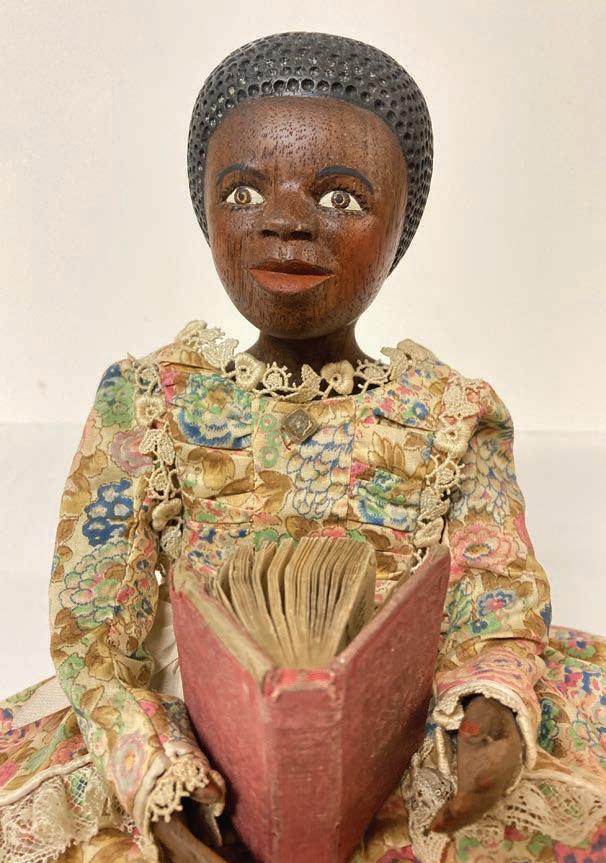
Before proceeding with my synchronicity story here is a brief introduction to Floyd Bell. For 38 years Floyd taught woodworking at Westchester High School in Los Angeles. In 1978, in order to demonstrate to his students how they could create something from a scrap of wood and actually use woodcarving to make a living, he began carving a doll, and hence his first doll was made. This was truly the “eureka moment.” And thankfully for doll collectors, it was then that Floyd decided to pursue the idea of dollmaking further. Known primarily for his outstanding hand-carved dolls depicting ethnic and historical figures, Floyd also offers the “American Heritage Doll Series” made of wood resin.
Examples of his work can be found in museum collections around the world, including the Louvre in Paris, the Wanke in Germany, the Philadelphia Doll Museum, and the White House Doll Collection in the U.S. Quoting Floyd “Each doll has its own story to tell. Dolls communicate in a special way. They have a mystical relationship with humans that I call ‘doll magic’”. This perfectly summarizes what Floyd’s dolls convey. I have known Floyd for many years and can truly say that he is, without a doubt, not only an exceptional artist but also one of the nicest people I have had the privilege of knowing.
Now to my story: I purchased Phillis from Floyd on Saturday, May 28, 2022. Floyd was exhibiting his works of art at the Santa Barbara Toy Show. “Phillis” literally stopped me in my tracks…well, that was after I gave Floyd a big hug. There was no question but that Phillis was going home with me. I have to admit I had never heard of Phillis Wheatley before Saturday. The next morning (the 29th), during my weekly phone call with my brother, I told him about my purchase and he exclaimed “I just purchased a book about poetry yesterday and the first name that popped up was Phillis Wheatley”. What a coincidence. What a synchronous moment!
Then just a few hours later I was looking at Facebook and what should appear but a posting (see below) from
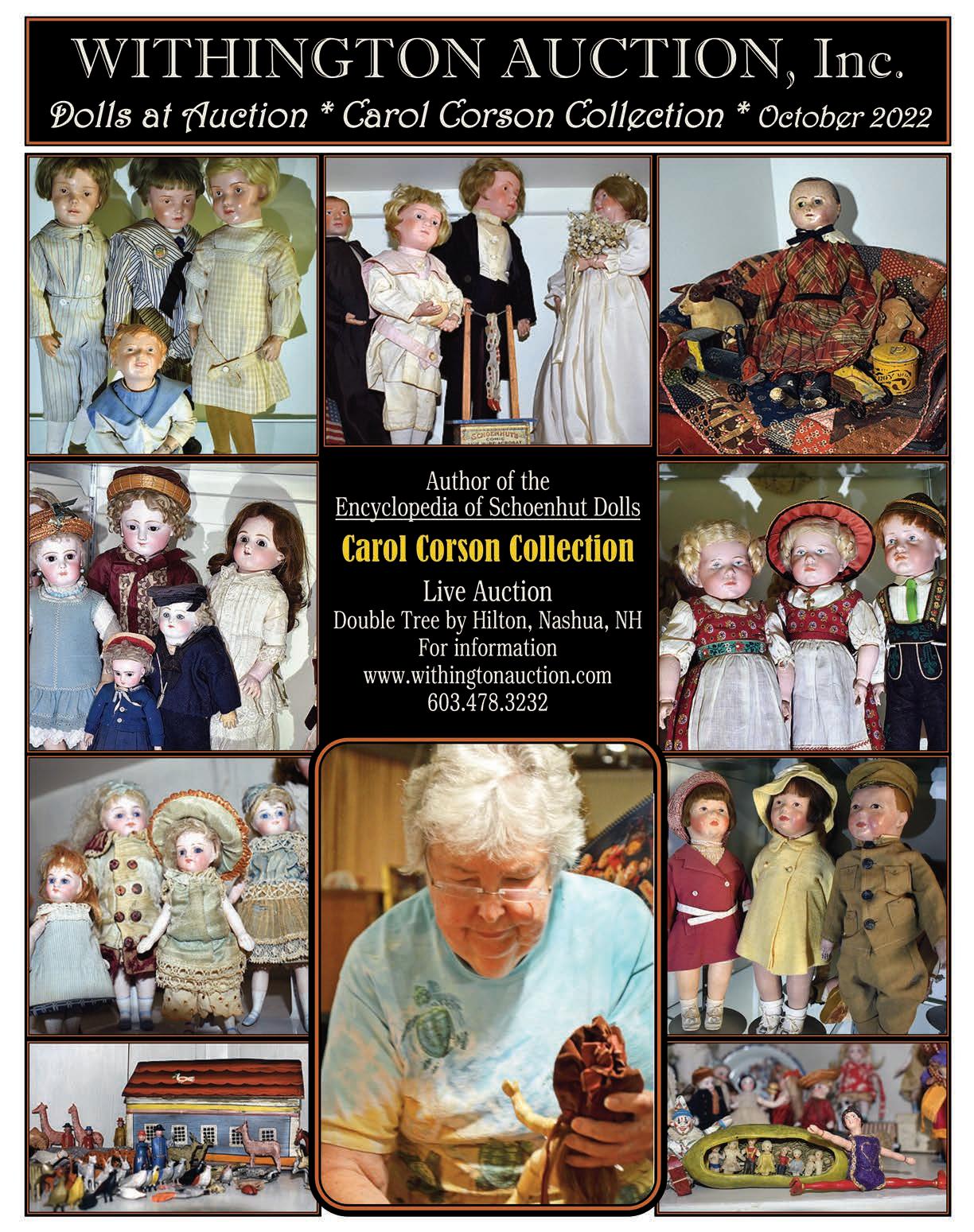
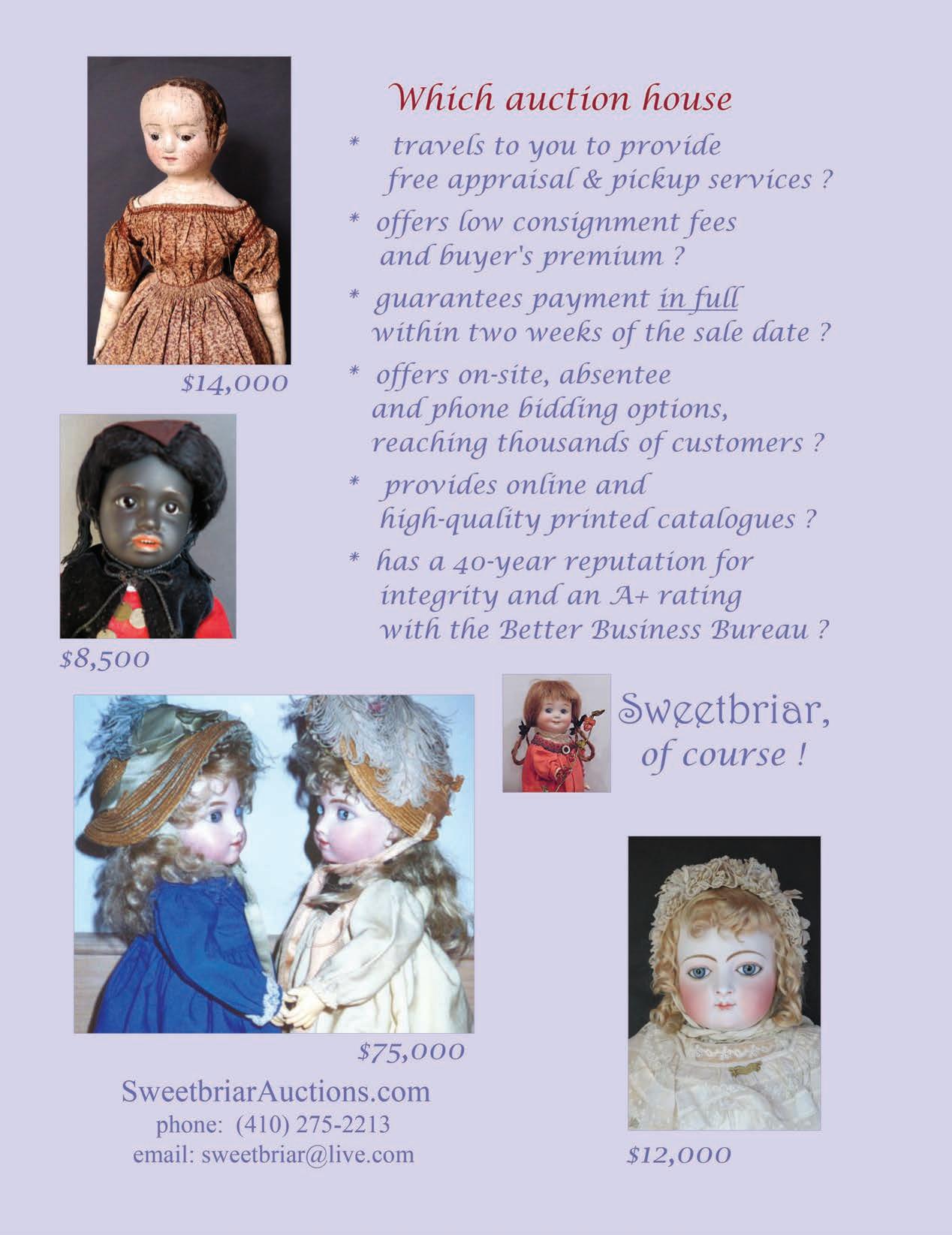
To the Editor:
Can anyone help me with the history of this 9 1/2 in. Lenci Mascotte with the typical, surprised expression on its face? I know from researching military sites (for the shoulder patch) that he's dressed as a ca. 1934 Italian artillery soldier, representing pre-Facist Italy. His uniform is cotton gabardine, brass buttons, leather boots and belt with pockets.
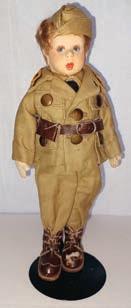
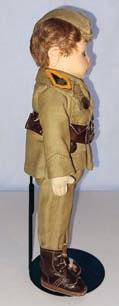
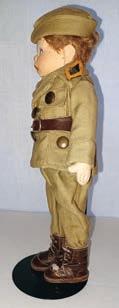
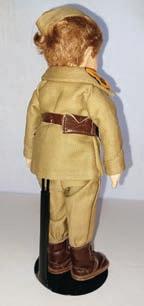
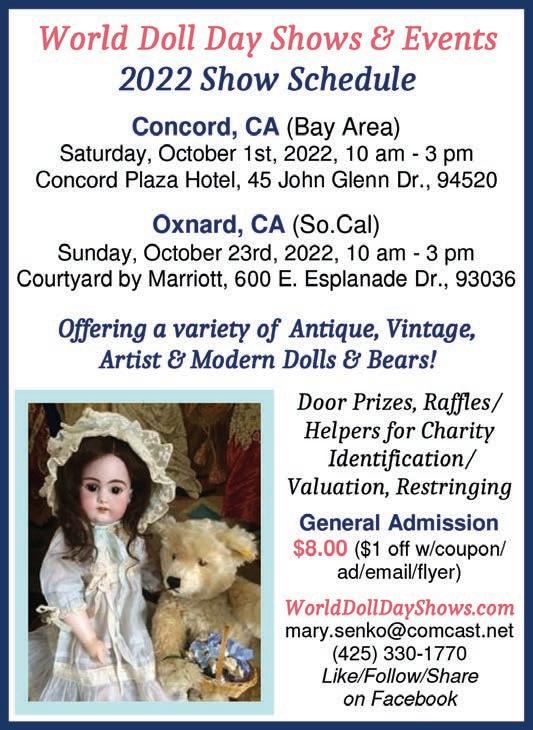
What I'd like to know is, has anyone seen another like him? Was he perhaps a special order? Any information is welcome.
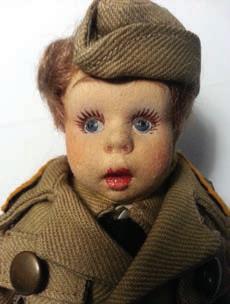
Perhaps there is a doll in your collection that you and others have never seen before. Email us a high resolution photo and any information you have to antiquedoll@ gmail.com. If you can identify a mystery doll, email us at this same address.
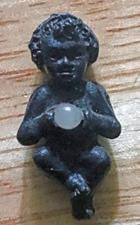
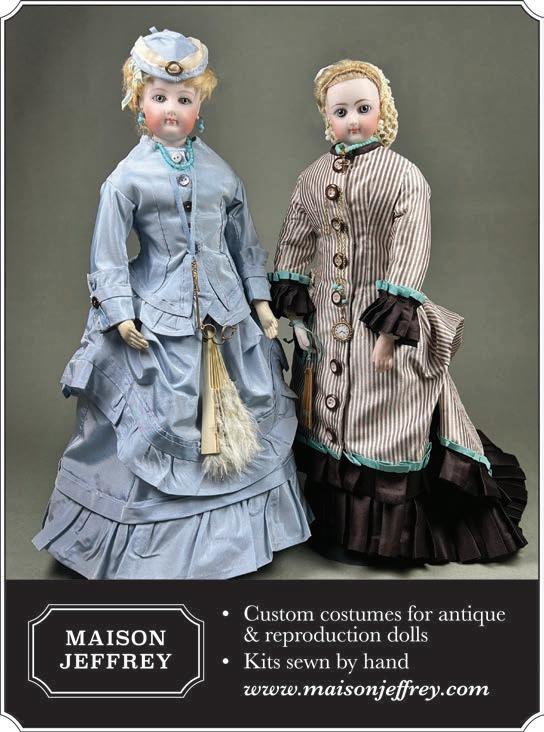
Because the doll is non magnetic and black and small, I think it may be a sterling silver doll that is badly tarnished. Sterling Silver is not magnetic and turns black with age and exposure. Try cleaning it with a good quality silver polish and look for a silver mark at the back of the doll. It is likely French or English. The British have a very good system for sterling marks that indicate the year made, place and maker. The French usually show a maker’s mark.
Shirley Stuelpnagel, a thimble and needlework tool collector.
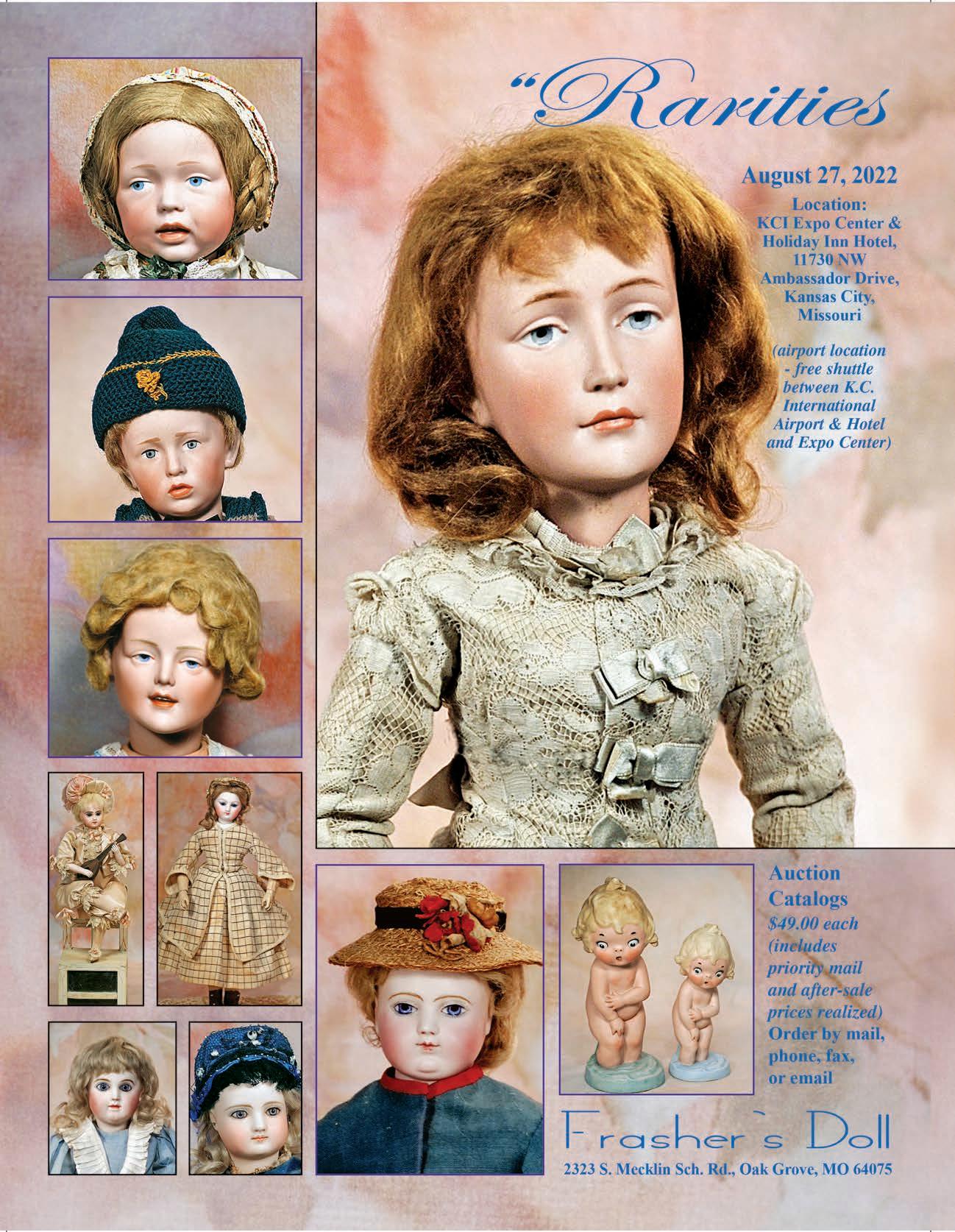
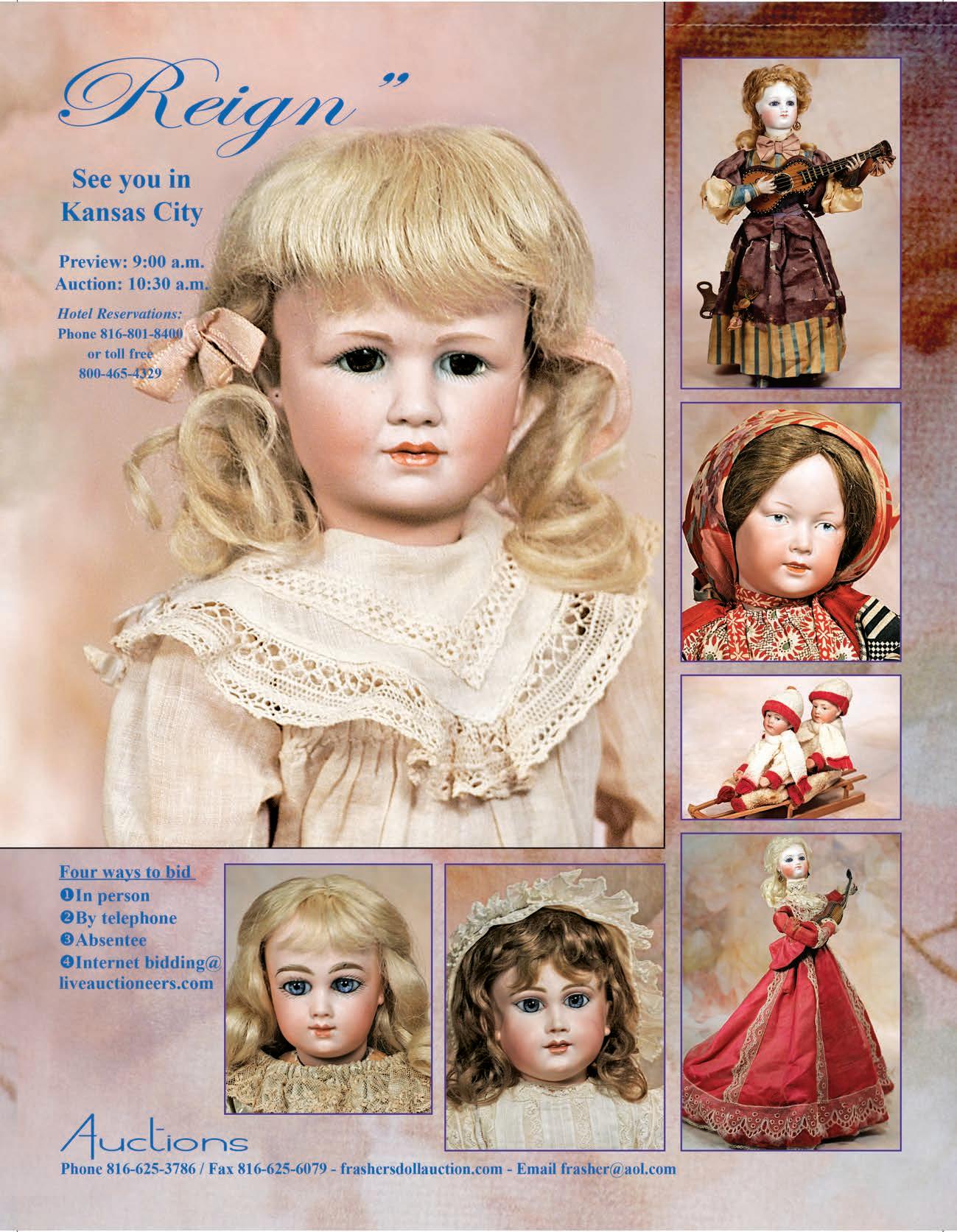
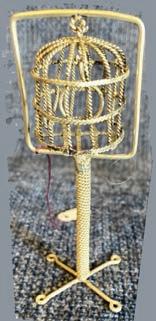
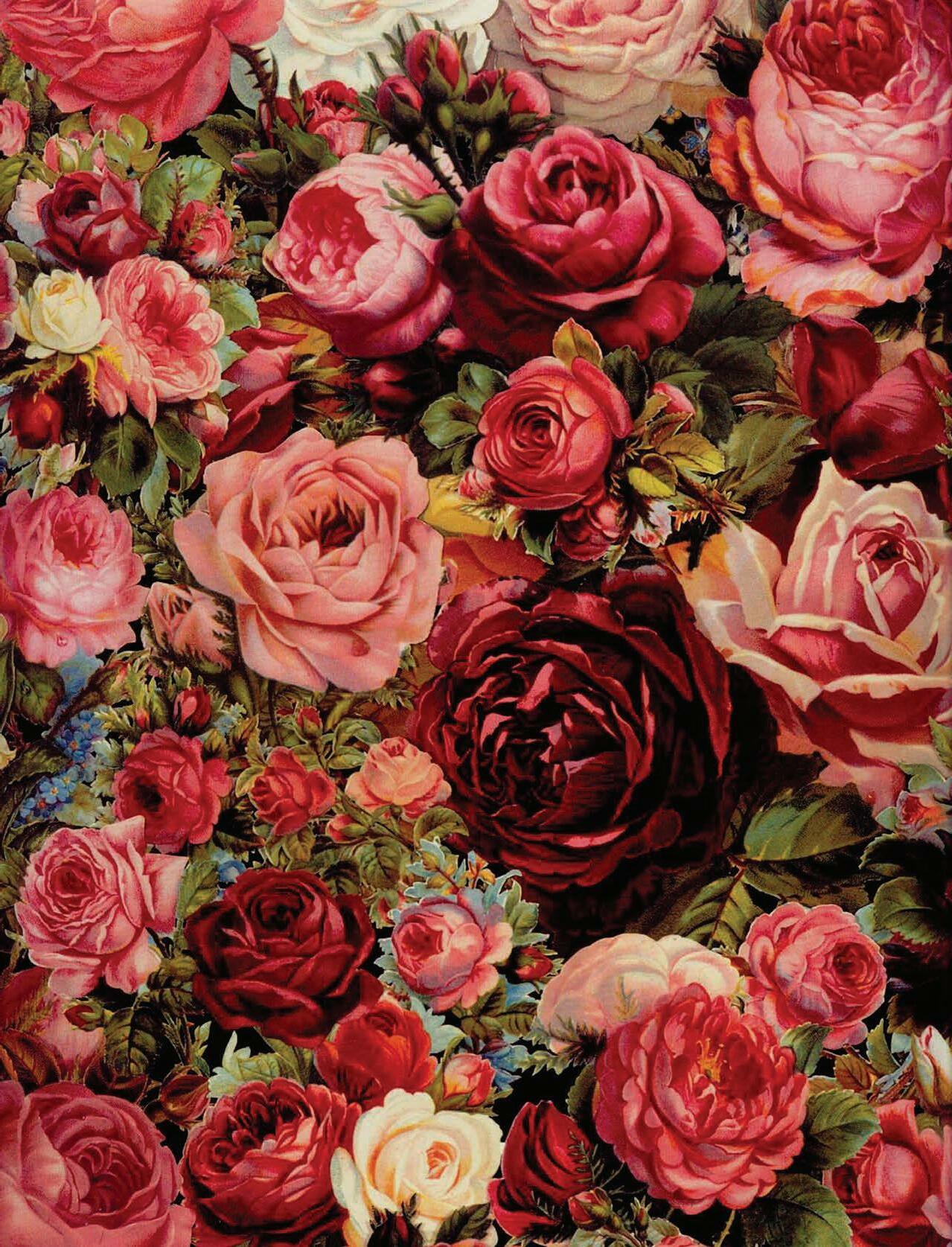
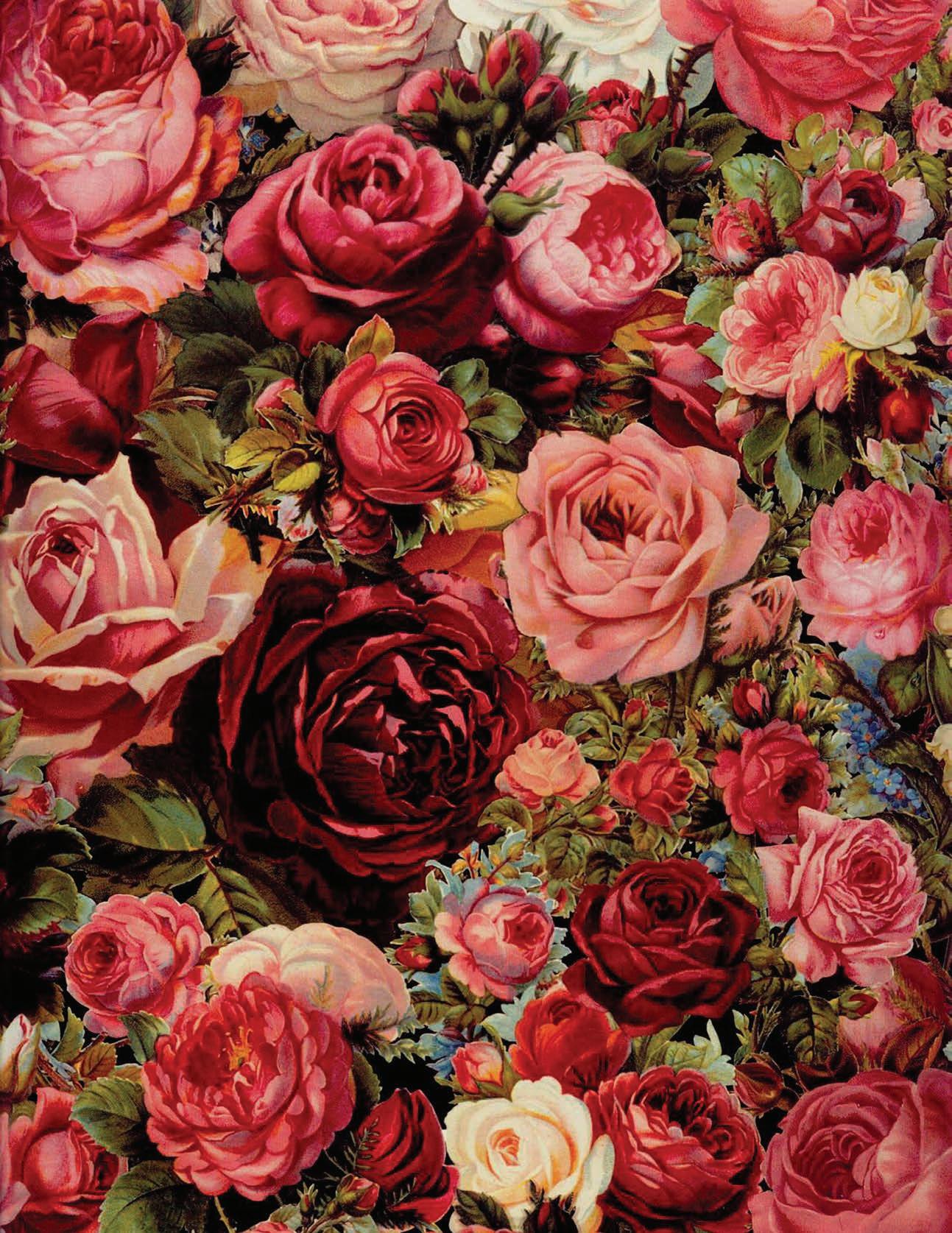
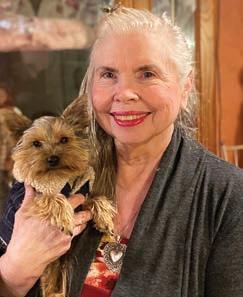
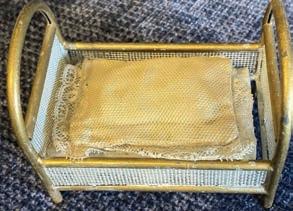
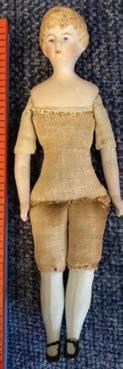
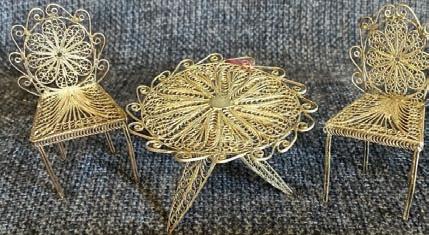

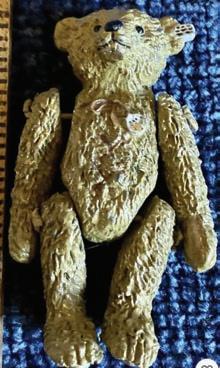
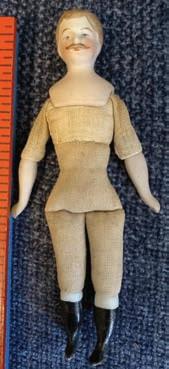
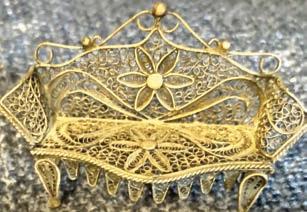
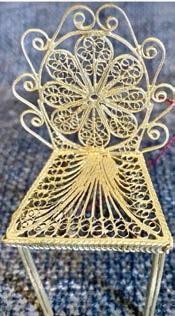
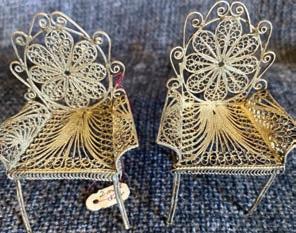
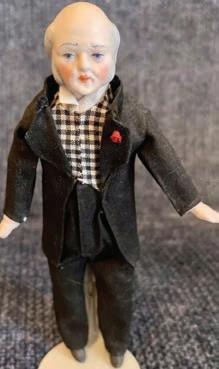
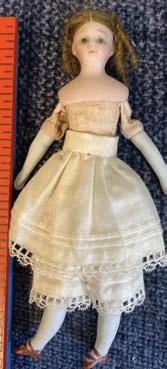
1025 Bowman Rd., Westfield, NC 27053
Find my latest treasures in a charming setting. Make an appointment to visit my private doll shop. Socially distanced and by appointment only. Please call or text me to make an appointment: 336.755.1400
Looking forward to seeing you in St. Louis at
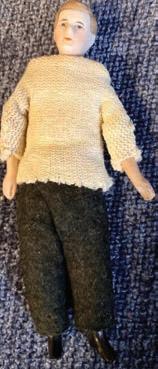
st - August 4th
You’ll be greeted by a fresh collection of brand new items, some pictured below!! Plus, my shop is always chock full of doll goodies galore and the option to buy, sell or trade! Choose from my large and well-priced collection of antique and vintage doll dresses, slips, chemise, pantaloons, shoes, wigs, ribbons, fabrics, furniture and accessories. Bring your dolls to dress, trade and repair. Have fun!!
If you are thinking of selling your doll treasures, I buy everything from one doll or doll accessory, to an entire collection. I pay excellent prices for dolls, shoes, clothes, wigs, miniatures, doll jewelry, doll houses, furniture and accessories.
Rowbear’s National Doll Festival, July 31

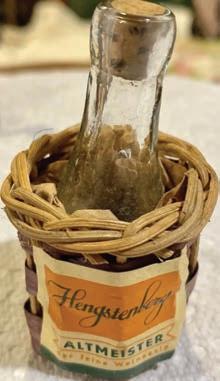
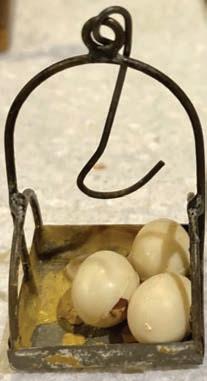
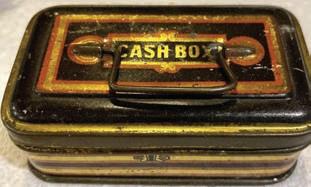
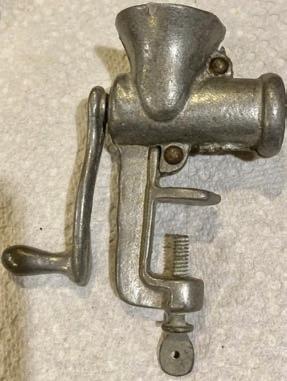
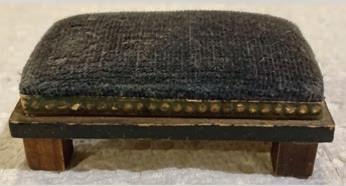
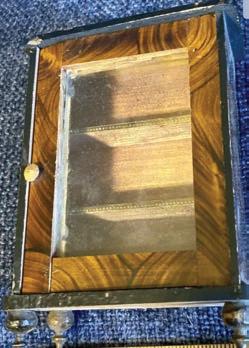
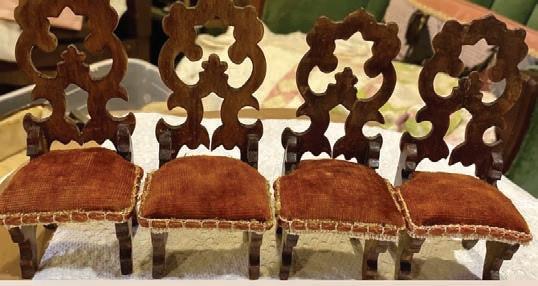
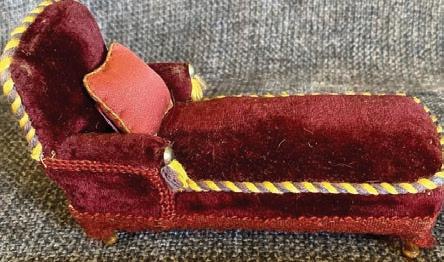
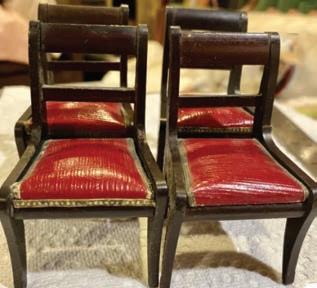
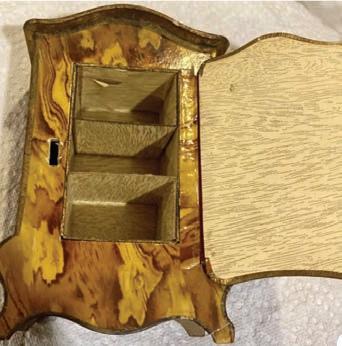
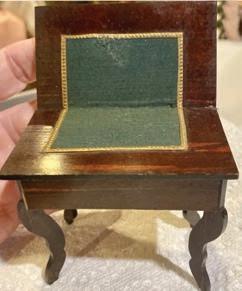
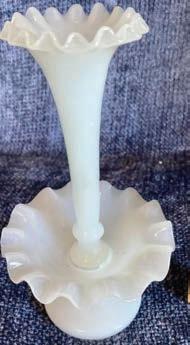
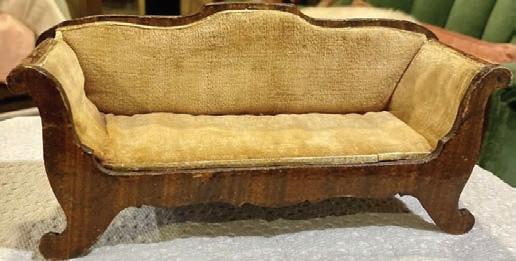
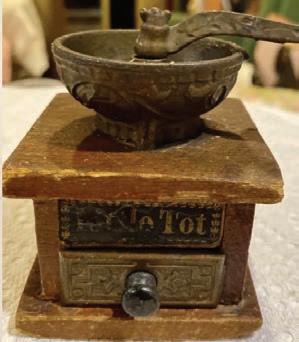


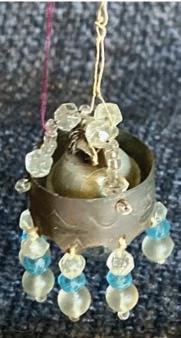
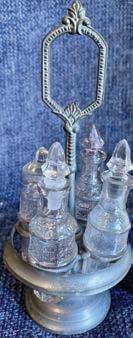
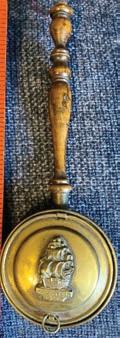
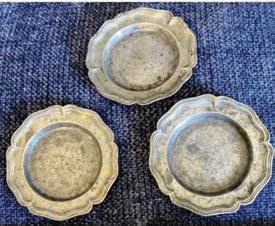
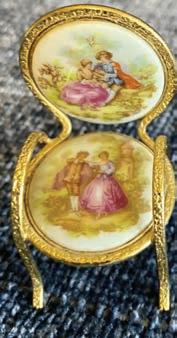
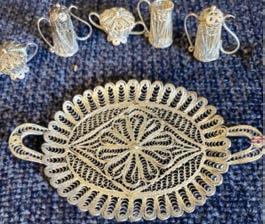
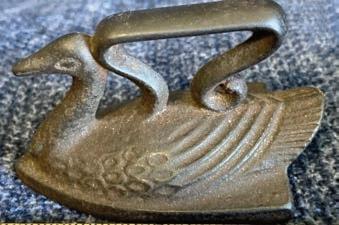
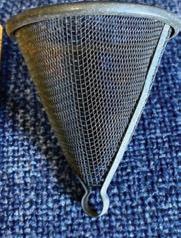
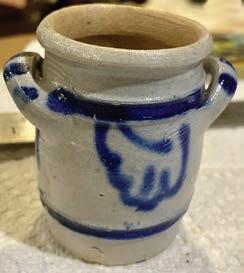
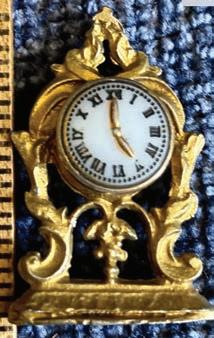
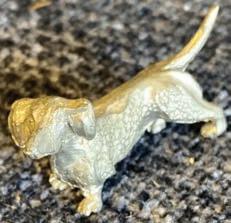
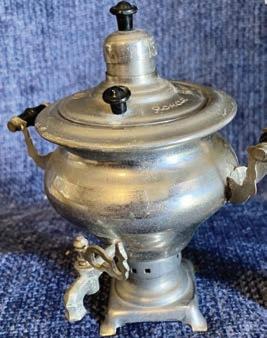
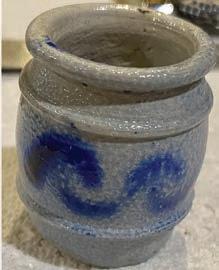
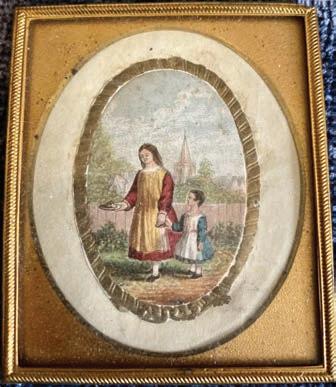
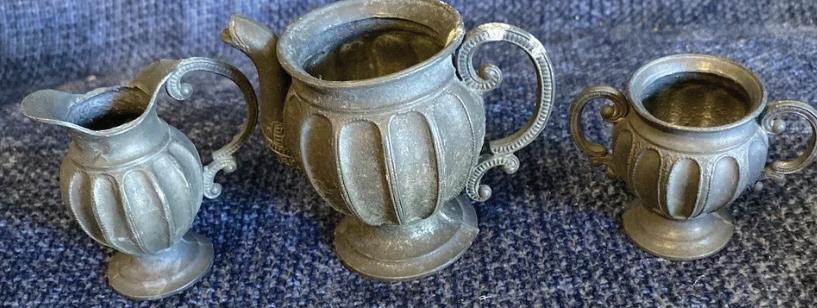
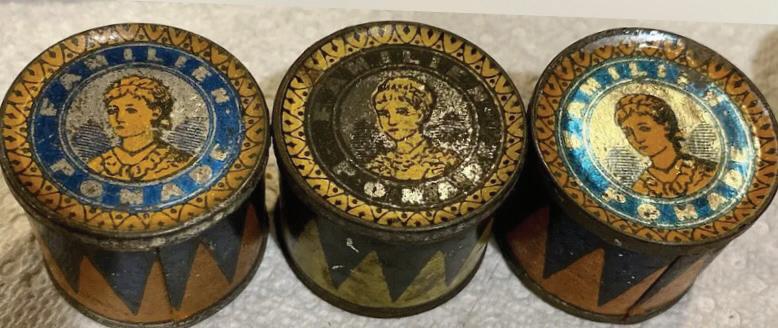
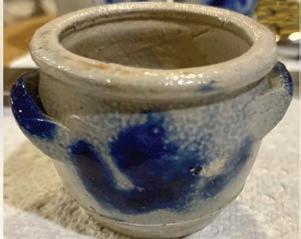
For example, Sweetbriar’s live and online auction on June 11th reported a busy and successful event, (see picture of the auction floor to the right).
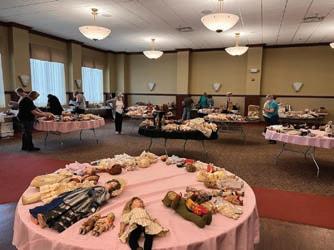
Alderfer’s has an upcoming Steiff auction on July 26th, onlineonly.
In the U.S., at the Withington’s auction on June 16th, an Izannah Walker sold for $18,486, including buyers premium, over the phone.
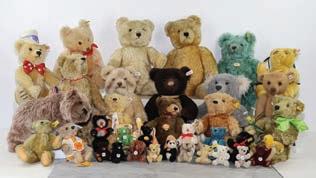
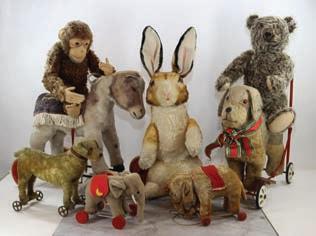
Some of the many selections available for auction in the Steiff auction.
At Theriault’s, vintage dolls are doing well – Madame Alexander results and Barbie results are both above expectations, and pictured here, far right. Complete results from the Mid-Century Dolls of Madame Alexander
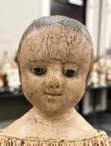
– The Judith Spencer Merrill Collection auctioned on April 9 in Annapolis, MD can be found at theriaults.com.
In other auction news, some of the Keith and Donna Kaonis Collection will come to auction at Theriault’s on August 1. At the Marriott St. Louis Grand Hotel, St. Louis, MO.
Donna and Keith were for many years, Editor and Publisher of this magazine. They are also knowledgeable and discerning collectors. Keith was particularly partial to Schoenhuts. Now, some of these rare toys are coming to auction at the Theriault’s event on August 1st. Also in that auction, a very special Huret that is seen on our cover. She is part of the Louise Hedrick Collection, Part 1. For more information, go to page 1 of this issue. See the “Teddy’s Adventures” Schoenhut article on page 26.
In Europe, we have good results to report from Galerie de Chartres. Highlights can be found on this page and more details on their website at www.ivoire-france.com/ chartres.
Top Left: #116 - 18”
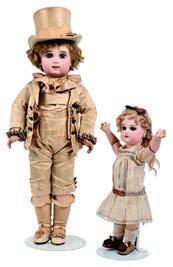
Cloth Maggie-Bessie from Salem NC, painted oil cloth features, muslin cloth body with oil painted limbs, early white cotton outfit (some holes), This fine example was in the collection of Shirley Temple, sold by Theriaults. - $8073 with BP
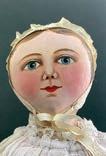
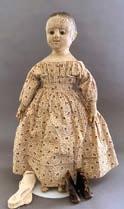
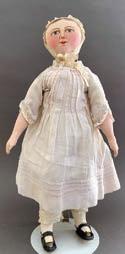
Bottom Right: #312 - 16-1/2” Cloth Izannah Walker, Central Falls RI mid-1800s, stockinet pressed head with oil cloth painted features, painted hair curls, stitched hands & toes, antique floral dress, (wear & cracking to face & legs, nose rub & ear wear. - $18,486
Galerie de Chartres Poupees (May 20): #423 Charmant bébé Jumeau 4,000/6,000/ 13,000 €
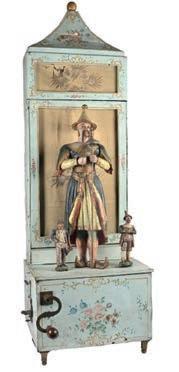
Autamatons (May 21): #570 Piano mécanique portatif “Le Mongol” 15,000/20,000/28,000 €
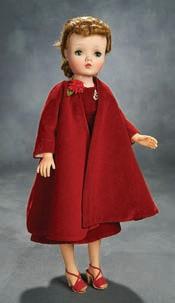
Top left: 50 Forward Barbie, The Romanotto Collection II, Lot #6. Original #1 blonde Ponytail Barbie doll with box, holes in feet, 1959. Realized: $4,200.
Top right: Brunette Cissy in Red Velvet Sheath and Swing Coat, 1957. Presale: 400/500 Realized: $1,100
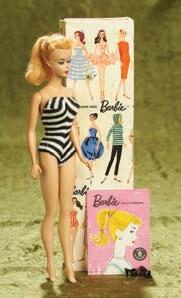 Doll auctions are alive and well for the spring/summer season.
Sweetbriar June auction on the 11th.
Doll auctions are alive and well for the spring/summer season.
Sweetbriar June auction on the 11th.

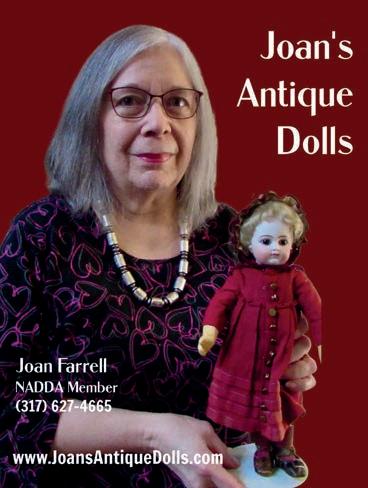
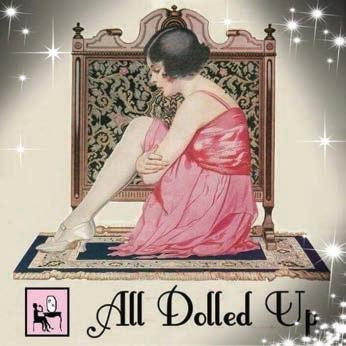
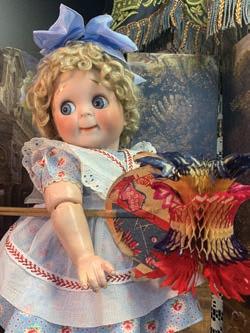
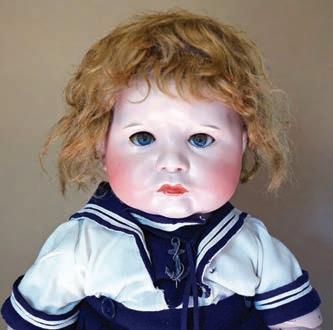
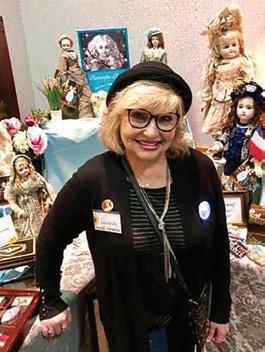
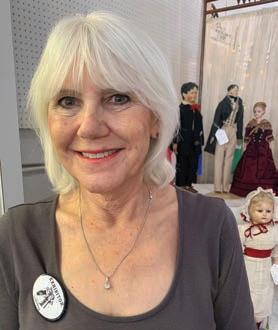

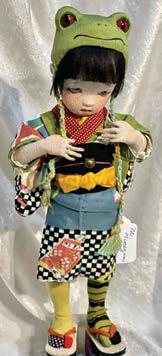
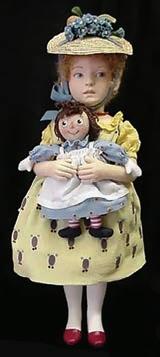
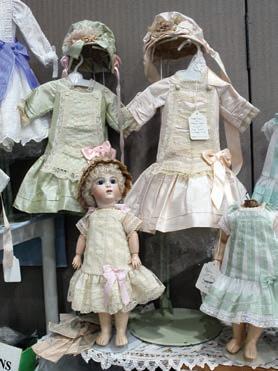
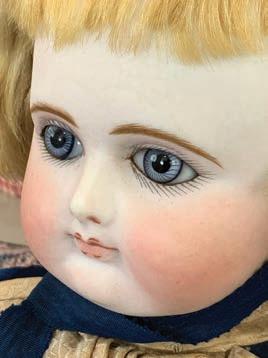
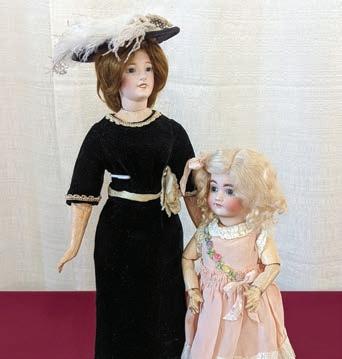
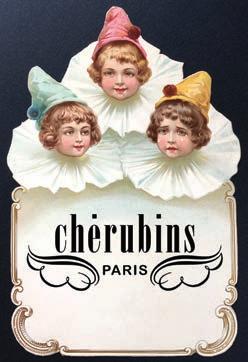
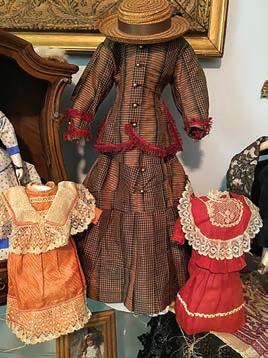
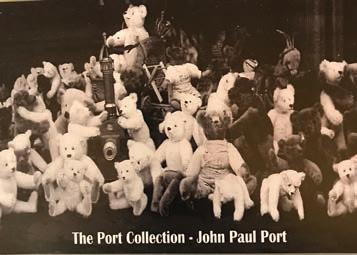
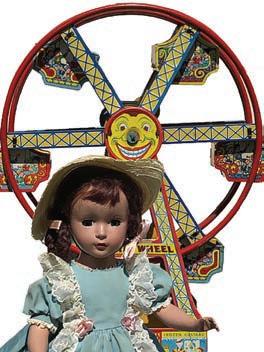
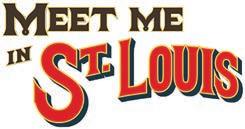
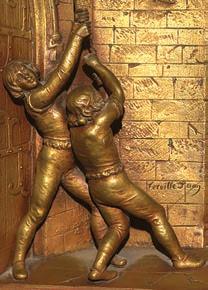

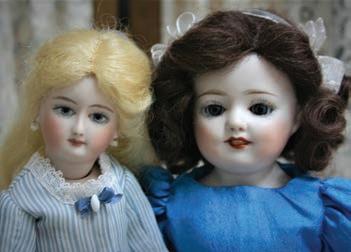
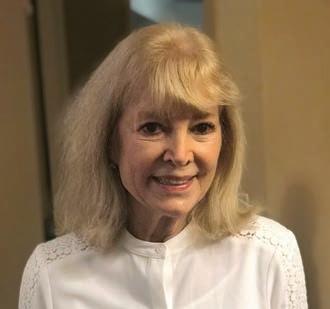
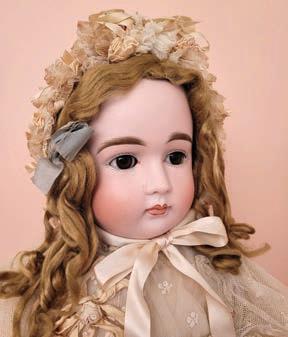
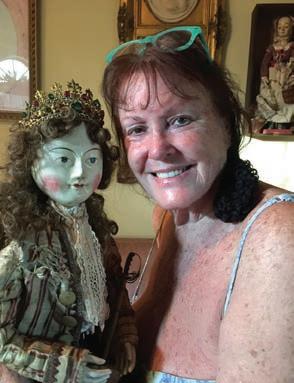
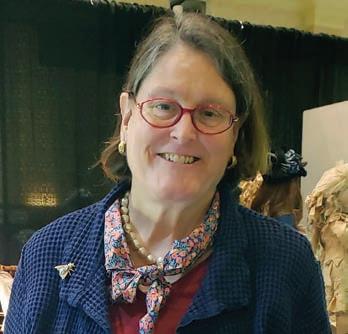
Friday, July 1, 2022
50 Forward: Madame Alexander, More Dolls from the Judith Merrill Collection in Annapolis, MD Monday, August 1, 2022
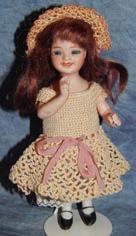
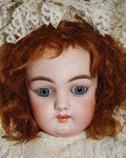

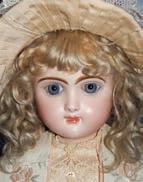
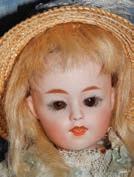

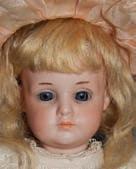
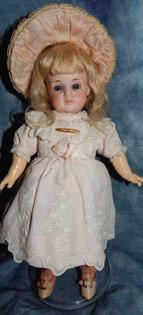
Marquis: Antique Doll Auction at the Marriott St. Louis Grand Hotel, St Louis, MO Saturday, October 15, 2022
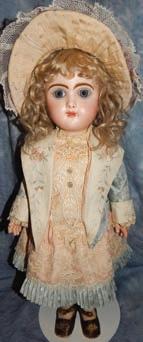
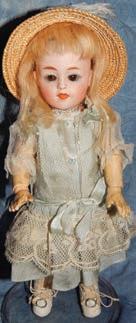

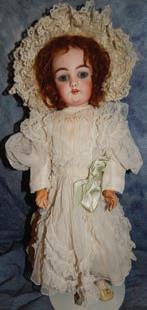
Marquis: Japanese Dolls from the Ayervais Collection 410.224.3655 | info@theriaults.com www.theriaults.com
Wednesday-Thursday, July 1-2, 2022
Summer Auction
Friday-Saturday, September 23-24, 2022
Autumn Auction Friday-Saturday, November 25-26, 2022 Winter Auction 0049 (0) 6203 13014 | mail@spielzeugauktion.de www.spielzeugauktion.de
Tuesday, July 19, 2022
Dolls & Teddy Bears Auction Newbury, UK +44 (0) 1635 580 595 | mail@specialauctionservices.com www.specialauctionservices.com

Tuesday, July 26, 2022 at 8PM

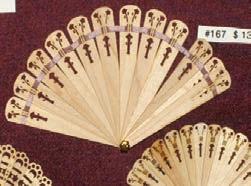


ONLINE ONLY AUCTION
Steiff: Antique, Vintage, Artist Bears and Others 501 Fairgrounds Road, Hatfield, PA 19440 215.393.3000 | www.alderferauction.com
Saturday, September 3, 2022
Dolls at Auction
Preview: 7:30 am; Auction: 10 am 700 Highland Drive, Westampton, NJ 410.275.2213 | sweetbriar@live.com www.sweetbriarauctions.com catalog available on website
October 2022
Carol Corson Collection Live Auction
DoubleTree by Hilton, 2 Somerset Pkwy, Nashua, NH Hotel RSVP: 603-886-1200 (ask for the doll rate) 603.478.3232 | withington@conknet.com www.withingtonauction.com
Manufacturers of Fine Doll Jewelry, Brass Accessories, Miniature Trunks & Hardware
336 Candlewood Lake Road, Brookfield, CT 06804
Phone 203-775-4717 Email: info@catspawonline.com
Visit our website and shop online: www.catspawonline.com Catalog price is $8.95 post paid
Accessorize Your Dolls! Cats Paw has been in business since 1982 specializing in quality reproductions made from antique originals, and unique old store stock. Our antique reproductions are made by hand using the lost wax technique, and each item is hand finished to achieve an authentic “antique” look. We offer exquisite doll accessories that only look expensive!
• Jewelry • Trunks • Items for the Boudoir
• Buttons and Clasps • Purse Frames • Presentation Boxes • Bleuette Accessories & More


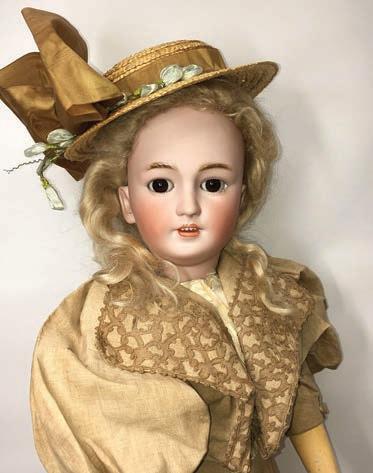
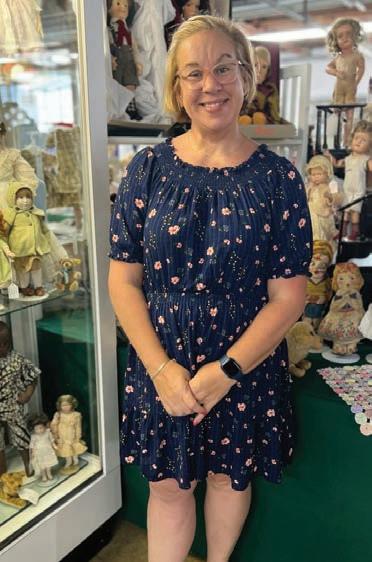
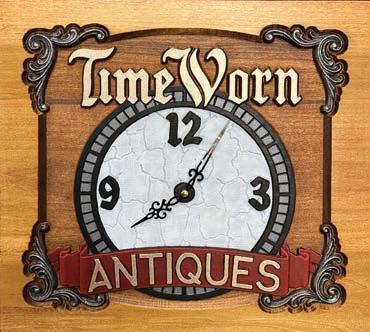
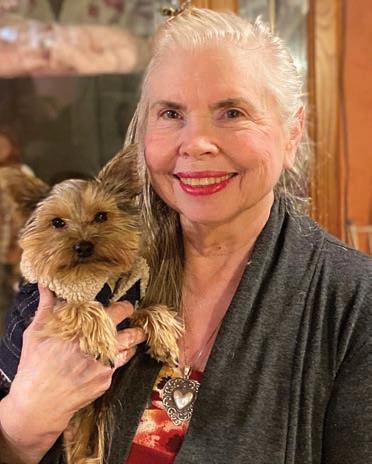


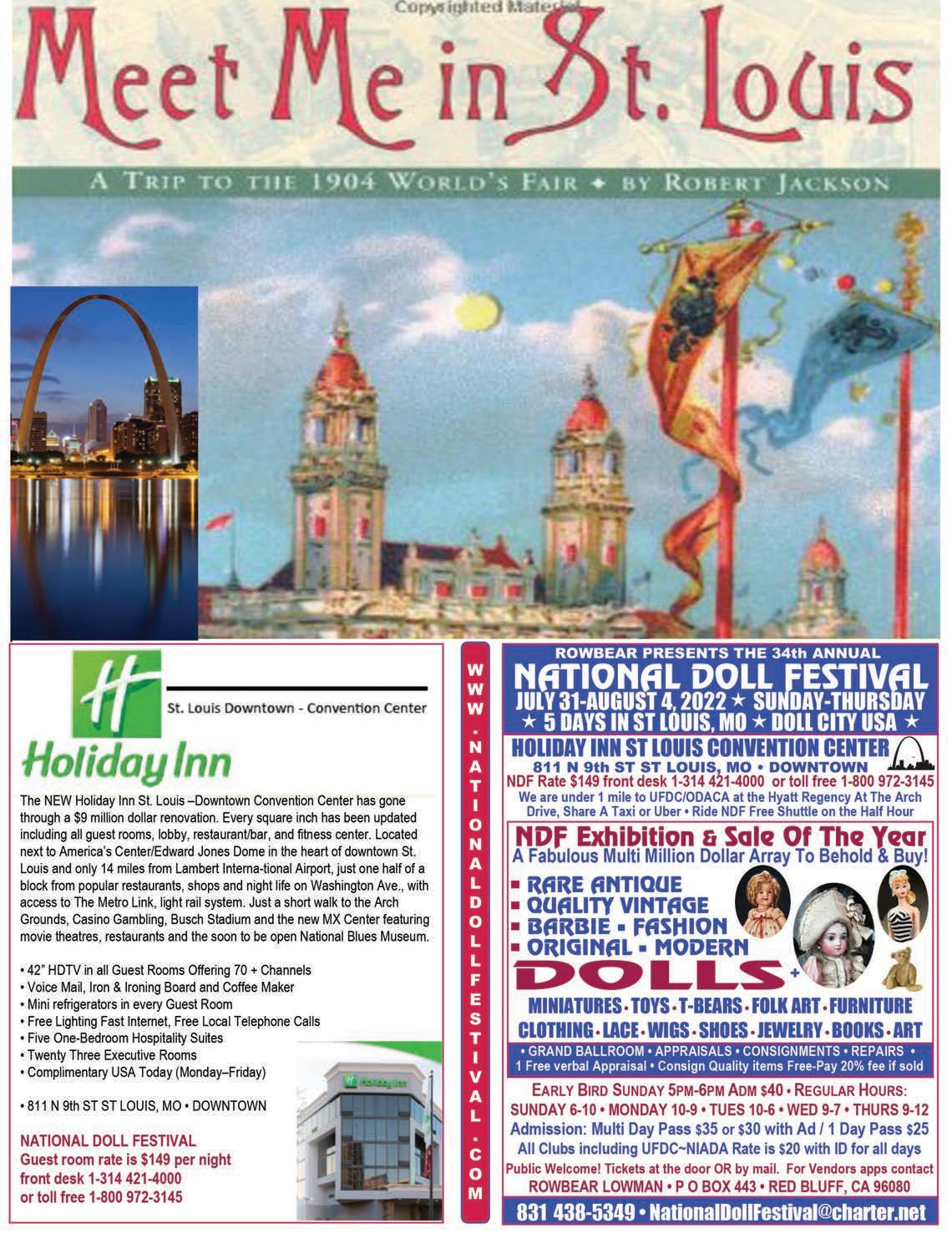
Inspired by the real-life heroism of Theodore Roosevelt, the Albert Schoenhut Company issued the set, “Teddy’s Adventures in Africa,” on Christmas Day in 1909. The former president had not yet returned from his well-publicized safari, but Schoenhut was quick to capitalize on this important media event.
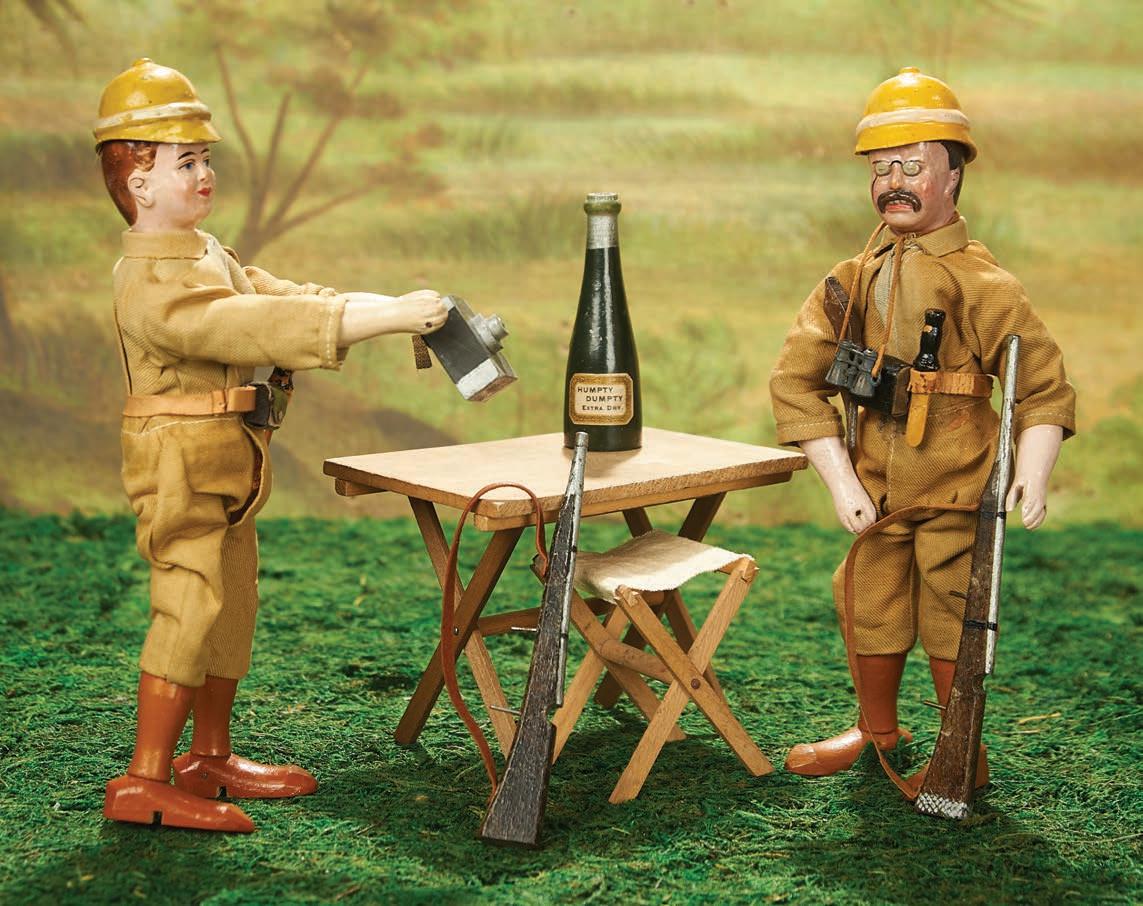
It was shortly after William Taft’s election to the presidency (Roosevelt declined to run again) that Teddy, an avid outdoorsman, took his small army of 260 porters, guides, naturalists and taxidermists and set out from Mombasa, in what was then British East Africa, to the Kapiti plains. The trek began on April 21, 1909 and was much heralded in newspapers across the United States. Several toys were made that capitalized on the famous hunting trip, but none stimulated a child’s imagination and offered possibilities for creative playtime more than the Schoenhut Safari.

On Christmas Day 1909, some very lucky children received a Schoenhut safari, available in four different size sets. The company used some of the animals featured in their enormously successful “Humpty Dumpty Circus” and added several animals seen on the safari – the gazelle, zebra, zebu, giraffe, rhino, hyena and hippo are examples. Artistic license was used as other animals were included that in truth were not seen, such as the gorilla and the deer.

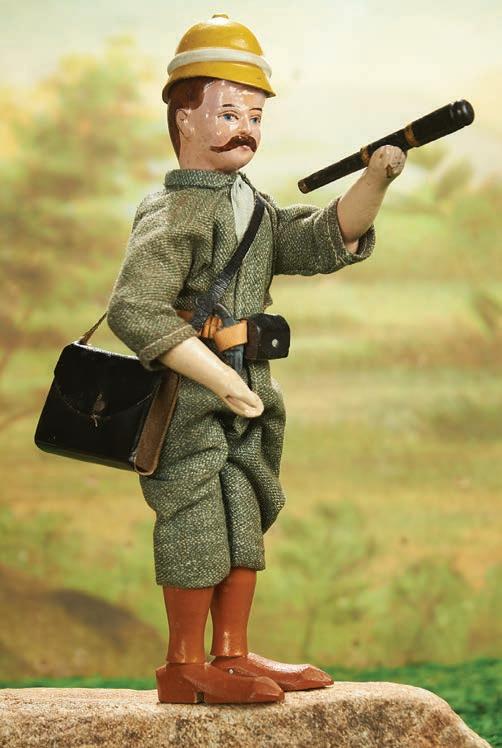
Schoenhut modeled the key members of the safari on actual likenesses. There is Teddy; his son Kermit, the photographer; the hunter and great guide, R. J. Cunninghame; taxidermist, Edmund Heller; doctor, Edgar Mearns; naturalist, J. Loring and adjutant guide Leslie Tarlton. The natives represented in the safari are a representation of the different tribes employed on the caravan including the Masai, the Wakamba and the Swakile. It was felt that using porters from various tribes would lessen the chances of mutiny. Schoenhut’s human safari figures are described as Style I, meaning their heads are a two-part construction (you can actually see a seam joining the front and back of the head). Faces were cast of a plaster-type material, affixed

to the wood head, and then hand-painted. The wooden bodies, arms and legs were turned on a lathe and assembled with elastic. Natives were jointed at the shoulders, hips and neck while the white personnel had additional jointing at the elbows and knees enabling them to be realistically posed.
The animals sold in the safari were all glass-eyed; the painted eye style was not used until 1918. There is one notable exception however and that is the gorilla which was only offered in the painted eye style. Unlike the other safari animals whose heads were mostly hand-carved, the gorilla’s face was cast in plaster. The animals are also jointed, some with ball-jointed necks, and they often have leather ears and horns. Because so much of the work was done by hand, collectors search for those nuances in carving and painting that give each piece character.
The personnel is equipped with various accessories, some especially suited for their occupation such as Kermit’s camera and the naturalist’s telescope. When complete, they all wear a cartridge belt and may carry a pistol, rifle and dagger. The Arab Chief and Native Chief were also produced with a cartridge belt and the Arab Chief carries an Arabian-style rifle. The natives carry a spear and one, referred to as the drummer, has holes drilled into his hand to accommodate drum sticks. He wears a burnoose and a drum around his neck.
The rarest character in the safari and one very seldom seen is the Arab Chief who was offered in the two largest sets. The body construction is the same as the clowns in the Humpty Dumpty Circus, but naturally, his painting is very different and he wears a felt beard, a flowing red robe and burnoose. Another interesting character is the Native Chief, sometimes confused with the circus “Dude”, although when familiar with these toys they are very easy to tell apart. Only two examples of another high-ranking “Arab” have been seen, which some people call the “Pasha.” He
may have been an experimental figure or perhaps a special order. Naturally, rarity, originality, condition, and completeness are the key to value. In the last few years, prices for the safari pieces at auctions have escalated dramatically.

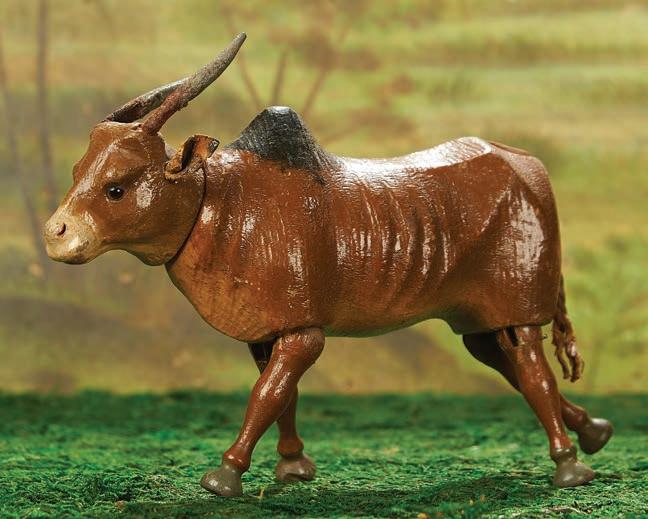
After a long hard trek, making camp required tents, straw huts, tables, chairs, bales and boxes for provisions, bowls and jugs for cooking, all items that the Schoenhut Company thoughtfully provided in their sets. Though seemingly inconsequential, original safari props command serious prices.
The larger sets included a beautiful backdrop simulating what was seen along with various points of the safari. Mt. Kenia is visible, along with lush vegetation, water, and grasslands. Two different scenes were used, one screened on cloth and the other on paper and mounted on card stock. When a few figures, animals, and props are placed against the five-foot backdrop the result is amazing. One could say the whole is more than the sum of its parts – these individual toys become an exciting safari scene that captivates adults as much as it did children more than a hundred years ago.
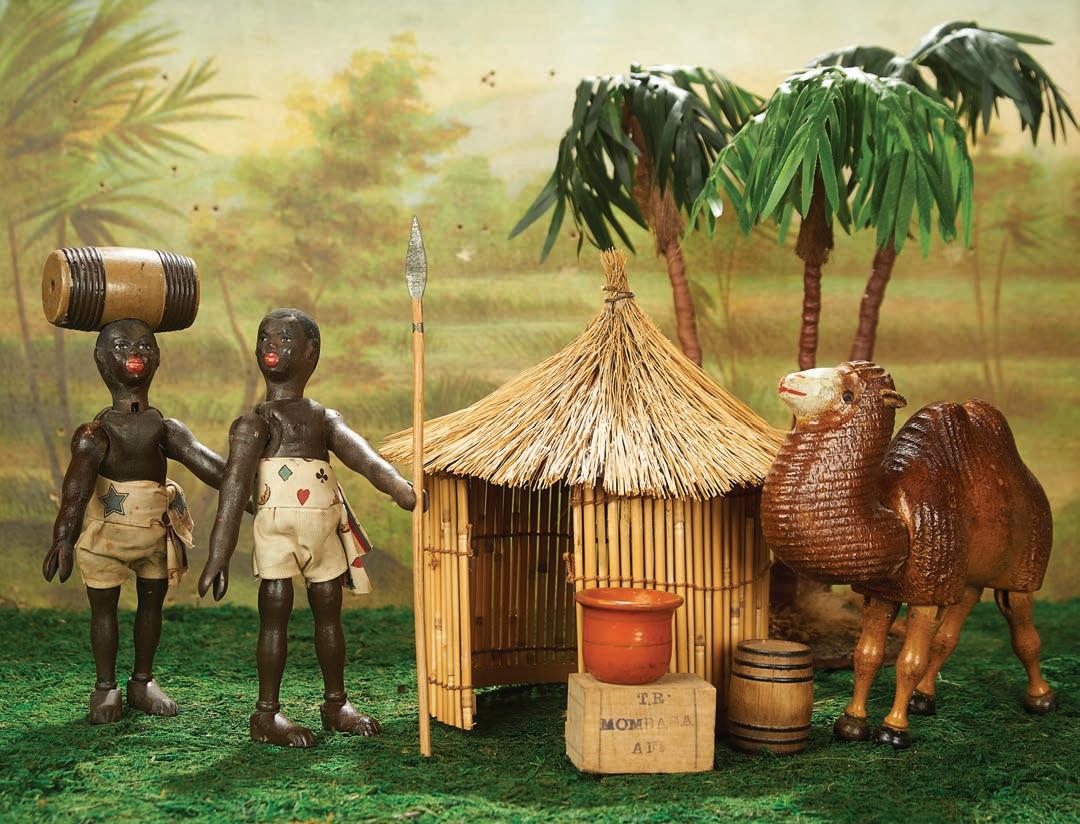
Four different sets were offered: a 17-piece set retailing at $6, a 21-piece set for $9.50, a 25-piece set for $13 and a 53-piece set for $30. (Please note: the accessories were counted as pieces.) The personnel and animals were also sold separately. It is highly unusual to find even a small set intact as over the years they were broken up, but it is highly rewarding, albeit challenging to assemble a full complement of safari figures and props.
The Schoenhut Safari is a great example of creative toy manufacturing at the turn of the 20th century. Steeped in historical fact, today it is considered a treasure of Americana. Offered for only a few short years, its production may have ended as early as 1912.
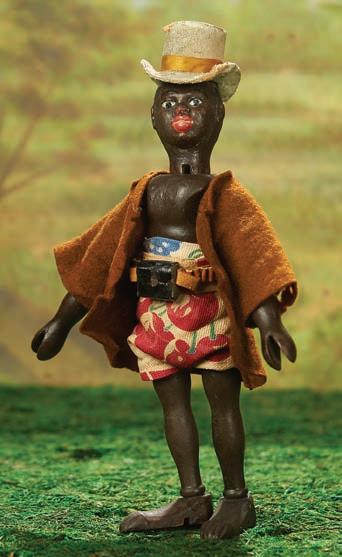

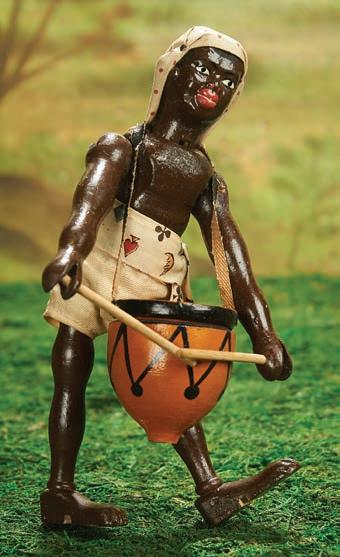
This collection will be going on sale at Theriault’s August 1st Auction.
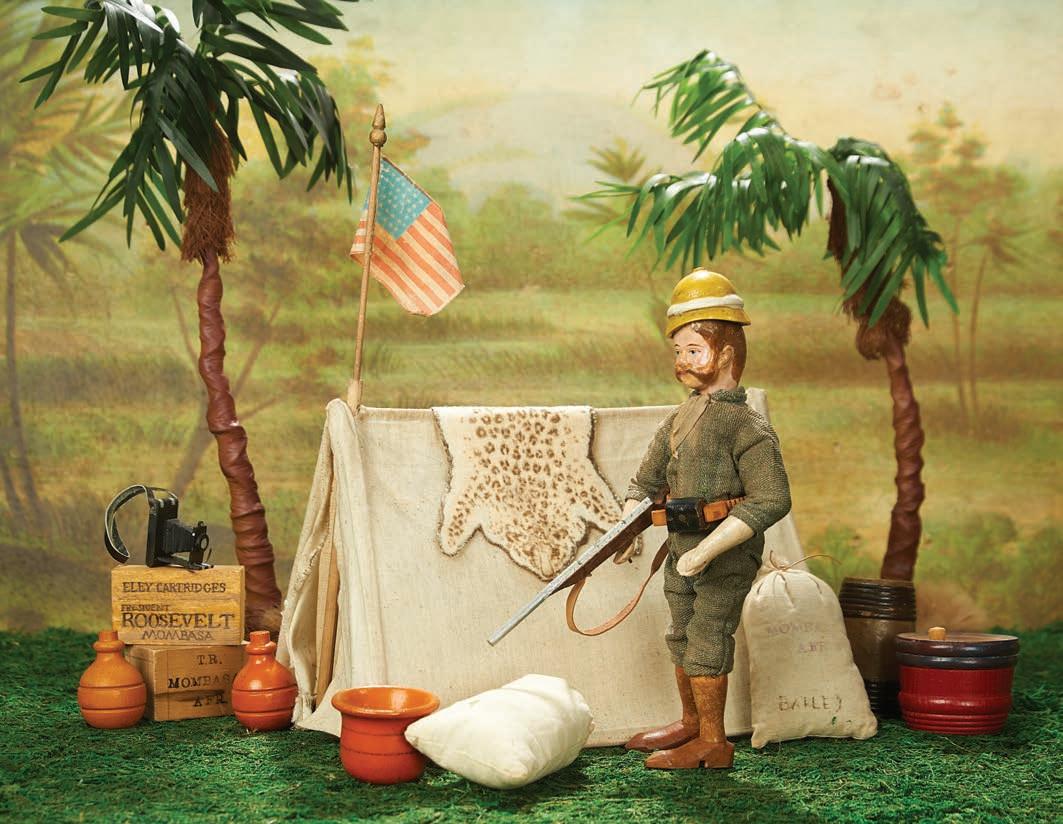

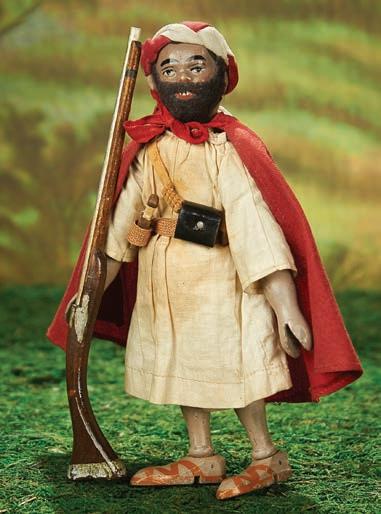
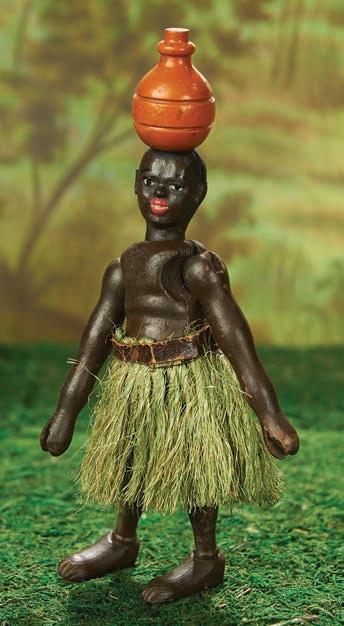
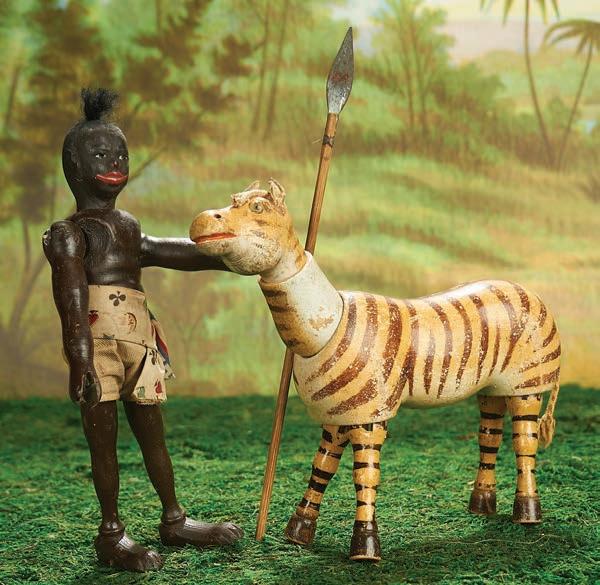
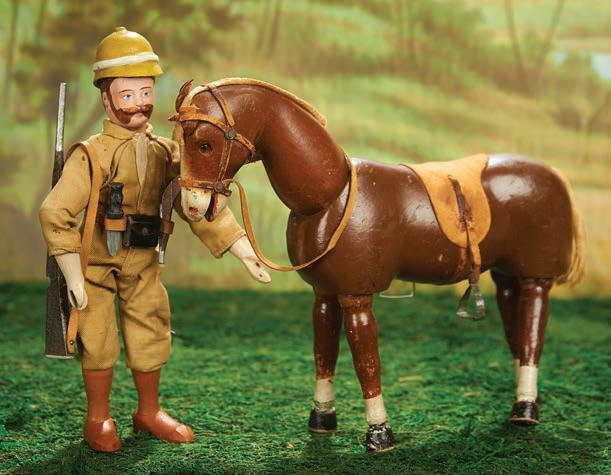

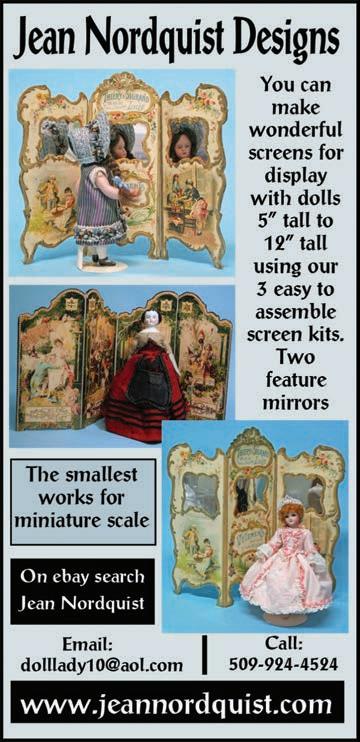

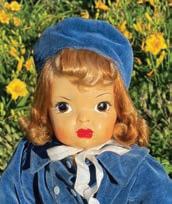
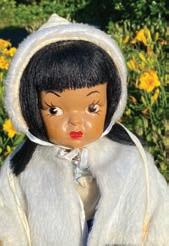
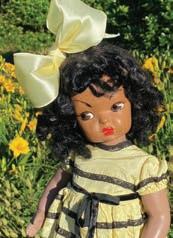

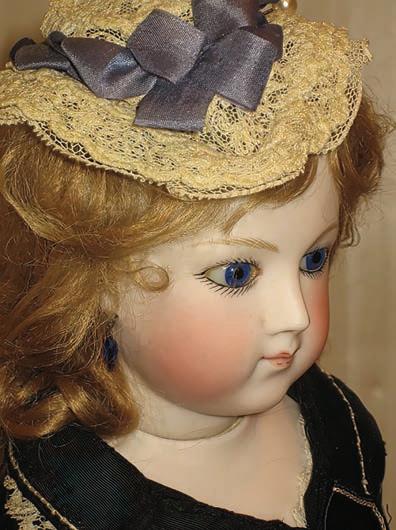
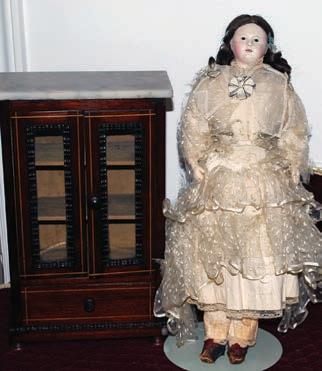
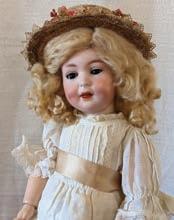
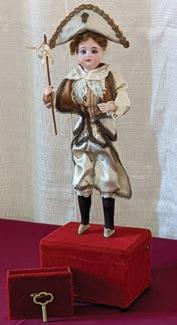
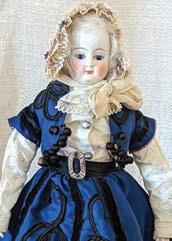
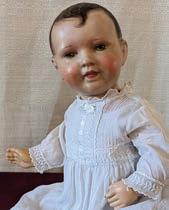

n the first and second quarters of the 20th century the hobby of doll collecting began to blossom and develop due to the efforts of the early doll world researchers, doll makers and doll restorationists who laid the tracks upon which the doll world still moves. One of these pioneers was a woman named Emma Clear and her contributions to the furtherance of our hobby live on not only in the spirit of sharing within the doll community but also in the beautiful dolls created by the business she operated.
Born in St Louis in the last quarter of the 19th century (April 14, 1879) Emma, like so many born before and after her, was a doll lover right from the start. She had life-long fondness for the beauty and elegance of the dolls and fashions of her youth and would be motivated by this sense of nostalgia in all her endeavors. In her teen years, living in Buffalo, New York, she often repaired dolls for the neighborhood children, and she joined a club which made dolls for the patients at the local children’s hospital. She would go on to study commercial law, sculpture and writing before marrying and having a child.
Emma was a woman who knew her own mind and who always kept trying to move forward in life and business. In 1908 she opened a doll hospital and shop, enlisting her sister Jesse as a partner. Divorced at that time, Emma needed to support herself and her young
Emma Clear’s love for the beauty and elegance of the 19th century was reflected in the many dolls created in her workshop. Although her dolls were century dolls, she referred to her dolls a “Replica” dolls rather than calling them reproductions. This model was called Mary Augusta.
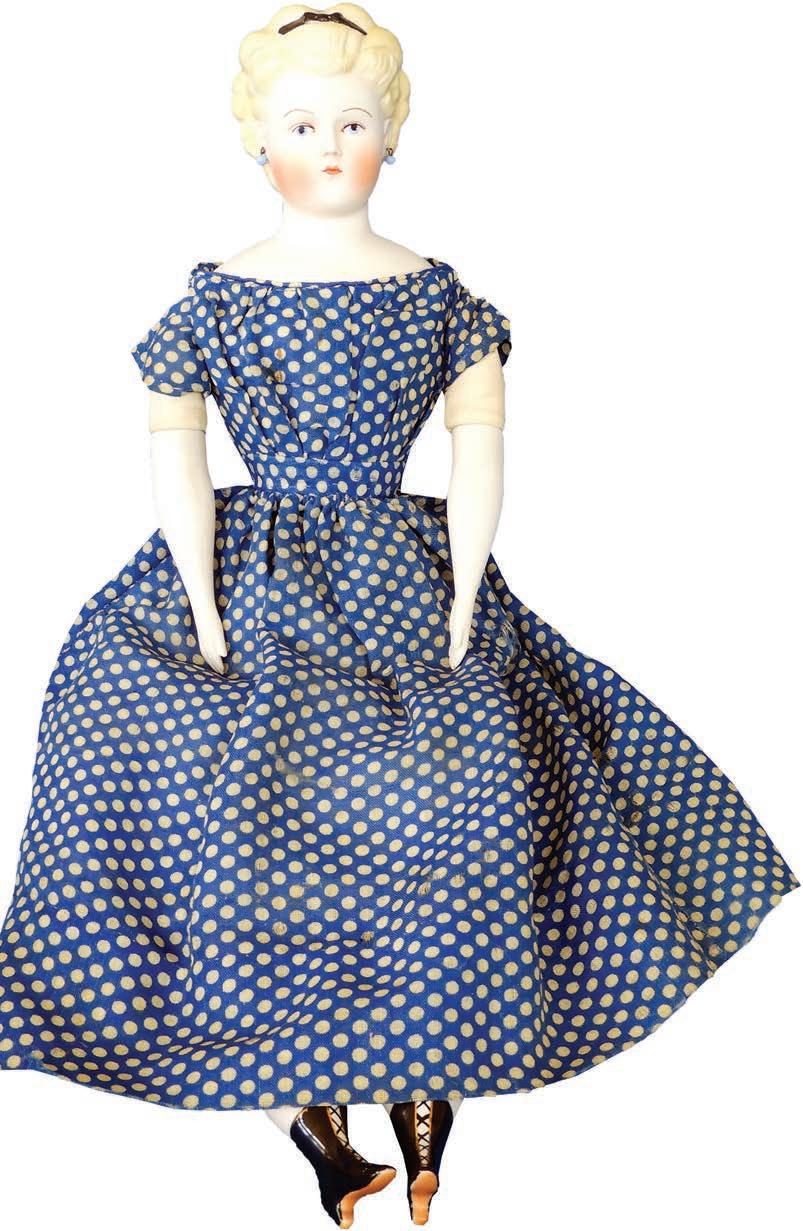
son, Christie. The sister’s shop sold numerous types of dolls in their store including Schoenhut dolls about which Emma would later say “I would class them as the best play dolls ever brought out.”

In 1914 Emma left the doll business in NY in her sister’s hands and moved to Cleveland, Ohio where she became a partner in The Cleveland Doll Hospital. The Cleveland hospital did wholesale repair work for other doll hospitals across the country. Emma would later note that with the doll shortages of WWI she felt that more doll repairs were done during that time than ever before or after.
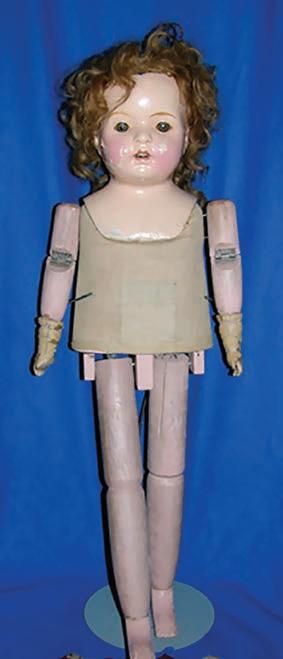
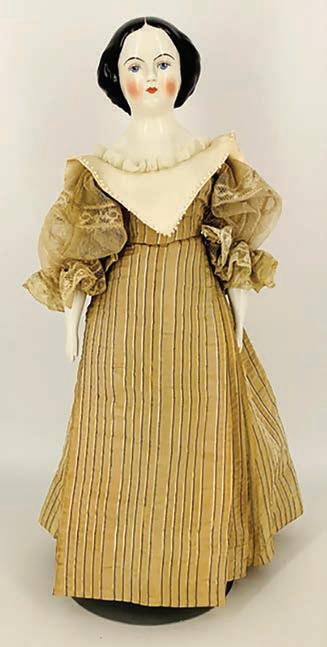

In 1917 Emma moved to Los Angeles, California. Once settled in LA she opened a doll hospital and shop on Hill St. and later moved it into the Mercantile Building on Broadway. It was in California that she met and married Wallace Clear. It was also during this time that Clear met and began a business association with Harry Coleman. Mr. Coleman had invented a doll called Dolly Walker and often came in to purchase parts for the dolls from Emma’s shop.
Coleman demonstrated the dolls during his ventriloquist shows and eventually in the store window at Emma’s doll hospital. Clear was reluctant to carry the dolls at first as they were not the typically beautiful dolls that she admired but eventually Harry convinced her to sell his dolls through her shop. When demonstrated by Coleman the dolls became good sellers and in 1922 Emma paid him $1000 for the patent rights to Dolly Walker. The idea was that Mr. Coleman would then demonstrate the dolls and sell them for Clear on commission. Unfortunately, Mr. Coleman died suddenly and Clear never did much with the dolls afterward. In later years Emma referred to the Coleman
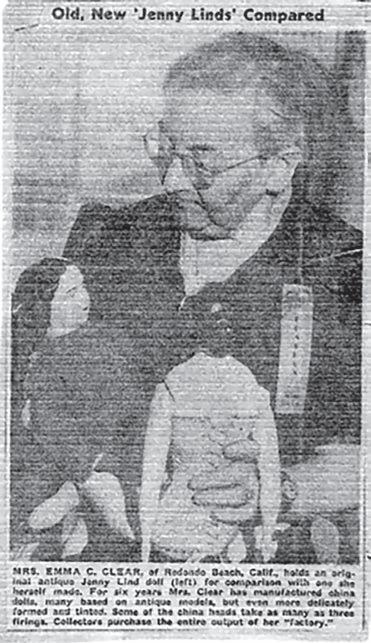 Harry Coleman received the patent for his Dolly Walker doll on November 8, 1921. Unfortunately for Emma Clear this doll did not sell well once Mr. Coleman was no longer around to demonstrate his invention to the public.
Clear’s first replica doll was her Jenny Lind model which could be had with black or blonde hair (photo courtesy of Apple Tree Auction Center). A newspaper clipping from the 1940s shows Emma comparing her Jenny Lind with an antique German-made example.
Harry Coleman received the patent for his Dolly Walker doll on November 8, 1921. Unfortunately for Emma Clear this doll did not sell well once Mr. Coleman was no longer around to demonstrate his invention to the public.
Clear’s first replica doll was her Jenny Lind model which could be had with black or blonde hair (photo courtesy of Apple Tree Auction Center). A newspaper clipping from the 1940s shows Emma comparing her Jenny Lind with an antique German-made example.
doll as “another dead horse for which I had paid a thousand dollars.”
In the early 1920s the Mercantile building was sold. When faced with a huge increase in her rent Emma decided instead to move the business into her home in Redondo Beach. In 1928 she closed the doll hospital completely and she and Wallace opened a chicken ranch. In 1929 the chicken ranch became a casualty of the Great Depression and closed leaving the Clears in need of financial assistance. Shortly afterward Emma became very ill. During her convalescence her active mind was seeking a new path forward. Thinking about the stock of dolls, parts and supplies she had in storage she decided to open a new doll shop and hospital which she called the Humpty Dumpty Doll Hospital.
Chicken coops were converted to workspace, droppings boards were cleaned up and made into signs, old party dresses became doll dresses. A few antique dolls were traded to the local newspaper owner for ad space. Three days after the signs went

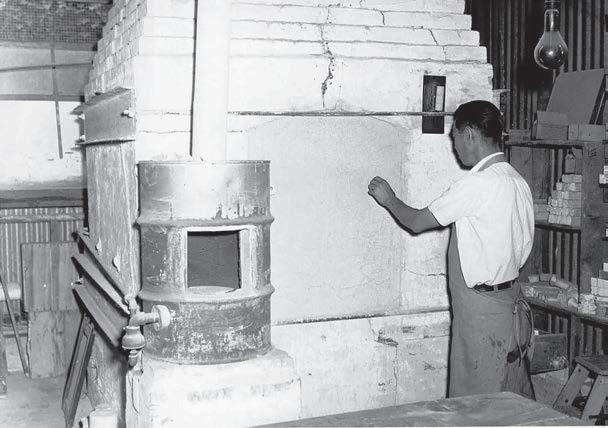
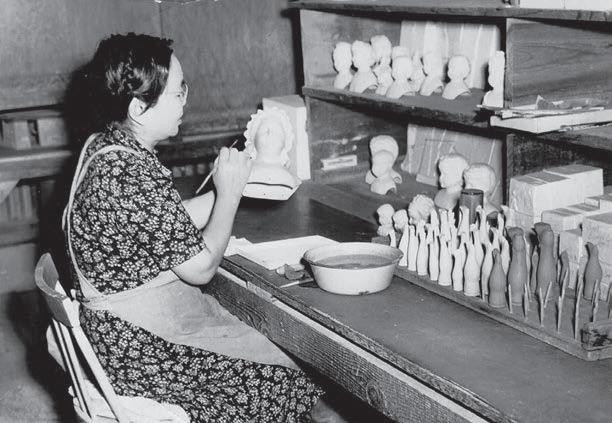
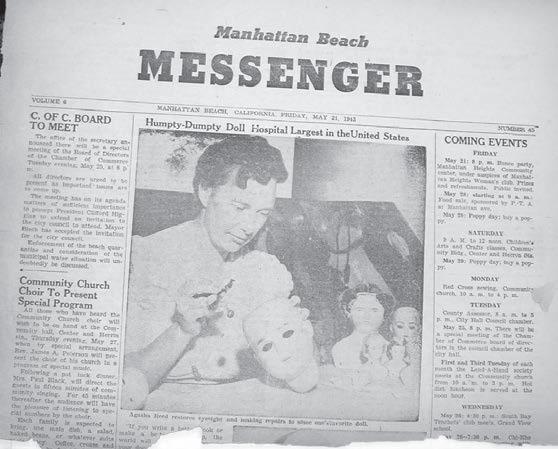
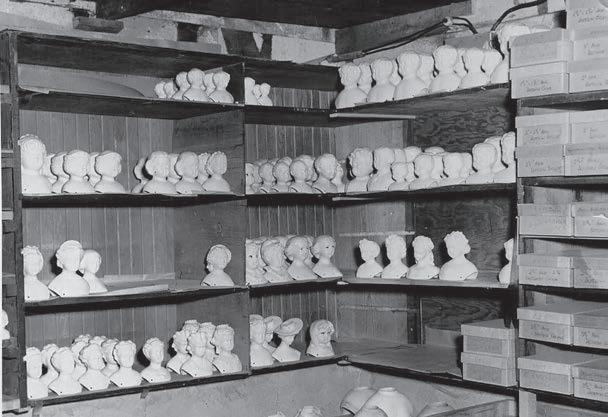
up the first out of state collector stopped in and word began to spread among the growing community of doll collectors.
Emma’s years of experience in studying and repairing old dolls paid off in this new venture. She gathered a workshop of highly skilled specialist artisans and under her direction they became one of the most highly regarded doll hospitals in the country, working not only for their own customers but also providing services to other doll hospitals such as the
Mama and Papa Clear assembled a team of specialist workers to handle each area of their business. These photos show some of their workshop and employees.Along with her brochures Clear promoted her dolls with photographic cards of each model which were mailed to prospective customers. On the back of each card was listed the sizes the doll came in, the finishes available and the price for each model. Shown are Toinette and Guinevere.
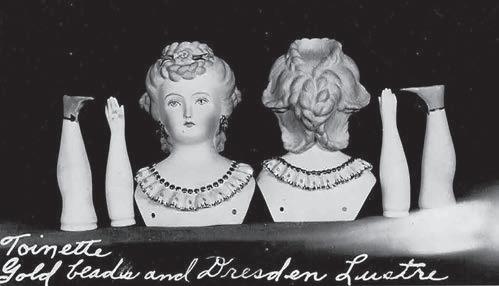

The two types of incised marks used on Clear dolls are shown here. In addition to the incised style of markings many of the dolls also included the cloth tag sewn onto the back torso.
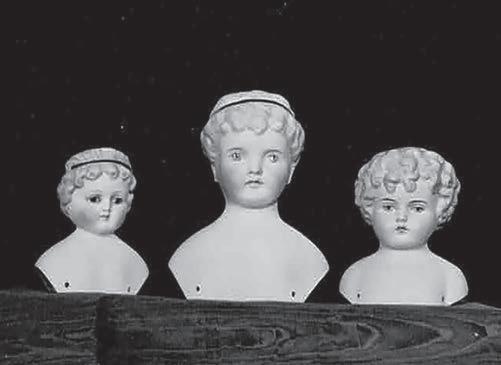
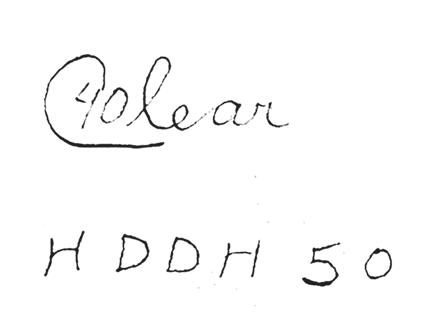
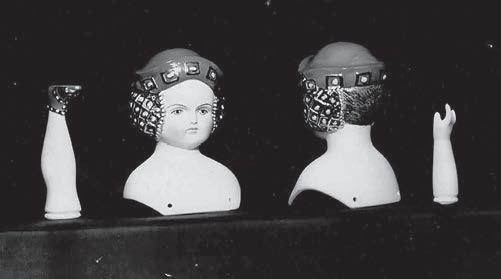
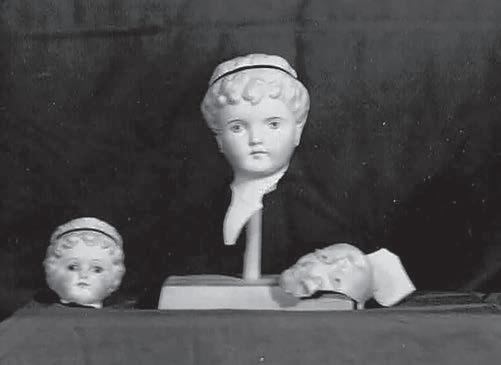
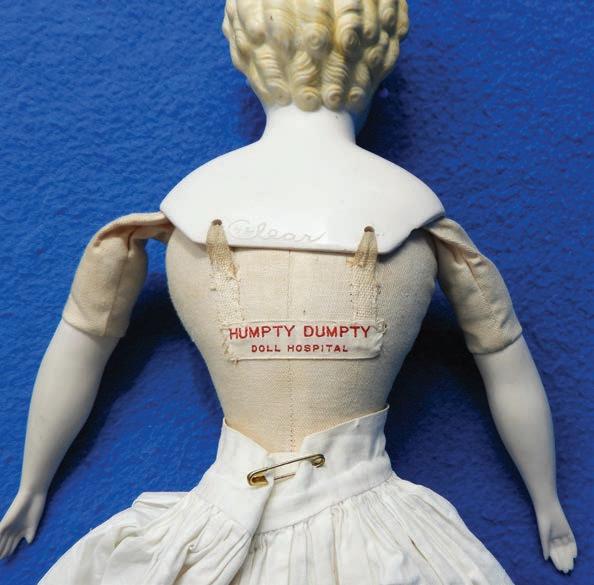
Boston Doll Hospital, and the doll repair departments of Orchard & Wilhelm in Omaha and Marshall Fields in Chicago. Emma began to correspond with other collectors and early doll researchers, a practice she would continue throughout her career.
Clear had experimented with making some reproduction doll parts when during WWI the importation of German dolls and parts had come to a halt. This previous experience led her to begin making reproduction parts once again. All of her knowledge in working with porcelain came from experimentation. Through her failures and successes, she learned about working with various clays, proper firing techniques and how to develop china pigments that mirrored those used by the European doll makers of the previous century.
All of this experimentation finally led to her to making reproductions of antique dolls. In her
The Humpty Dumpty doll hospital provided repair work to collectors throughout the United States. Before Restoration After Restoration
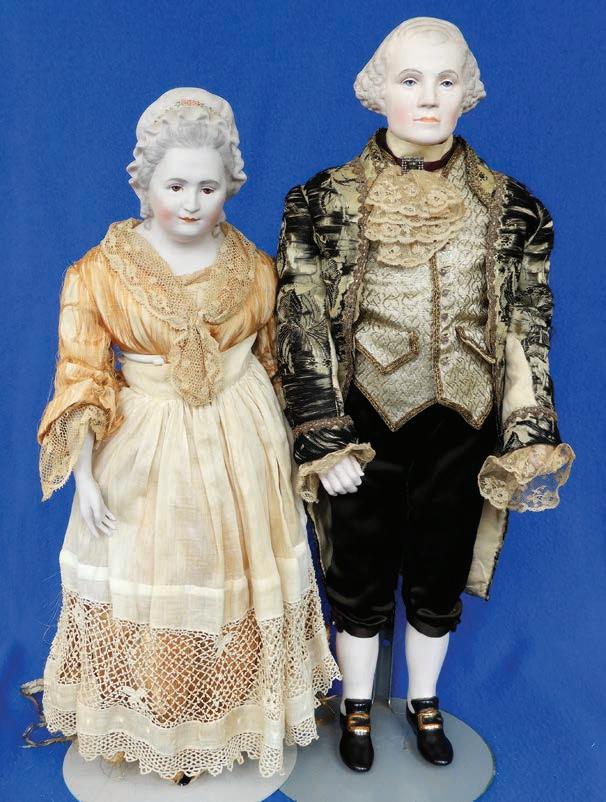
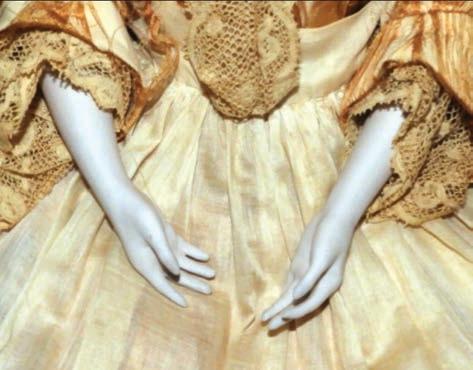
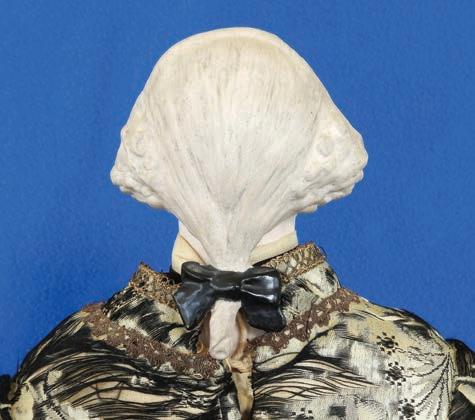
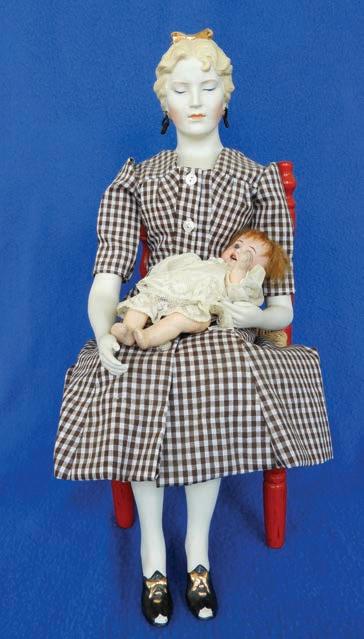
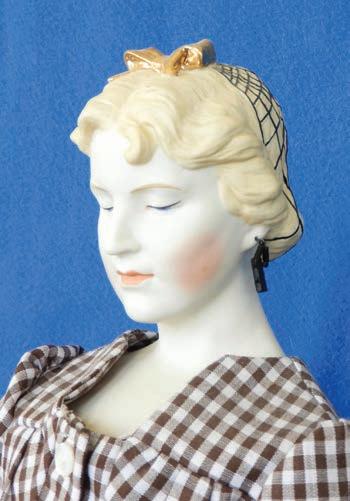
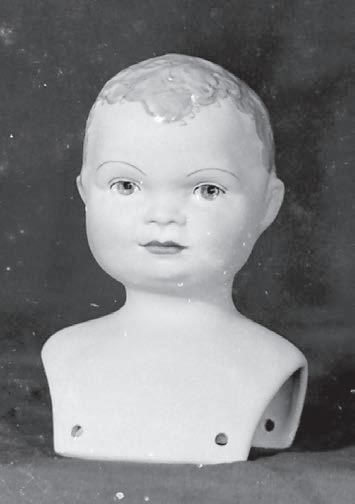 Martha Oathout Ayers sculped the Washingtons based on the historic painting by John Ward Dunmore. The dolls have superbly modeled details such as Martha’s delicate hands and George’s free-hanging queue hairstyle, both of which were complicated molds to produce.
Martha Oathout Ayers sculped the Washingtons based on the historic painting by John Ward Dunmore. The dolls have superbly modeled details such as Martha’s delicate hands and George’s free-hanging queue hairstyle, both of which were complicated molds to produce.
Clear named each of her replica dolls and used those names in her advertising for them. This doll was called Elsa.
correspondence with Janet Johl, she states “We have the china down pat now and can get any shade and texture from the purest parian to the lustres and white chinas. I held my breath over the first firing of the heads.” Clear’s first replica doll was the model she called Jenny Lind which she referred to as “first American made China Doll.”
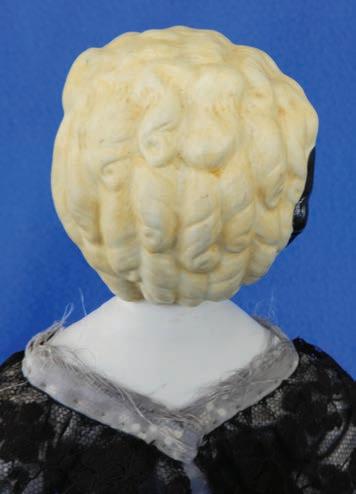

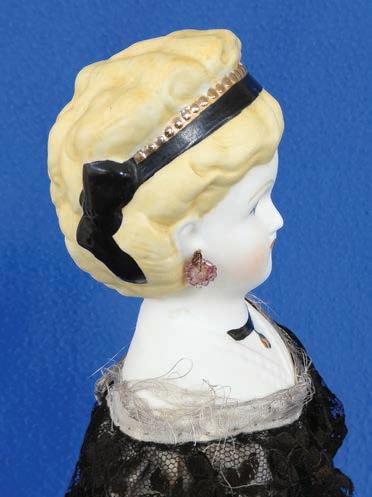
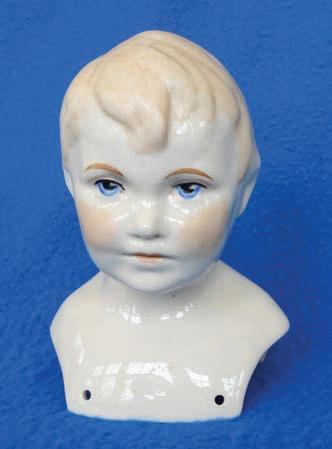
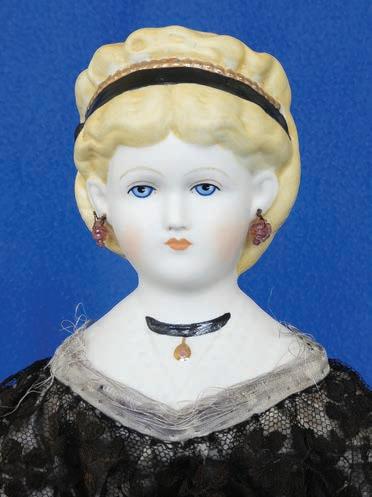
By the early 1940s the Clear’s, now called “Mama and Papa Clear” by their employees, were offering a many different models of dolls to an eager collecting public, supported by their growing workshop of porcelain workers, painters and seamstresses. Again, in her correspondence with Janet Johl she proclaimed “Do not give me too much credit. It takes the cooperation
of a mighty fine group of artists to turn these dolls out. I am just a sort of director.” Papa Clear had his part in the business as well, he invented and manufactured any special tools that were needed, including a machine to stuff the sawdust filled bodies, which Emma described as “a real honey.” He also ran the shipping department. The early replica dolls to come from the Humpty Dumpty Doll Hospital were unmarked but soon realizing that uniformed or unscrupulous dealers might try to pass her dolls off as antique she began marking her dolls. The two types of incised marks used by Clear are the name Clear in script, often with the year of manufacture inside the C and the initials HDDH with the year of manufacture.
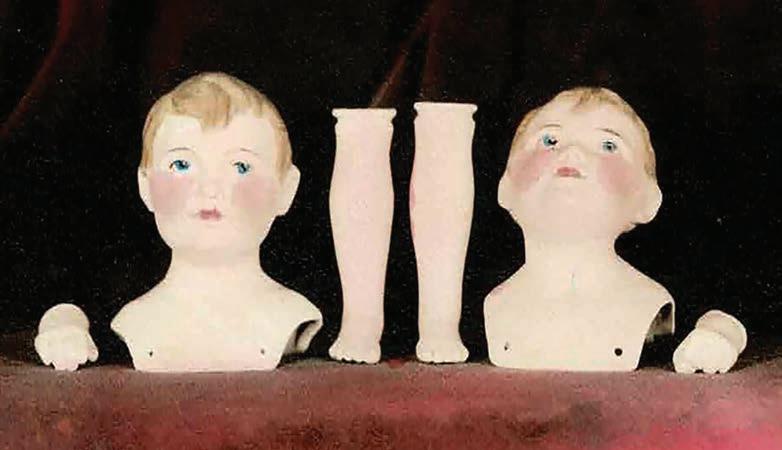 Danny was offered in the two sculpt variations shown on the advertising photo on the right. He could be had with dark or light hair and in Parian or China finishes.
Danny was offered in the two sculpt variations shown on the advertising photo on the right. He could be had with dark or light hair and in Parian or China finishes.
Coronation

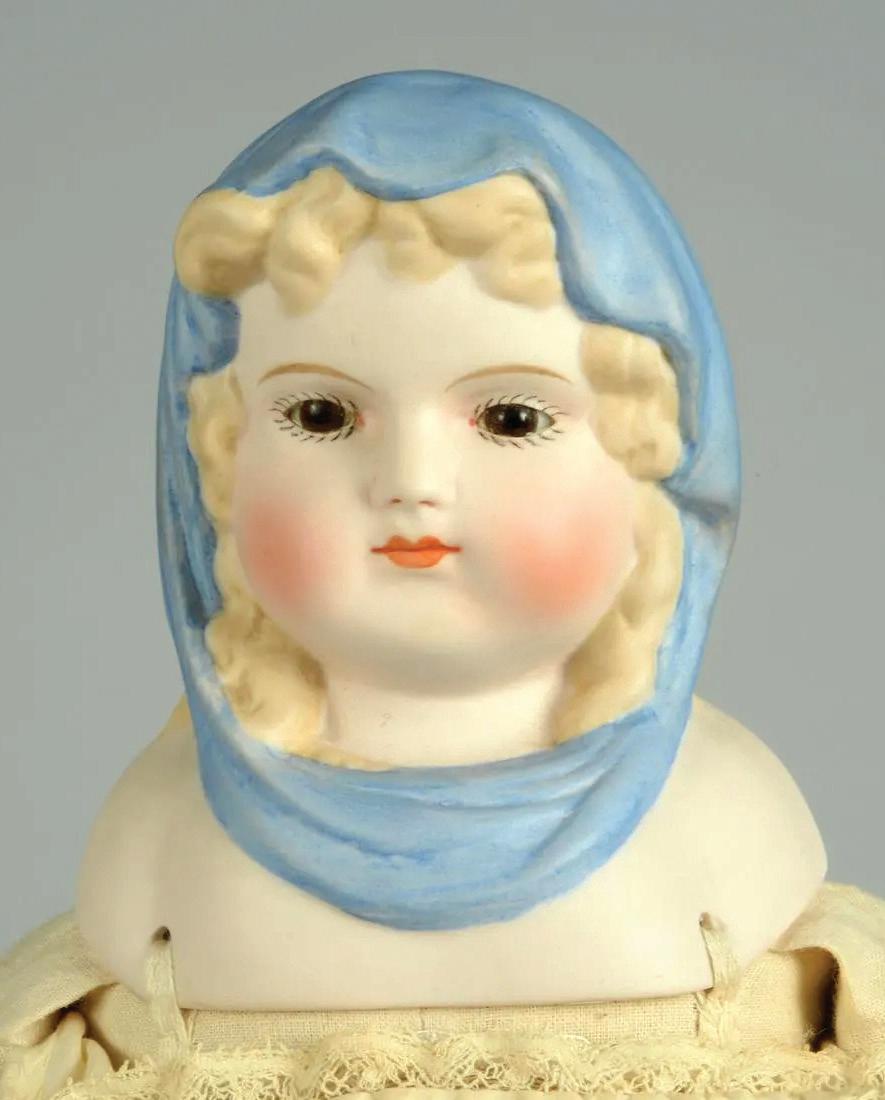
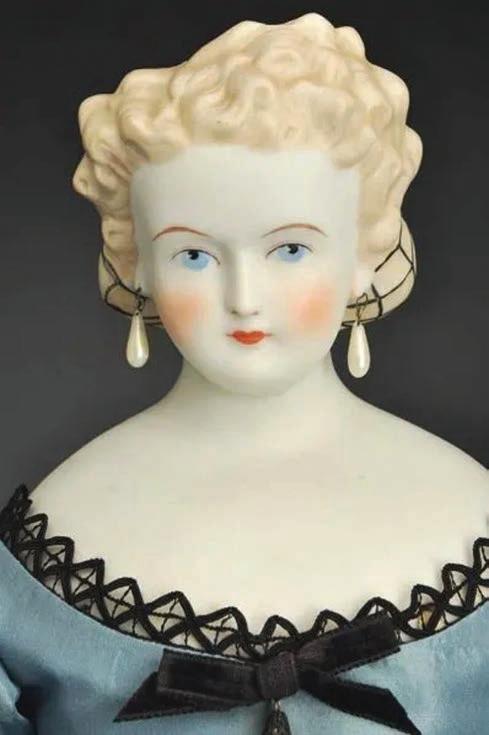
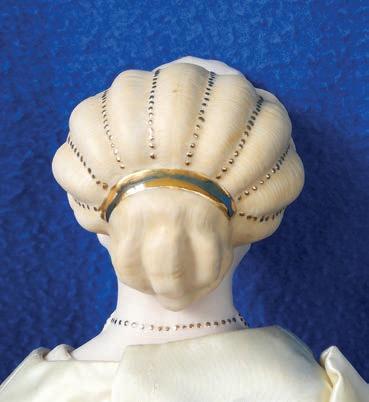
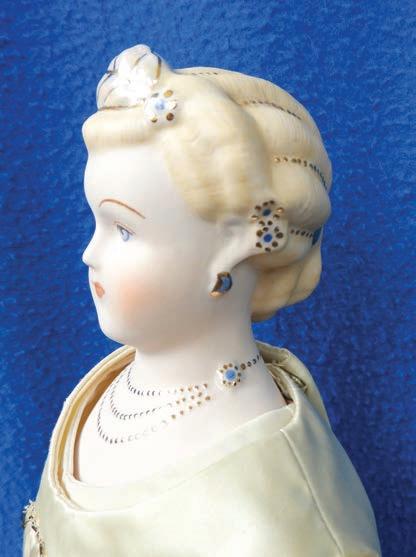
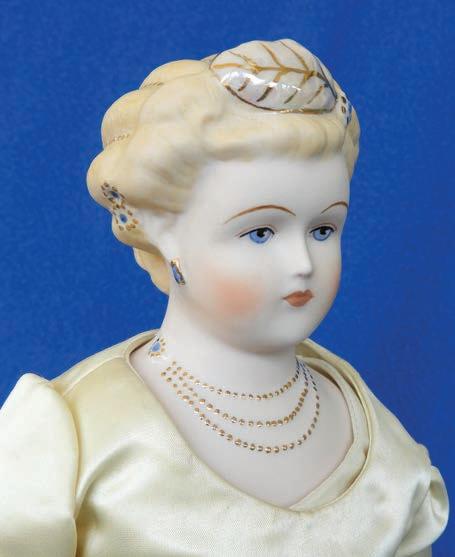 has a feather in her hair, a gold lustre beaded necklace, and molded, painted jewelry.
has a feather in her hair, a gold lustre beaded necklace, and molded, painted jewelry.
Eventually Emma decided she would also like to offer dolls that were not based on antique dolls. To satisfy this dream she called on the talents of well-known American sculptor Martha Oathout Ayers to design a pair of dolls depicting George and Martha Washington. These dolls were offered in three sizes and could be had with glass or painted eyes. After this pair Ayers went on to sculpt three more dolls for Clear. One was a set of two entitled “the Modern Madonna” which depicted a young mother of the 1940s holding her baby (Bill) in her arms. The other was “Danny,” a young boy of the ‘40s who came in two sculpt variations, one with his head molded to look upward at his mother holding the
The original mold for the Gibson Girl included the molded corsage as seen on the doll on the left (photo courtesy of Treasureseeker Auctions). The corsage was eliminated from the later versions of the doll in an effort to help simplify the molding process. The shapely bodies and corsets used on Clear’s dolls make them a joy to costume.

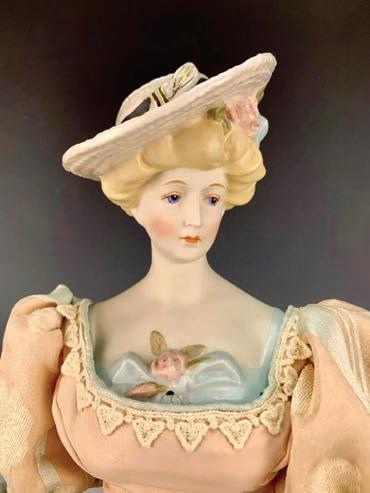
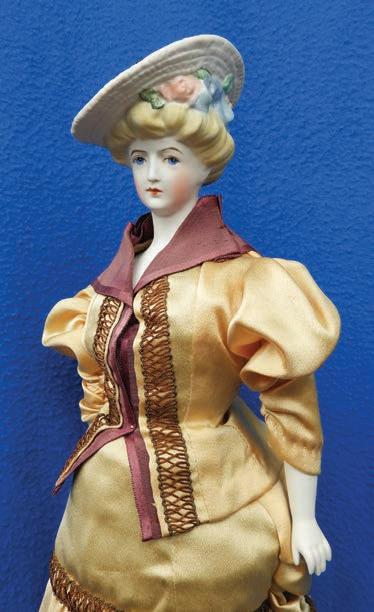
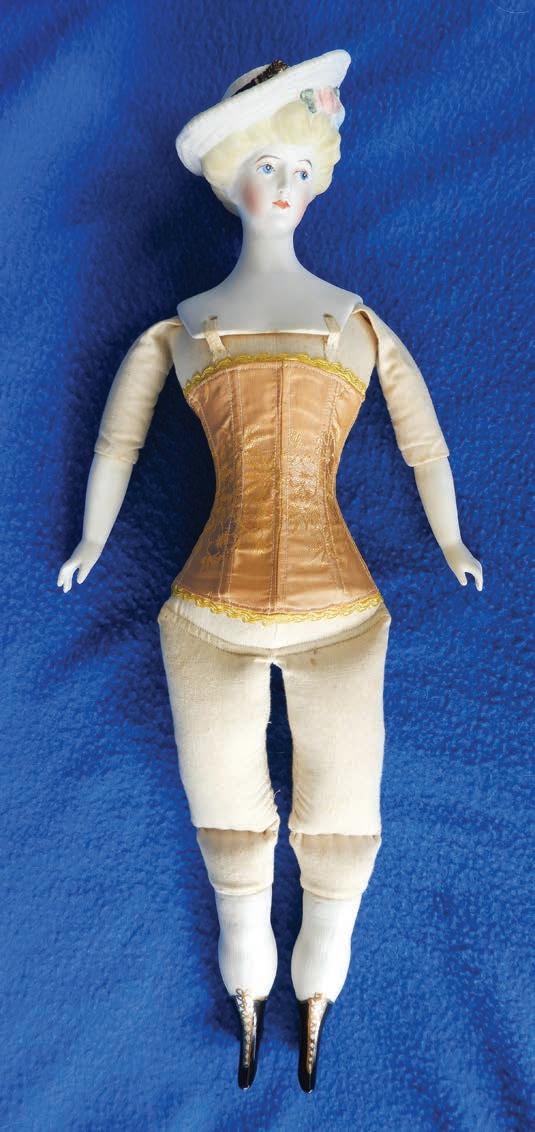
Clear corresponded regularly with her customers and other doll researchers and doll makers. Her personal files also included notated research photos on antique and vintage dolls, as well as her formulas and techniques for all aspects of dollmaking, and a wide range of marketing material for her dolls and doll parts.

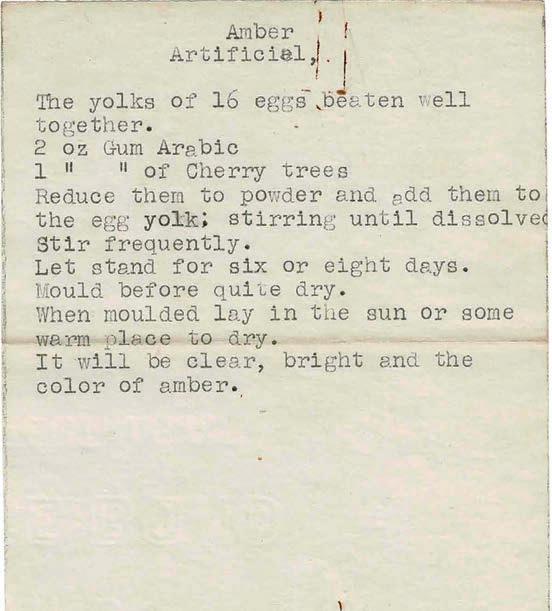
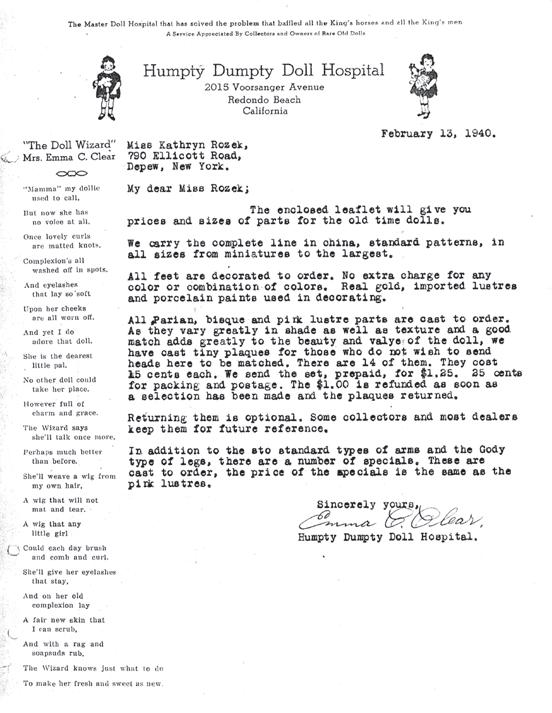
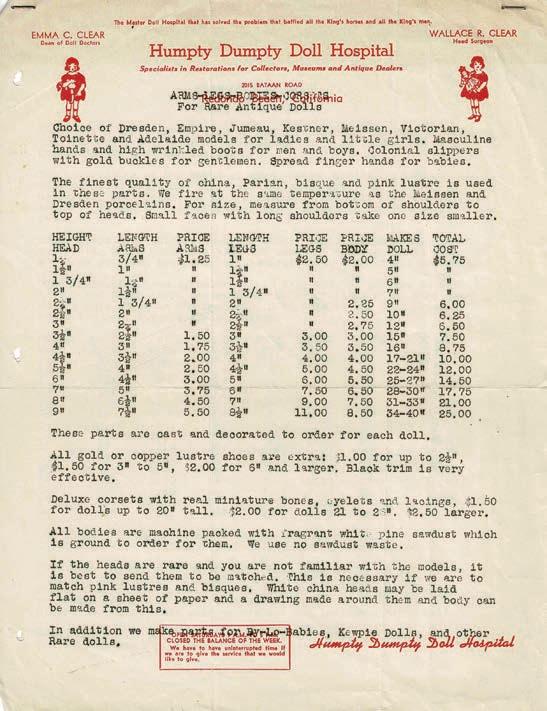

Emma had originally intended to call this doll the Knight of the Round Table but local collectors thought that he looked more like a gambler or bar tender so instead he was called the Barbary Coast Gent. The porcelain pipe that came with him can be seen in the advertising photo.
new baby and another with his head molded looking straight forward. These dolls are a beautiful expression of American family life of the period.
The production of any of Clear’s dolls was limited to the number of dolls that could be made before the molds wore out. The only planned exceptions to this rule were the Jenny Lind doll and the Ayers designs, all of which had permanent porcelain molds made for them. There was also one unplanned exception to this rule which was the Gibson girl. Emma claimed that she would have liked to stop making the Gibson girl when the mold became worn as it was a complicated mold and expensive to produce but collector demand was so strong that a new mold had to be made instead. She related that the collectors of the day loved this doll because “the Gibson Girl represented the perfect lady of their youth, not what we were but what we dreamed of being.”

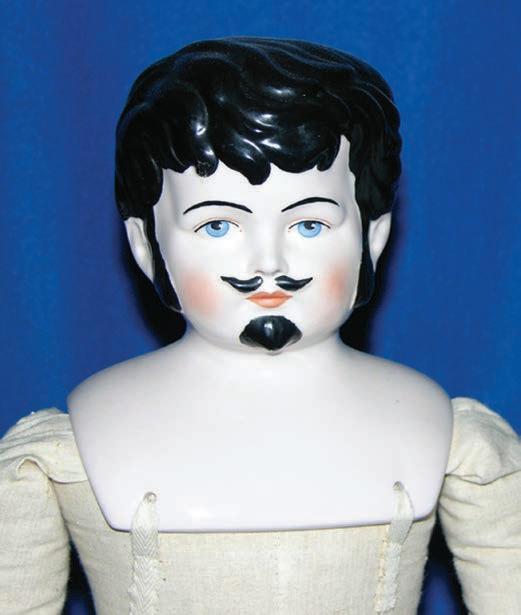
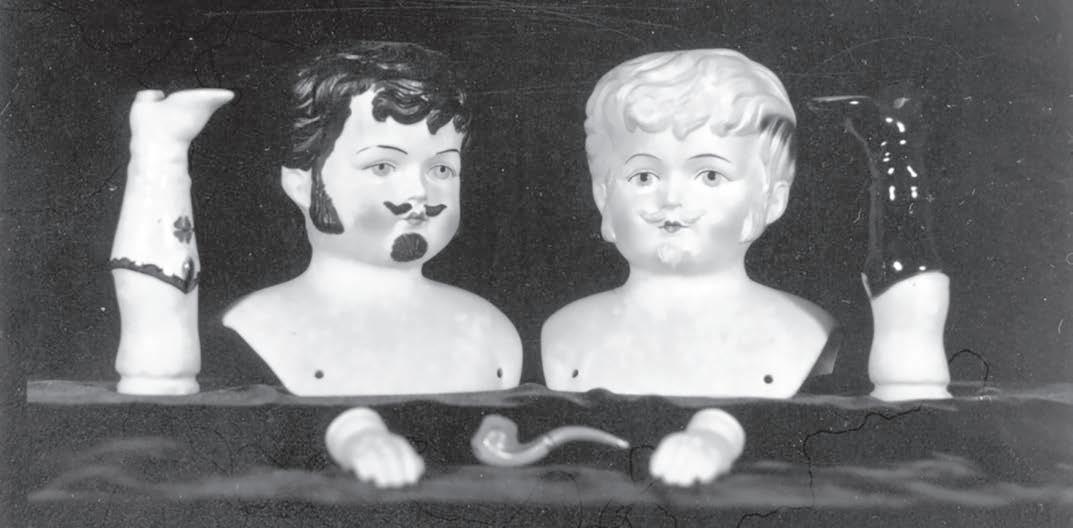
Throughout the remainder of her career Emma would continue to promote the hobby of doll collecting, writing informative articles for publications such as Hobbies magazine, keeping up her correspondence, producing doll making supplies and encouraging other doll makers by sharing her storehouse of knowledge because as Emma put it in her 1941 catalog “hobbies should teach and broaden, mold and thrill.” She even assisted the FBI during WWII as they sought to gather evidence against suspected “doll spy” Velvalee Dickenson.
Shortly before her death Emma Clear retired and sold the Humpty Dumpty Doll Hospital to Lillian Smith. Smith continued to offer dolls from the Clear molds, but these are marked either with dates after 1950 or with the name Smith included in their marks. Emma Clear died on November 22, 1952. Today her creations which paid homage to the antique dols of her day hover on the brink of becoming antiques themselves, a testament to their beauty and the determination of one doll enthusiast who helped to support and promote the hobby we still enjoy.

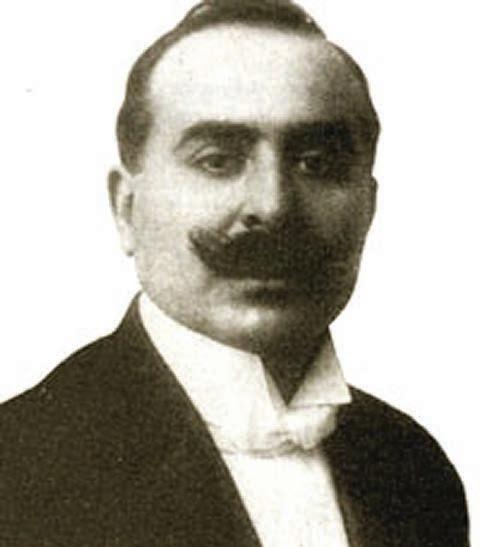
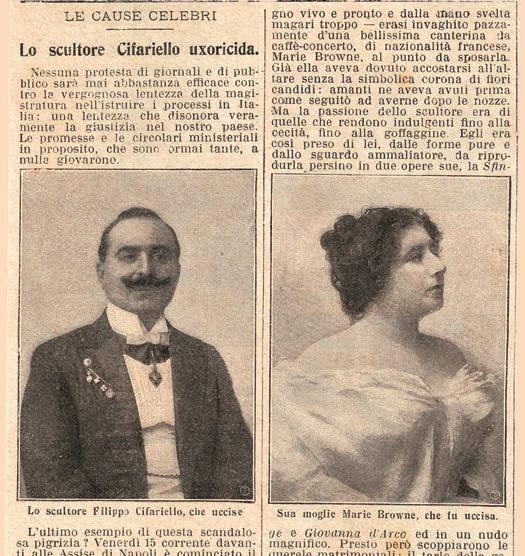 by Kathy Turner
by Kathy Turner
The Dressel, Kister & Co. doll-making company of Scheibe-Alsbach was a growing business in the mid-1800s and one that was looking to expand. Owner Johann Kister also had a marriageable daughter, Therese, to provide for. In 1853, Kister and partners Dressel and Joseph Stark purchased a factory in Passau, Bavaria, which they also named Dressel, Kister & Co. Then, Therese married Kister’s business partner, Jacob Stark. It was, I suspect, a rather summer/winter marriage, with Mr. Stark installed to manage the Passau factory. However, the well-laid plans went awry when Jacob Stark died a mere year later in 1854, leaving the young widow Therese with the Passau factory.
Wealthy widows with property did not remain lonely long. She was soon to be a bride again, and perhaps this time, she did the picking. In 1856 Therese re-married to a more youthful husband, Wilhelm Lenck, the son of a Thuringian porcelain painter and an expert in the manufacture of porcelain. The Lenck family grew. They had two sons, Adolph and Rudolf.


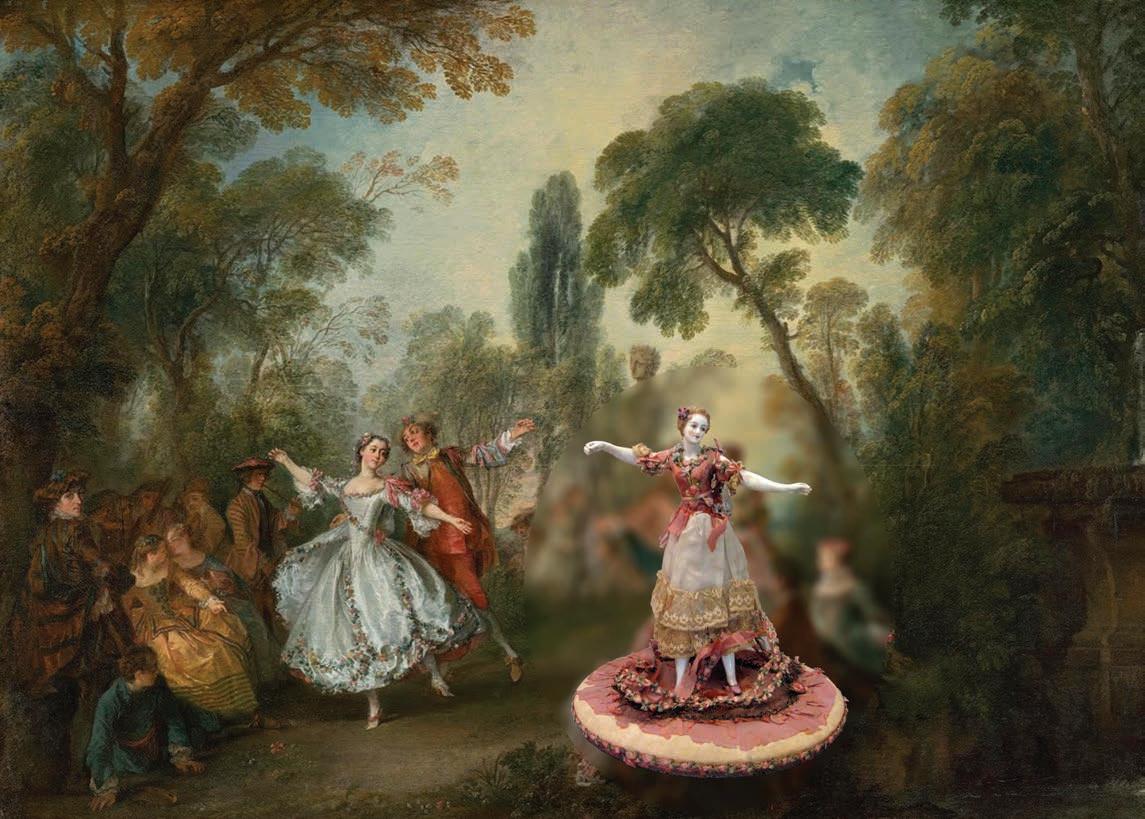
The original Dressel Kister firm in Scheibe-Alsbach was renamed A. W. Fr. Kister in 1863. It was distinct from Dressel Kister in Passau. By 1886 Dressel Kister’s control had passed on to Rudolf Lenck. Business prospered. Rudolph married a pretty young woman named Lina. They became very wealthy, owned a large amount of property, and Rudolph even held public office in Passau.
Near the end of the 19th century, the Dressel Kister factory hired a famous sculptor from Naples named Filippo Cifariello. He was famous for the realism of his figures. This was on the cusp of the Art Doll movement, and the porcelain doll industry had its own art doll movement geared more toward adults than children. Under Cifariello’s design direction, the firm produced delicate porcelain figures, half dolls, and shoulder head dolls of great artistry and the highest quality.
Filippo Cifariello’s career was tainted with scandal. He was married to a French singer and dancer, Maria de Browne, who had too many ardent fans to suit the jealous Filippo. He accepted the position with Dressel Kister in Passau to separate Maria from her followers. After five years in Passau, Filippo returned to Italy, as did Maria. In 1905, he witnessed a lover coming out of Maria’s room. The couple fought, and he shot her five times, killing her instantly. Cifariello’s trial was akin to the O. J. Simpson trial in the U.S. in the amount of publicity it garnered. He was acquitted by reason of temporary insanity. This tale is too juicy not to mention; at its intersection with Dressel & Kister in Passau, Cifariello’s eye for women translated into the beautiful modeling of the figures he designed for Dressel & Kister.
In 1906 the company owner Rudolf Lenck died at the relatively youthful age of 44, leaving his lovely young widow Lina owning the company. Production continued, leaning toward luxury goods, all bearing their distinctive company insignia - a bishop’s crook in blue.
In this article, I am showcasing the Dressel Kister shoulder head dolls, but an entire book could be devoted to their half dolls and other figurines. Traits of their products include detailed realistic modeling, striated
painting of the hair (less obvious in bisque), shoulder heads having two small sewing holes on both front and back of the shoulder plate, a bishop’s crook mark in blue usually inside, and thin porcelain of the finest quality. Some dolls have intaglio eyes.

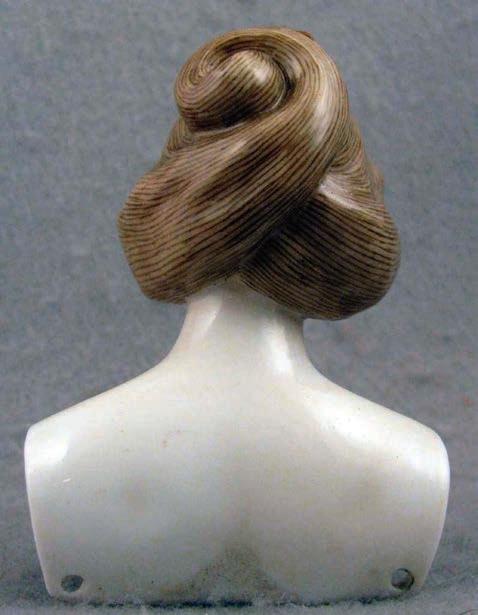
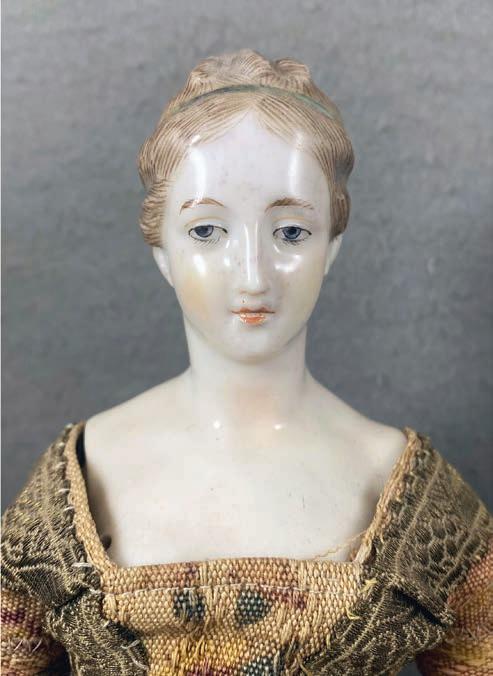
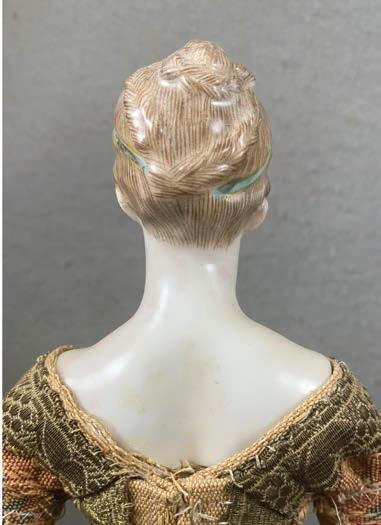
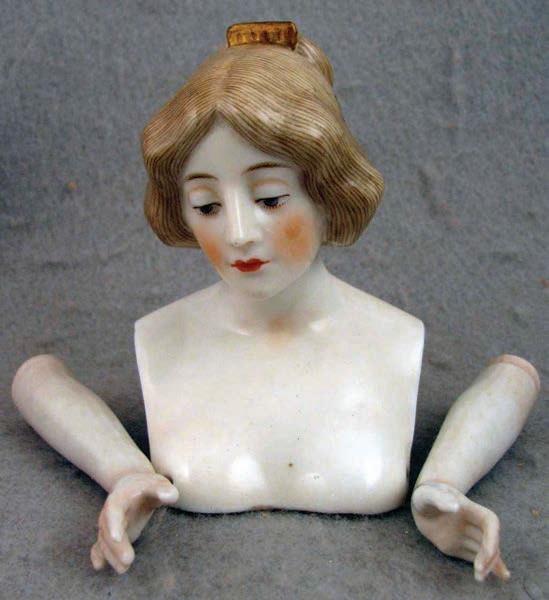
Due to the chaos of World War 1, Lina Lenck was forced to reduce production and eventually sold the factory in 1919 to another Passau porcelain factory, Aelteste Volkstedter
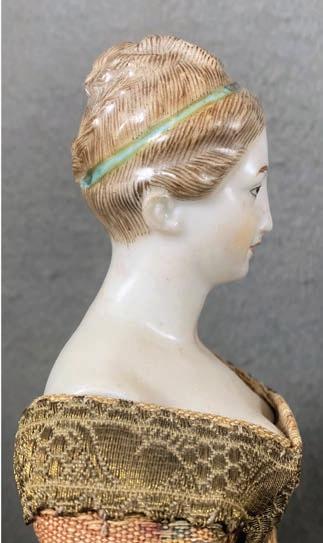
Dressel & Kister model #3941.


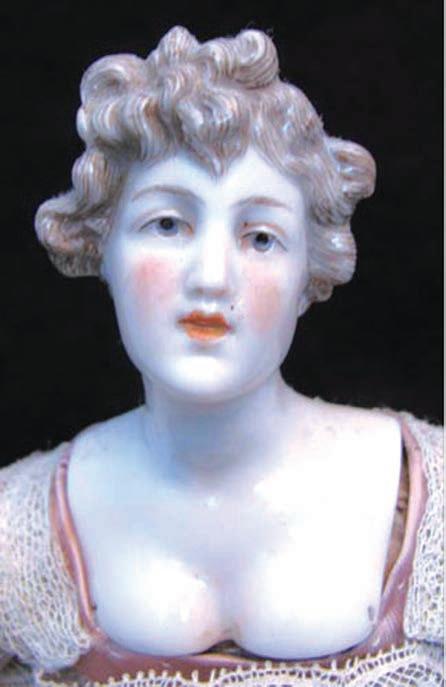
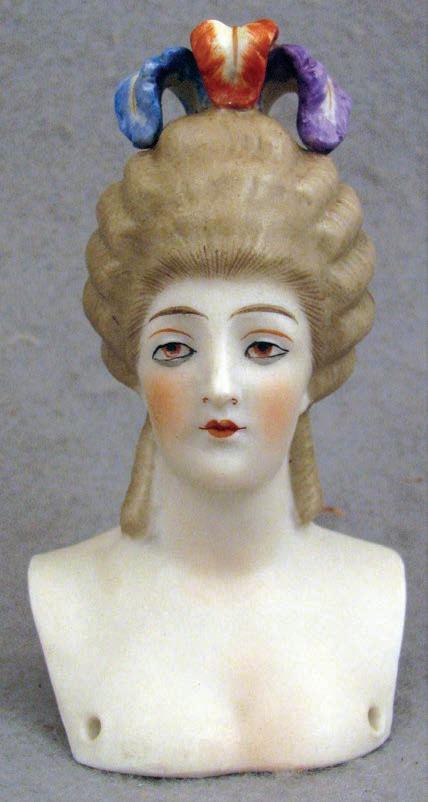
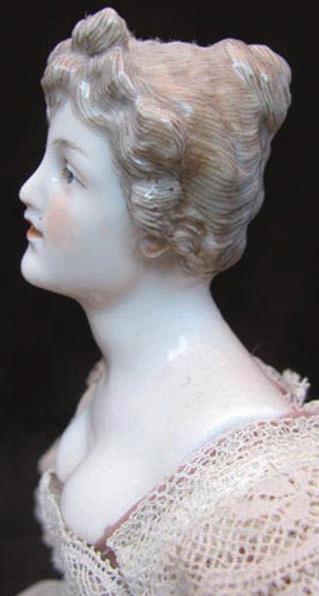
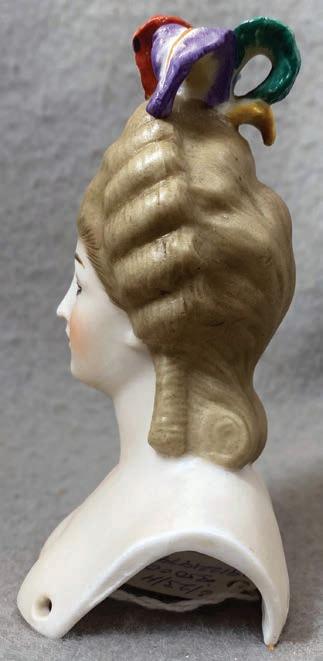
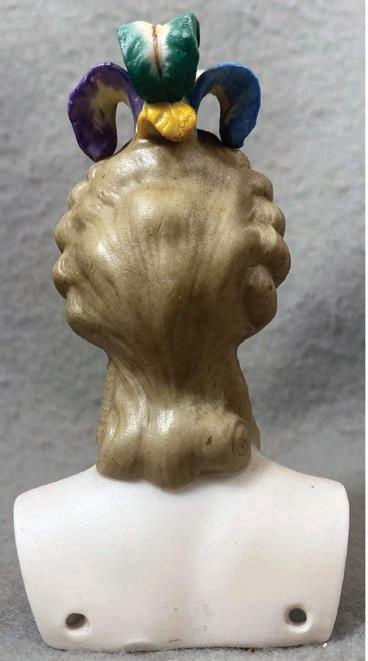
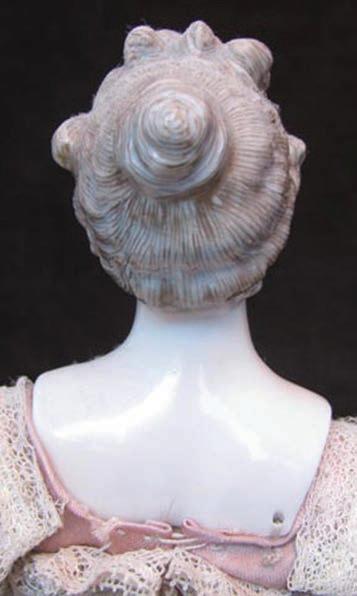
Porzellanfabrik. The technical and artistic director from 1920 was Carl Graser of Volkstedt. The situation worsened further with the economic crisis of the 1920s and 1930s, when luxury goods were not saleable. Due to over-exploitation, nearby deposits of kaolin clay were exhausted. The factory declared bankruptcy in 1936 and was taken over by the city of Passau, then sold to Phillip Dietrich in 1937 under the name Porzellanfabrik Passau. Production ended in 1942. Three years later, the factory was destroyed and plundered because of warfare, but their artistic impact remains in the form of the lovely dolls and figures Dressel Kister produced.
Thank you to the following resources: The HalfDoll with Related Items, Makers and Values Volume 2 by Shona & Marc Lorrin, Ciesliks’ German Doll Studies, Wikipedia for the image of Cifariello, and PM&M (Porcelain Works & More) website.
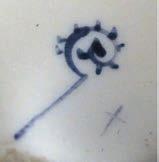

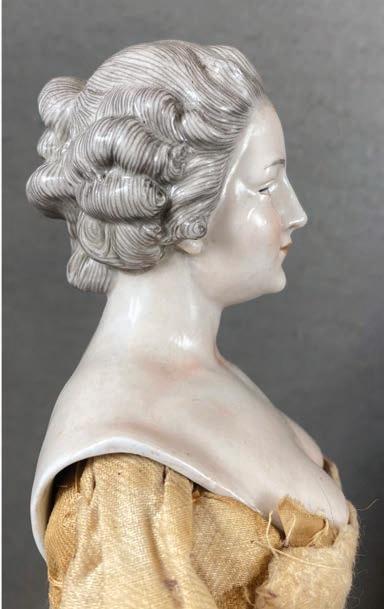
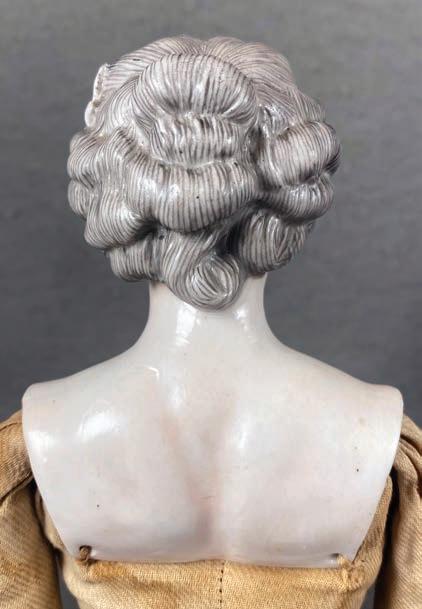
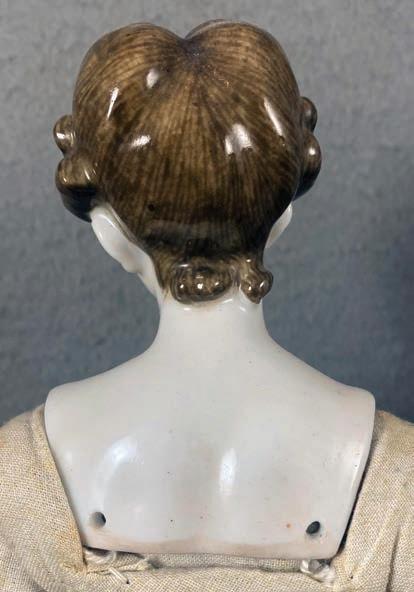
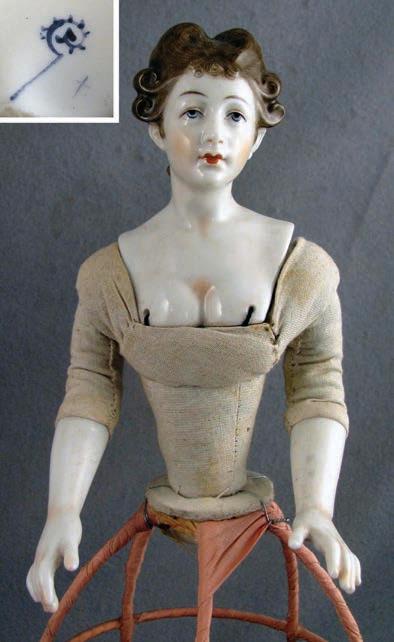
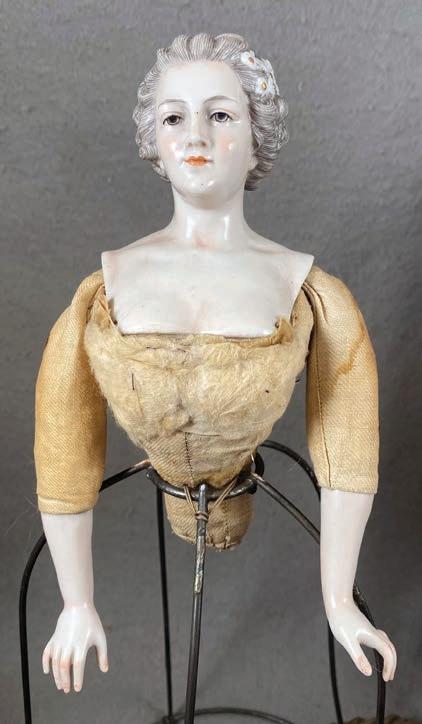


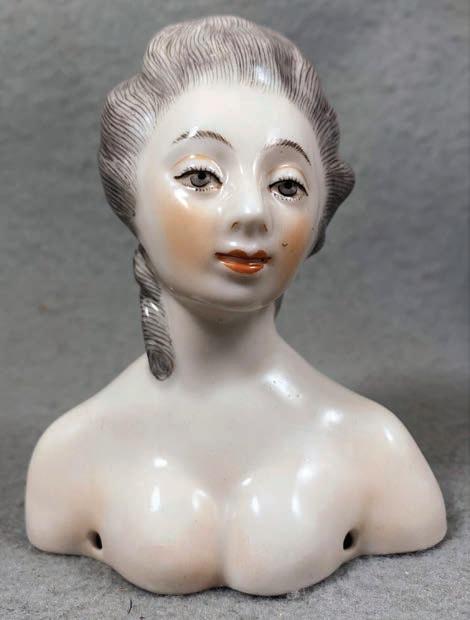
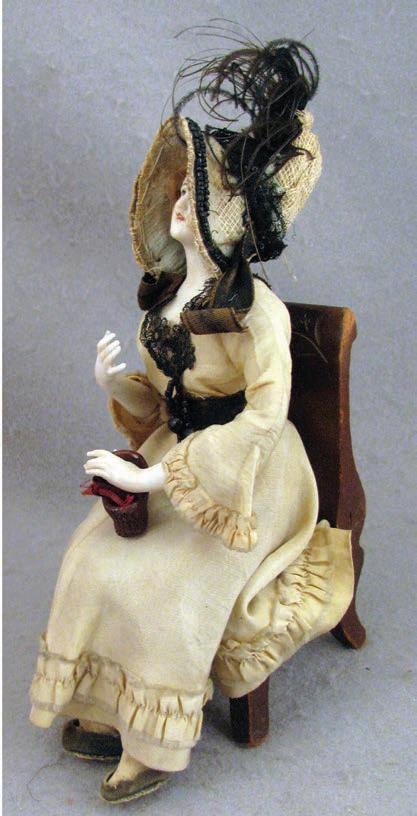
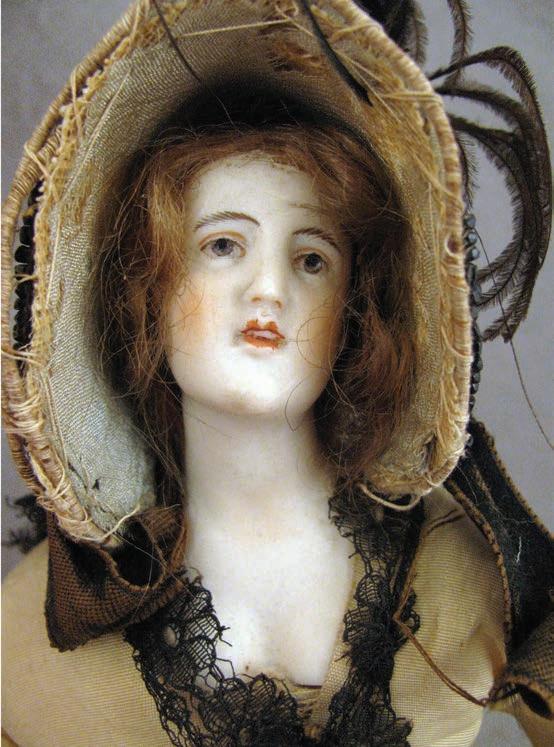
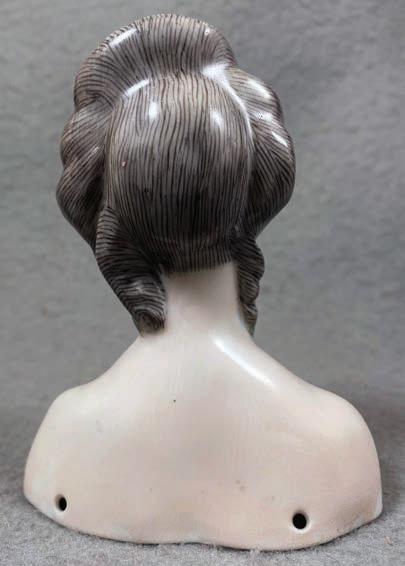
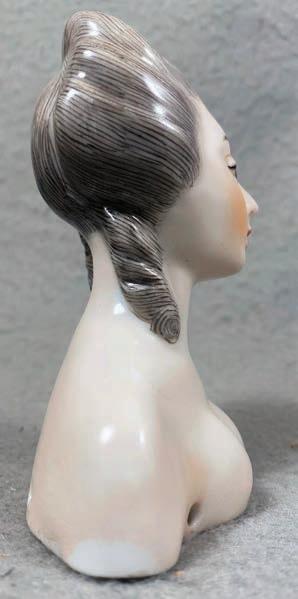
Travel & Leisure votes Mexico the “2022

Destination of the Year,” and the opening paragraph states “we celebrate Mexico’s regional nuances and less-explored pockets, the beguiling cultures, crafts, and cuisines that make it so deserving of our annual award.” And to this, we can now add that Mexico will become “Destination of the Year” for doll collectors. Rosana Duffour’s Museo Casa de las Mil Munecas (House of the thousand dolls) will celebrate its official opening soon. Having just returned from visiting Rosana I can assure you that this museum will be on the “must-see list” of all doll collectors.
April 22, 2022, found Alan Scott Pate, Vickie Hannig, Debbie Troy, and myself in Mexico City to view firsthand Rosana’s dream come true…a museum dedicated to dolls. I had not been to Mexico City since my 16th birthday in 1964. As the plane descended, I said to myself “the city has certainly grown.” Mexico City is the most populated city in all of North America and without a doubt one of the most beautiful.
As our visit to the museum was a few days off we had the opportunity to sightsee…and what outstanding sights we saw. One thing became apparent, dolls are extremely popular in Mexico. The familiar rag doll (munecas de trapo), sometimes referred to as “Marias”, seemed to be smiling at us wherever we went. These popular dolls can trace their origins to the México City workshop “Centro de Capacitación Mazahua.” The initial intention was to enhance the income opportunities for the Mazahua-Otomí people after their migration to the larger cities in search of a better future. Mexico has a long history of making cloth dolls, but the ones most popular, especially in tourist venues date back only to the 1970s, during the time the above-referenced workshop was operating. Since then, the making of these dolls has spread into various states, with some variations in dress and appearance, but always keeping with wide smiling faces, indigenous style dress, and hair generously braided with ribbons. They have indeed become a symbol of Mexico.
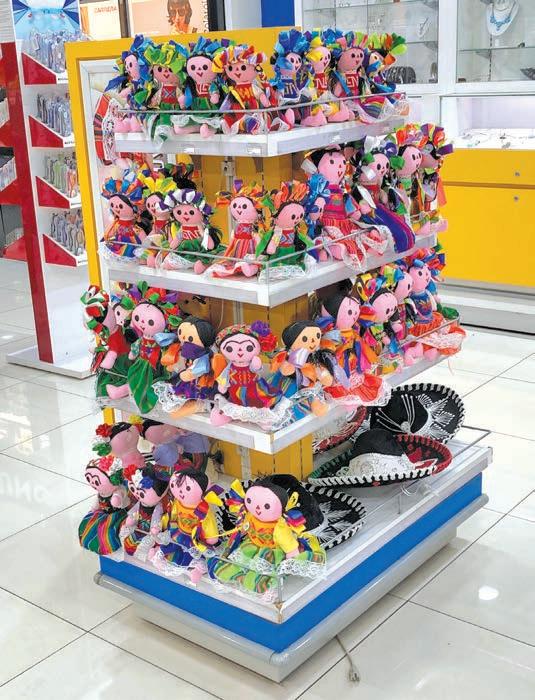
ABOVE: In case one had not yet bought a “Maria” doll, the airport was well stocked.
BELOW: Examples of three “Marias” I brought home…a cookie, a doll, and a magnet.
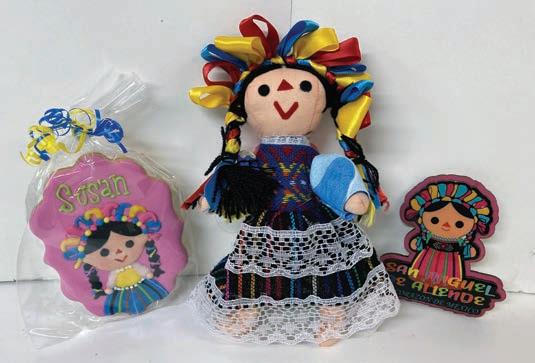
One of our first sightseeing destinations was the Museo National de Anthropologie. The Anthropology Museum contains the world’s largest collection of ancient Mexican art and artifacts. The extensive collection is laid out chronologically. We began on the ground floor with the pre-classic era and proceeded to the Teotihuacan, the Toltecs, Oaxaca, Aztec, Olmec, and finally the Mayan. While viewing the historical artifacts I came across this, what appears to be, a jointed doll. My first thought “even the early Mesoamerican culture had jointed dolls.”
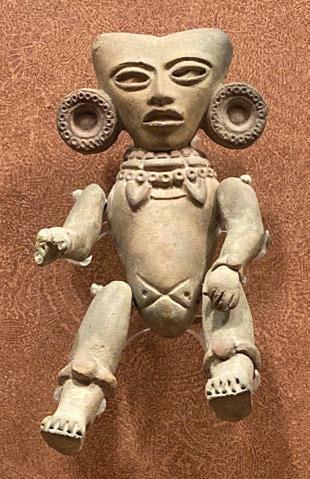
After several more days of enjoying the splendor of Mexico City, it was time for our visit to Rosana’s museum. To say it was beyond expectations is to put it mildly. Breathtaking hardly begins to describe what we encountered. Rosana has loved dolls since childhood and thus the dream of one day opening a doll museum.

Creating a museum requires far more than just providing interesting exhibits. First, one must find just the right building to house a collection. After much searching, Rosana and her husband Tetzu discovered a historic French-inspired mansion dating to the early 1900s. The building is ideally located in one of the most beautiful areas of Mexico City, near Chapultepec Park, adjacent to Paseo de la Reforma, and across the street from the few remaining arches of the circa 1715 Spanish built Chapultepec aquaduct. Perfectly situated for easy access by all forms of transportation makes this an ideal location. However, the building required extensive restoration along with the addition of a contemporarystyled six-story tower. In preparation for beginning the restoration/construction project, it was soon discovered that the water table was just a few feet below the building thus requiring the installation of numerous additional pilings. Prior to even installing the pilings it was necessary to deal with the Mexico City permitting bureaucracy which required nearly a decade. Finally approved, construction began. The end result is nothing short of perfection.
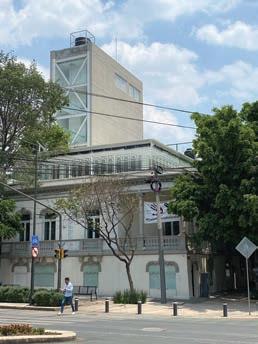

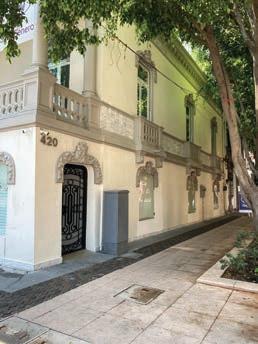
Rosana’s passion prevails throughout. Her love of architecture and design is apparent. And her college psychology degree is responsible for the museum serving as a means to educate children, teaching history through dolls. Regardless of one’s age, we all felt like a child at heart as we toured each exhibit area. In order to appeal to children (or the child within all of us) the entrance to a number of the exhibit areas is through beautifully painted “magical” doors, each promising something very special within. Think of C.S. Lewis’s The Lion, the Witch, and the Wardrobe in which the children discover a wardrobe that upon opening leads to the magical land of Narnia.
Proceeding through the reception area we encountered the first “magical door” of what appears to be a wardrobe. Upon opening the door we encountered clothing on hangers (albeit painted images of such). Opening the second door revealed the exhibit room featuring Mexican dolls. I didn’t even get past the first showcase when I was stopped in my tracks. What absolutely darling dolls! Apparently, the dolls that brought me to a halt were available through a local Mexico City candy store in the 1920s. I want one!! But I could not linger…there was more to see.
The “magical” doors that lead to the first exhibit area.



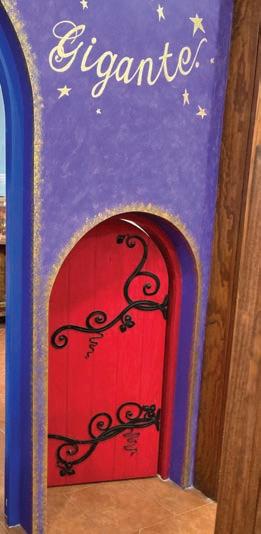
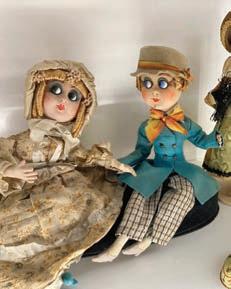

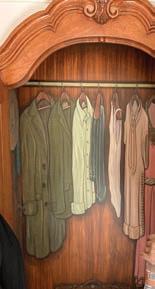
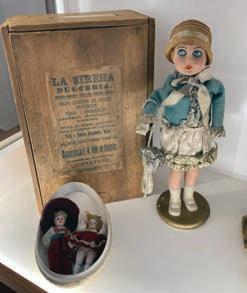
Next, we discovered two “magical” doors…one for adults and one for children. Entering through these doors brought us to an international array of dollhouses and miniature room settings. This in turn brought us through a magical hallway to the Harry Potter house.
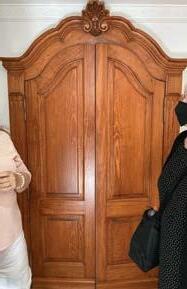
The
The big door and little door that brought us to the room of miniatures.
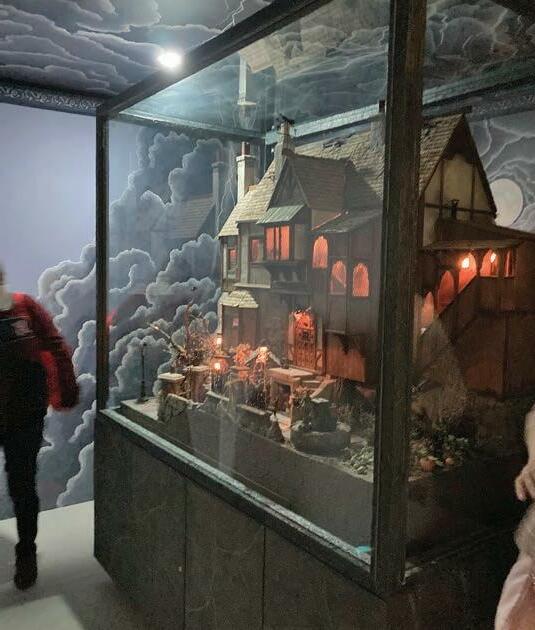
Miniature room setting.
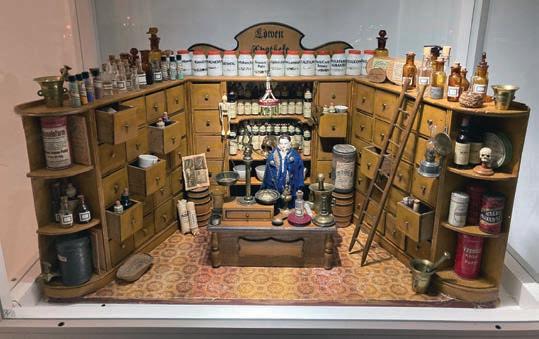 Harry Potter House.
Exceptional dollhouse.
Harry Potter House.
Exceptional dollhouse.
As we continued our tour, we viewed an exhibit area that will feature dolls through the ages including ancient Rome, early English wood, German papiermache, and Japanese ningyo. The next room will center
around fine French dolls. Then German dolls riding a working carousel will welcome the visitor to their display. Additional exhibit areas will highlight baby dolls, modern dolls, and even dolls that would appeal to boys.
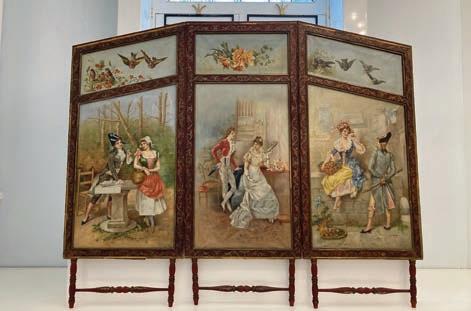

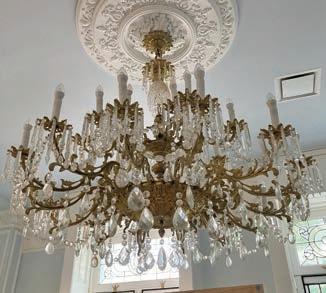
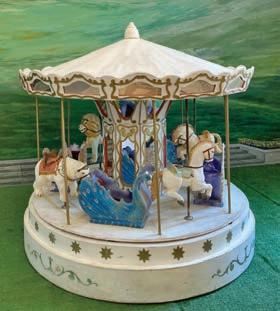
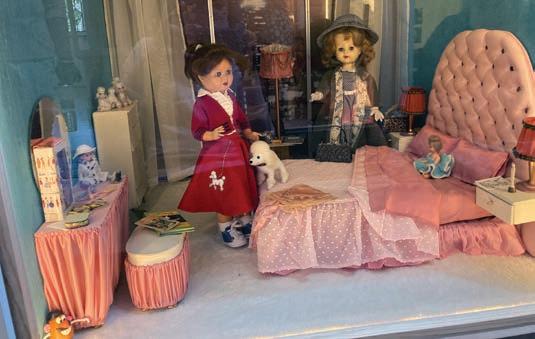
The
Another exhibit area that has been installed featured room boxes representing various decades beginning with 1900 then 1910, 1920, etc. I was especially drawn to the 1950s room box in which the doll was wearing a poodle skirt like the one I had as a child. The last box was titled “the future.”
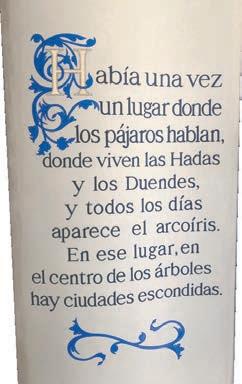
The 1950s room box. Not only does the doll have a poodle skirt like the one I had, but we had the same dressing table …mine was blue. Note the miniature Barbie in a box and Mr. Potato Head. What memories.
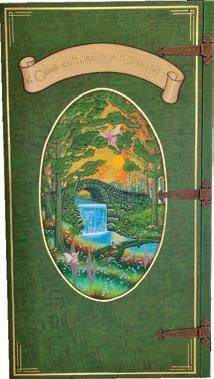
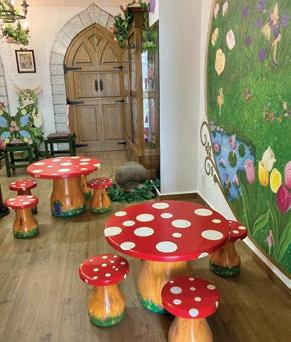
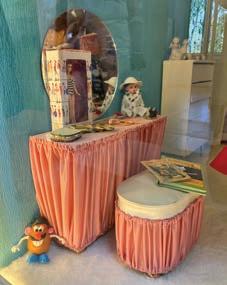
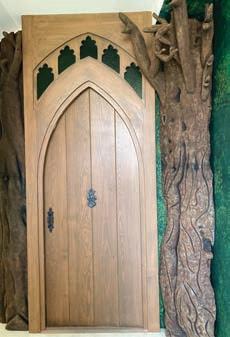
In keeping with the emphasis on children, Rosana has created “fairyland.” Entering through more enchanting doors brought us to “fairyland.” Here children will be able to dress up in provided fairy costumes, have their photos taken, enjoy a treat, and even create magic potions.
Doors to Fairyland. Top left photo: door reads: “Do You Believe in Fairies & Goblins?”, Top right: Opening the door reveals on the reverse the following words:
“There was a place where birds talk, where fairies & goblins live, and every day the rainbow appears. In that place in the center of the trees, there are hidden cities.” The next door (bottom makes one think they are in a forest, and upon opening reveals Fairyland.
screen that will highlight the French room. The German dolls’ carousel.Then there is the breathtaking café in Parisian pink and white with a spectacular view of the ancient aqueduct and the modern skyscrapers beyond. Just imagine how special we felt to be the first to be served lunch in the café.
This visit indeed opened our eyes to what it takes to create a world-class museum. When building a museum, the exhibit is only the beginning. Rosana is not just creating a venue to display treasures, but a restaurant as well, and thus a commercial kitchen is required. And of course, a museum needs a gift shop that must be stocked. Just imagine how many employees are needed to keep the museum going…. guards, meal preparers and servers, cashiers, gift shop sales force, docents, etc. Within the next couple of months, the few remaining architectural details will
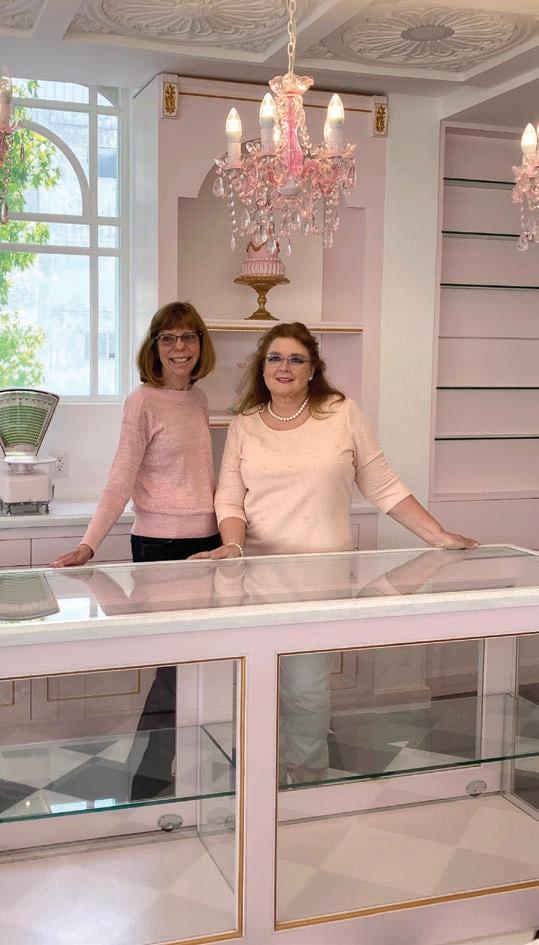

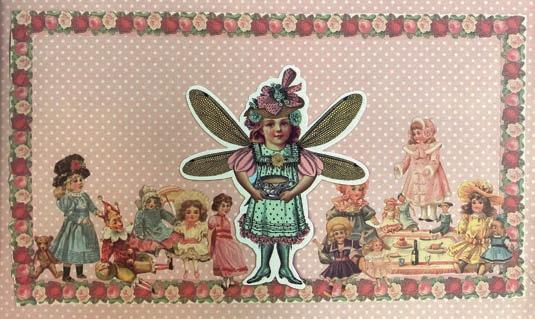
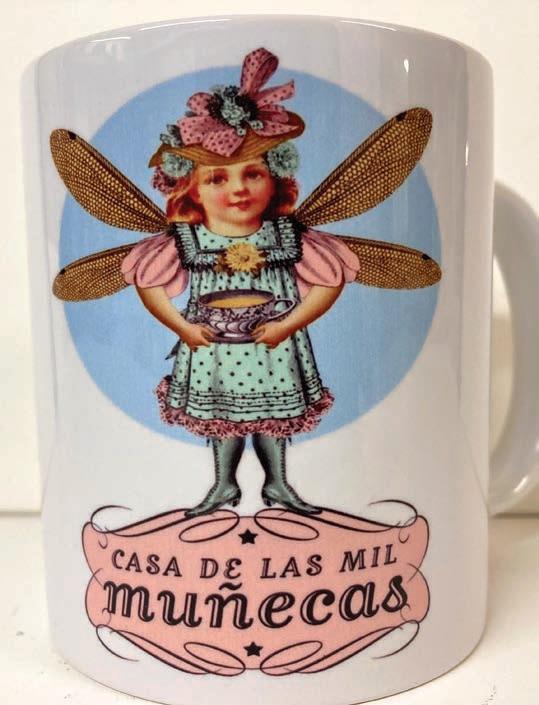
have been completed, the exhibits added, and the doors will officially open to the public. I will definitely be heading south to Mexico once again to see the final result. In the meantime, my sincere thanks to Rosana for her friendship and hospitality and for this amazing gift she has created for all the world to enjoy. q
The address for the museum is: Casa de la mil munecas Av. Chapultepec 420, Col. Roma Norte, 06700, CDMX casamilmunecas@gmail.com
ABOVE and BELOW: The souvenir mug and the original brochure featuring the museum logo. Rosana & I selected the perfect color for the day “Pink.”
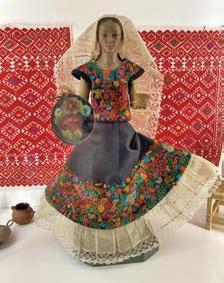
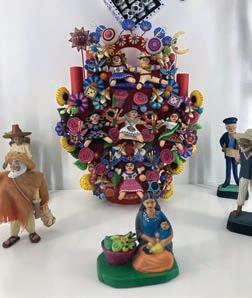
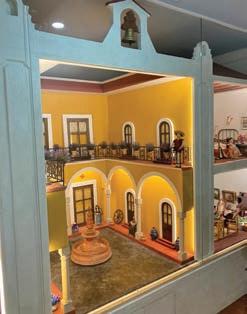
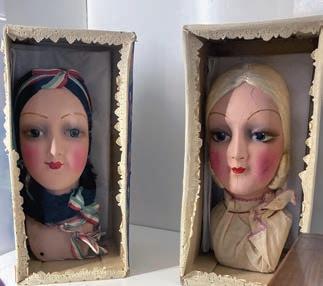
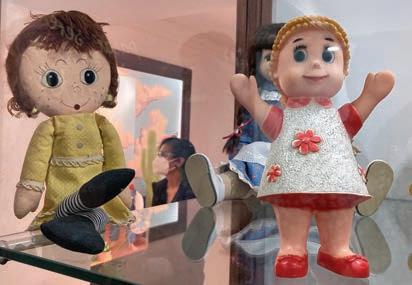
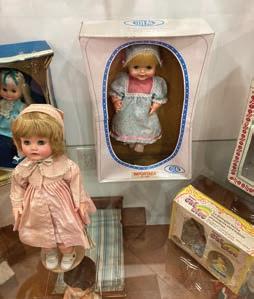
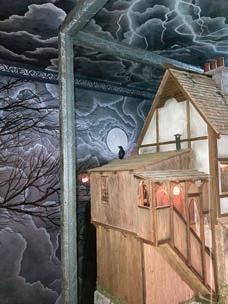
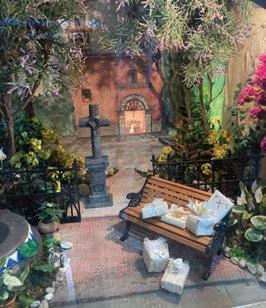
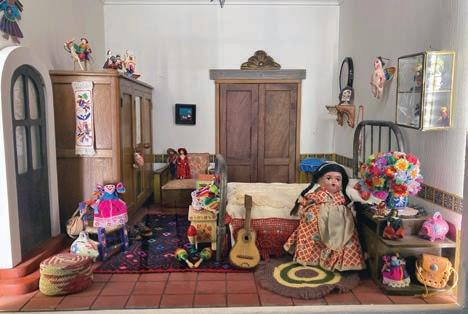
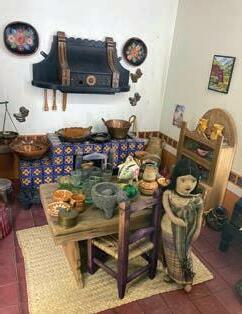
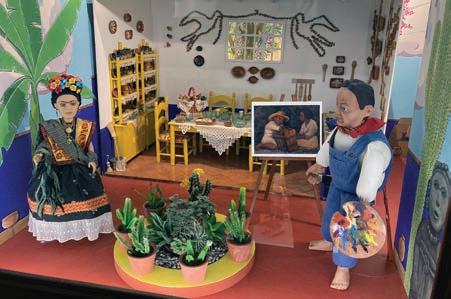
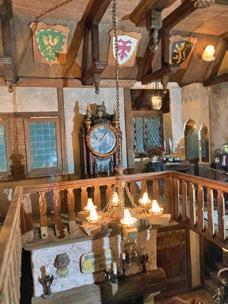
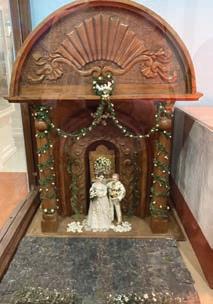 Dolls in the Mexican Doll Display area include: Left to right: Rosana’s childhood dolls, traditional type doll, boudoir type doll heads made in Mexico.
Left to right: Tree of Life which is popular throughout Mexico, and of course, Frida Kahlo and Diego Rivera are prominent throughout Mexico as well. And Ideal dolls made in Mexico.
Also in the Mexico room is this large doll house. Center shows the child’s room (note the smiling “Maria” doll at the left), and the kitchen with beautiful tile work at right.
Left to right: Two-room settings from the miniatures room…the bride and groom exiting the church and church as they were married (you can see them through the window). Two additional views of Harry Potter House.
Dolls in the Mexican Doll Display area include: Left to right: Rosana’s childhood dolls, traditional type doll, boudoir type doll heads made in Mexico.
Left to right: Tree of Life which is popular throughout Mexico, and of course, Frida Kahlo and Diego Rivera are prominent throughout Mexico as well. And Ideal dolls made in Mexico.
Also in the Mexico room is this large doll house. Center shows the child’s room (note the smiling “Maria” doll at the left), and the kitchen with beautiful tile work at right.
Left to right: Two-room settings from the miniatures room…the bride and groom exiting the church and church as they were married (you can see them through the window). Two additional views of Harry Potter House.
he 1950s and 1960s were a time when magazines graced every coffee table, bedside stand, and kitchen counter. Mothers read Good Housekeeping as they basted their roasts, created gifts for their family from McCall magazine patterns, and fell asleep while reading Cosmopolitan. Fathers relaxed in the evening with Popular Science, Life or National Geographic, and many families kept the Reader’s Digest handy in the bathroom.
Most children of the time received gifts of subscriptions to Humpty Dumpty, Jack and Jill, Boys Life, or Calling all Girls, which they read and traded on the playground during recess. Though I enjoyed these magazines growing up, I was fascinated with my parent’s periodicals. The women were glamorous in their elbowlength gloves, bangle bracelets, and high heels standing by a new Cadillac or stove. The men were debonaire in their tweed sportscoats and pocket handkerchief as they fiddled with the thermostat or carried bags in an airport.
I remember thinking as a girl of about ten that the
advertisements in my mother’s magazines depicted a life into which I wish I could escape. The refrigerators were turquoise, they talked on pink princess telephones, the linoleum kitchen floors were always shiny and the women wore pearls as they cleaned their ovens, just like June Cleaver on Leave it to Beaver.
Yes, vintage magazine advertisements always fascinated me and as an adult doll collector, I began amassing a collection of vintage ads. First, it was advertisements for particular dolls such as American
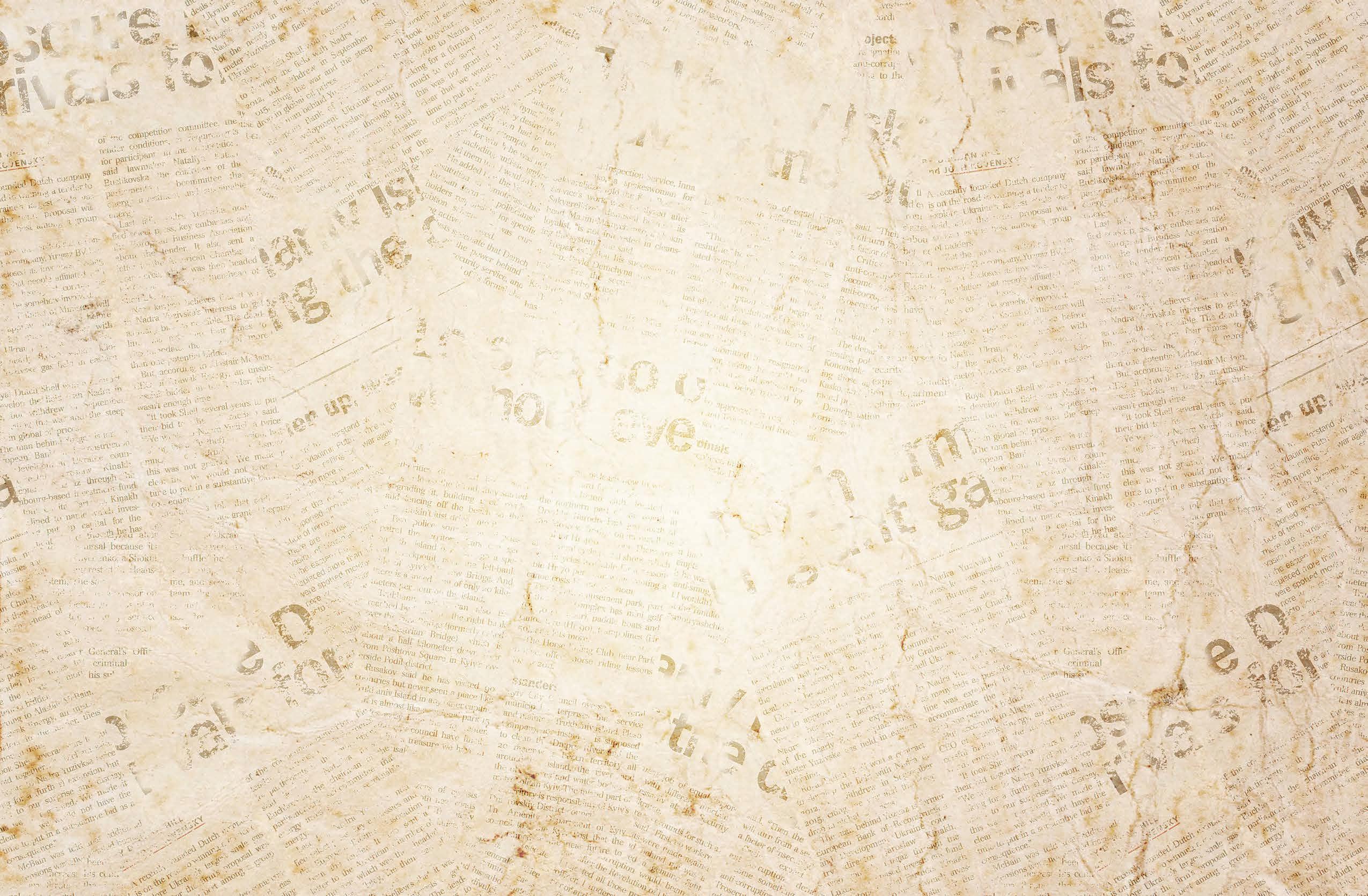
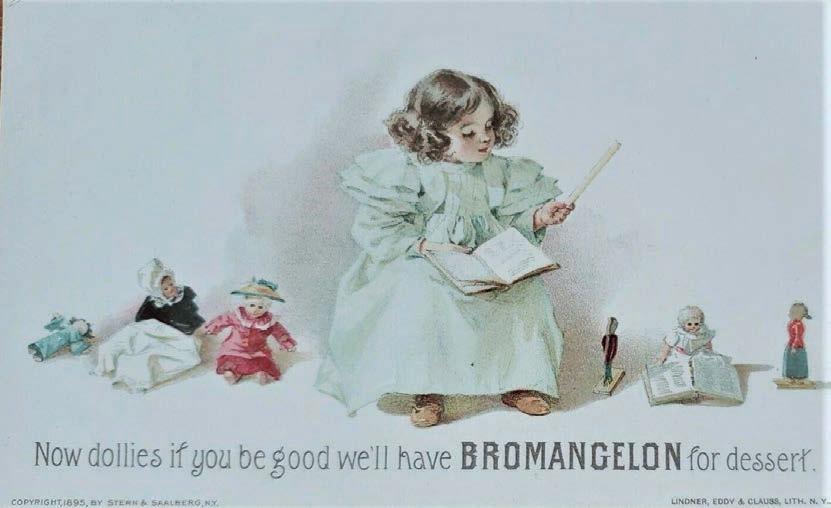
Character’s Sweet Sue and Ideal’s Toni doll. As I leafed through piles of old magazines at flea markets and antique shops, I realized that dozens of ad agencies placed a doll somewhere inconspicuously in their ads when selling cars, cleaning products, heating systems, and desserts. Usually, with little girls, the dolls were hidden in plain sight.
So, my collection of ads with dolls grew through the decades as I went on scavenger hunts to find unique advertisements with dolls. As I recently thumbed through my stash of ads, I began to wonder what the doll intentionally placed in a little girl’s arms or alone on an

empty airplane seat meant. There were too many dolls placed in ads to be accidental, so they must be subliminal messages that have long that have been used to promote products.
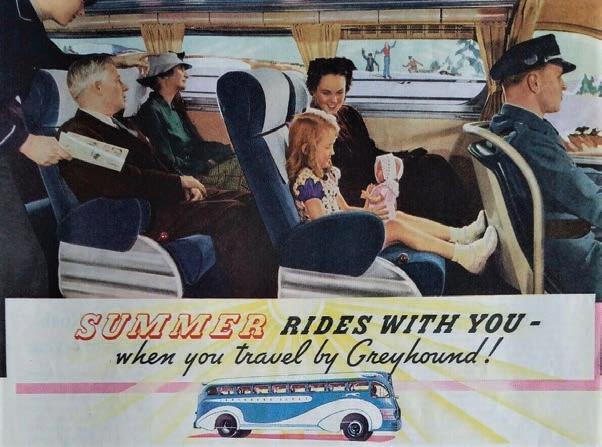
Today, companies pay millions of dollars to have a coke can placed strategically in a movie or have designer shoes worn by an attractive actress on a TV show. Leo Burnett, the marketing genius who came up with campaigns for The Jolly Green Giant, Morris the Cat, and The Pillsbury Dough Boy gave this advice to manufacturers. “Don’t tell me how good you make it; tell me how good it makes me feel when I use it.”
Left: Packer’s Tar Soap ad, 1903, uses a sketch of a little girl giving her doll a bath.
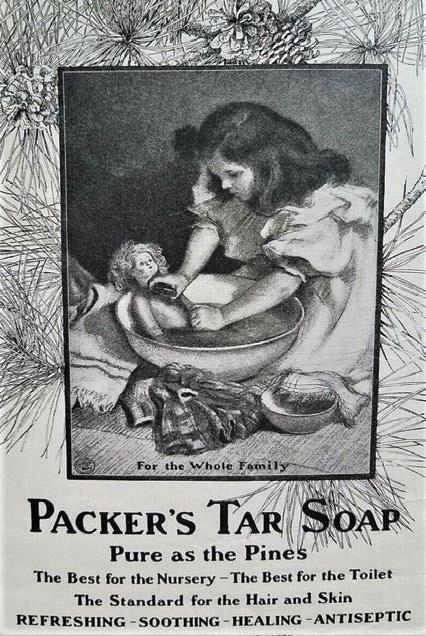
Right: Surrender Perfume uses a Nancy Ann Storybook princess doll in Harper’s Bazaar magazine,1944, and the ad is accompanied by another Nancy Ann Storybook princess doll.
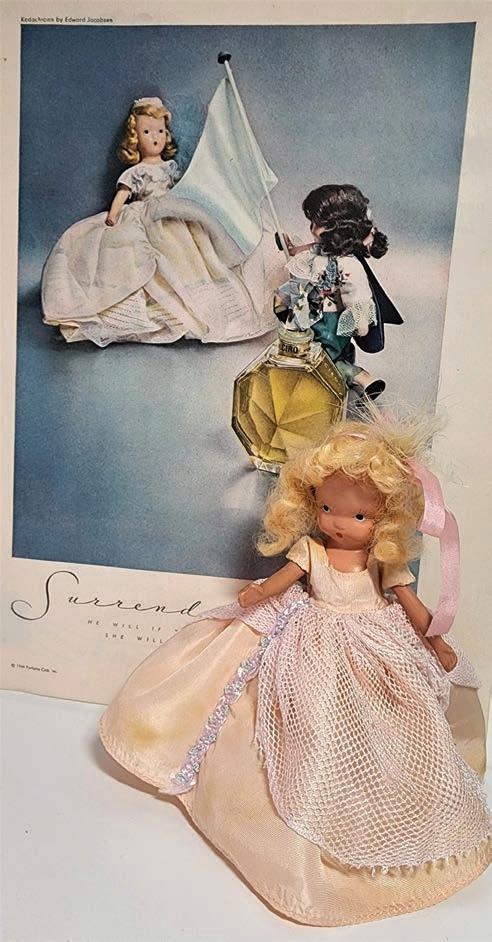 1937 Greyhound Bus Company ad boasts that it was always, “summer warm and pleasant” while a young miss plays with a composition baby doll.
1937 Greyhound Bus Company ad boasts that it was always, “summer warm and pleasant” while a young miss plays with a composition baby doll.
So how does a doll make us feel when placed in an ad? Let’s examine some vintage magazine advertisements and try to figure that out. Beginning with our earliest ad, a 1903 Packer’s Tar Soap ad features a pen and ink drawing of an adorable little girl giving her doll a bath. The message was clear. Packer’s Tar Soap was soothing enough for a doll and child’s hands.

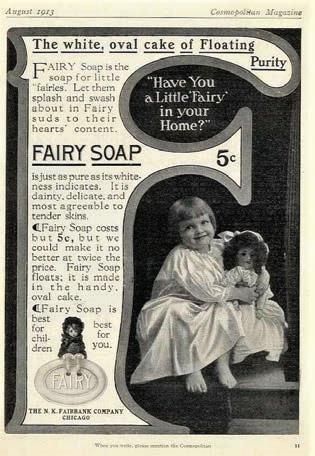
A 1952 ad for American Cyanamid Company shows a young boy and girl cuddled up in an armchair with snow outside the window, a blazing fire on the hearth and the sleeping little girl has a fairy skin doll wrapped in her arms. If you read the text, it professes, “Greater protection against illness and suffering.” The message? American Cyanamid protects your family just as the boy protects his little sister and she protects her doll.
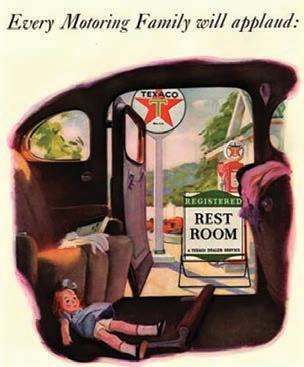
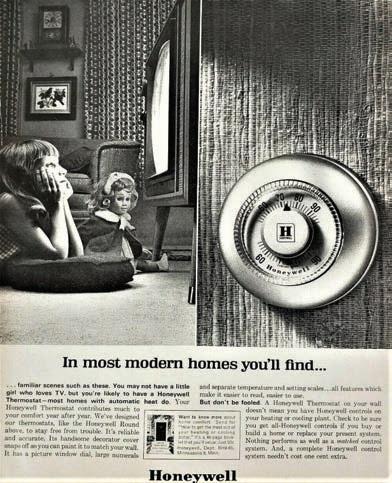
A Greyhound bus advertisement from 1937 boasts comfort while traveling in the winter cold, “Summer rides with you.” Anyone who has traveled a long distance with children knows comfort is important. The color photo features a little girl comfortably playing with a composition baby doll.
General Motors in 1939 outdid themselves with cuteness by having a fullpage ad in National Geographic that depicted a sleeping toddler embracing her Raggedy Ann doll while she was guarded by a huge Saint Bernard dog. The heading is, “Securely yours.” The message is all that you cherish is protected by the design of their cars.
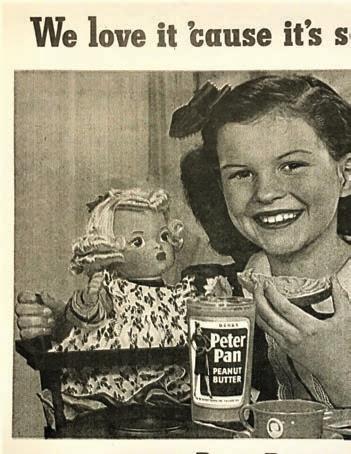
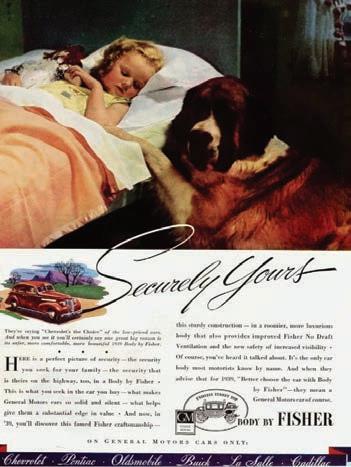
Though dolls that couldn’t be identified were used in photographic illustrations in many ads over the years, by the 1950s the most popular dolls were used. Perhaps it might catch the eye of a woman who had purchased the doll for her daughter and make her take a second look at the product being promoted. Yet it seems that the same subliminal messages continued.
A Nancy Ann Storybook Princess doll was used in 1944 for Surrender Perfume and was the solitary theme of the ad, not hidden in the corner. Perhaps the message was not the same as many previous ads which seemed to offer safety and comfort, but rather was suggesting that you too could be princess-like if you used their perfume.
Nancy Ann, a 6-inch beauty, began as a bisque doll from 1936 to 1948, following were hard plastic Storybook dolls. Both versions had painted faces and mohair wigs topped with a large bow or hat. In 1943, there were 77
A Saint Bernard dog watches over a sleeping lass as she hugs her Raggedy Ann doll and General Motors makes the promise, “Securely Yours.” Honeywell Thermostat uses a Chatty Cathy doll and her little owner watching television in comfort, 1963. N.K. Fairbank Company utilizes a little girl and large porcelain doll in their Fairy Soap advertisement, 1913. Peter Pan employs a Terri Lee doll to sell their Peanut Butter in the 1950s.characters in elaborate outfits which made the tiny dolls unique. Costumes and accessories were attached to the doll and more often they were displayed rather than played with.
While most ads used the doll as a background prop, another cosmetic company also used their doll as the centerpiece, Yardley Cosmetics used Madame Alexander’s Cissy for a huge advertising campaign with multiple ads in 1956 and 1957. Cissy was dressed and put into scenes representing sophisticated women of the day with the caption, “Makes you feel so fresh and feminine.” It subliminally told women they too could be cosmopolitan.
Cissy was a 20 inches tall vinyl fashion doll that was manufactured by Madame Alexander from 1955 to 1959. She had jointed knees and elbows, high heel feet and hundreds of glamours outfits. Her accessories included fur stoles, dangle earrings, and sexy evening gowns.
In 1950 Peter Pan Peanut Butter used the 16inch Terri Lee doll in an ad with a little girl eating a sandwich. Terri Lee was sold from 1946 to 1962 by the Terri Lee Doll Company. Originally, she was a composition doll with wide-spaced eyes, painted face, and a wig. In 1951 she became hard plastic, but toward the end of manufacturing, some dolls were made from
vinyl. Terri Lee had a brother, Jerri Lee, with a caracul wig, and a little sister, Linda Lee. All came with detailed clothing, including a Girl Scout uniform and western attire.
Little Lulu was originally a one-frame comic in 1935 and featured in the Saturday Evening Post. Soon she starred in comic books, and cartoons and in 1944 became a 13-½ inch rag doll made by Georgene Novelties. She came in a red dress, wore a hat, and carried a purse.
Ford Motor Company in 1941 used Little Lulu in an ad that showed her with a little girl and Scottie dog waiting to take a trip in a beautiful Ford Sedan. Below the photo is a list of Ford’s advantages and most have to do with safety.
Betsy McCall was often seen in advertising because of her appeal and longevity. One example is a 1943 ad in which General Electric is advertising a fan. It shows a Betsy being held in front of a fan with her hair blowing as the little girl watches television in comfort. Another is a 1956 ad for Hearts Delight Apricot Juice where the girl and Betsy are drinking from straws and the caption professes that it is nutritious.
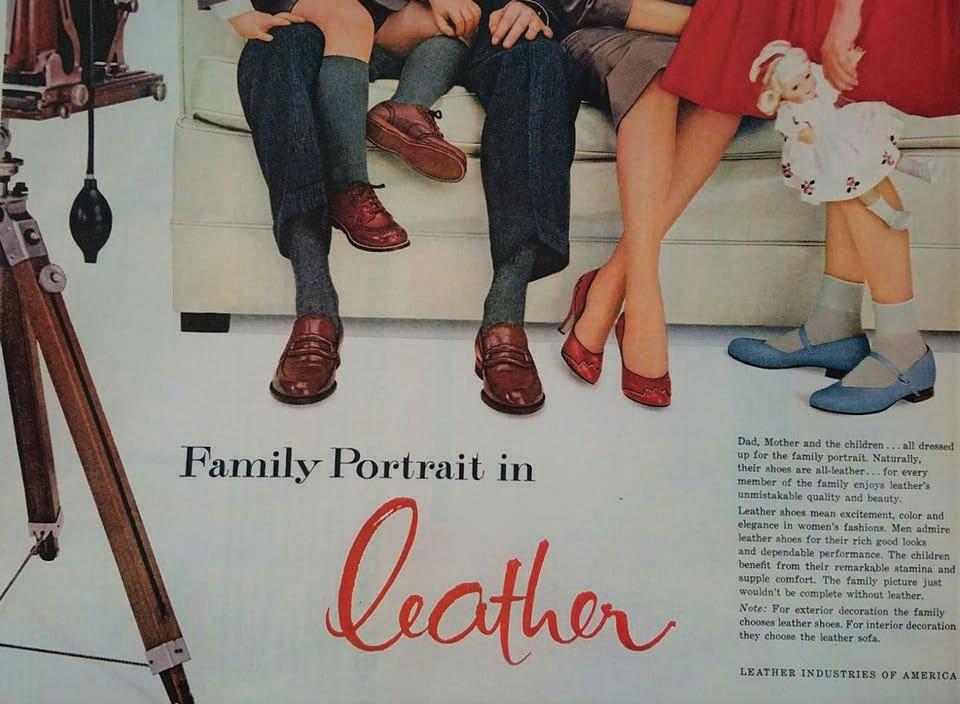
Betsy was originally created as a paper doll that appeared each month in McCall’s magazine beginning in 1951. She became so popular that Ideal Toy
 An Ideal’s Toni doll is dangling from a little hand in a 1957 Leather Industry advertisement.
An Ideal’s Toni doll is dangling from a little hand in a 1957 Leather Industry advertisement.
Company turned her into a doll the same year and they were sold until 1957. She had a hard plastic Toni doll body with a vinyl head, chubby cheeks, and glued-on wig and was 14 inches tall.
Chatty Cathy was one of Mattel’s bestselling dolls from 1960 to 1965. She was a vinyl and plastic 20-inch little girl doll with a record in her body and a pull string on her back that allowed her to talk. Chatty Cathy can be seen in a N.O.F.M.A. flooring ad from 1962 where twin girls are playing with her on the floor and the caption reads, “Beauty and less care.”
In 1963 Chatty Cathy was shown in a Honeywell in its Thermostat ad. A young girl is intently watching TV but the Chatty Cathy breaks the 4th wall and stares at the reader. Is she trying to assure the reader that the ad is correct in promising comfort with a Honeywell heating system?
Toni, a little girl doll, was manufactured by Ideal and sold as an advertising doll for Toni Home Permanent. She was a darling who came with a set of solutions, papers, and curlers. Toni could have her nylon wig permed and styled. She came in sizes 14, 16, 19, 21, and 23 inches. Toni was made entirely of hard plastic and was sold from 1949 to 1953.
Toni can be seen dangling from a little hand in an advertisement promoting the Leather Industry in 1957. The ad only shows the feet of a family of four waiting to have a portrait taken. Though it describes the attributes of all the leather shoes in the illustration, what it says about women’s shoes is interesting. It states that shoes are exciting and fashionable when made of leather. What more could a housewife want than excitement and to be fashionable?
Kelly was a 15-inch vinyl Madame Alexander doll that was made for two years, 1958 and 1959. She has the same face as Madame Alexander’s Maribel. She had light brown hair, thick bangs and often wore a pink dress with a white pinafore, but came in several different dresses. In a 1961 advertisement, she can be seen sitting on the floor admiring a new Kalvinator Refrigerator. Everyone loved the elegance of Ideal’s Miss Revlon who was touted as, “The most beautiful doll ever made.” Created by Ideal, she represented the women of the time in elaborate hats and lace gloves who were on the covers of fashion magazines. She had an adult body, high heel feet, and came in 15, 18, 20, 23, and 26 inches. Miss Revlon had pierced ears, and a pearl necklace and made her debut in 1956 and was sold until 1959. Her attire was always high fashion and one of her most popular outfits was, “Cherries a la Mode.”
Flor-ever Flooring, in a full-page advertisement in Better Homes and Garden, May 1959, shows a little girl on the floor playing with Miss Revlon. Miss Revlon is wearing her cherries dress and the caption for the beautiful vinyl floor says, “Trend-Setting.”
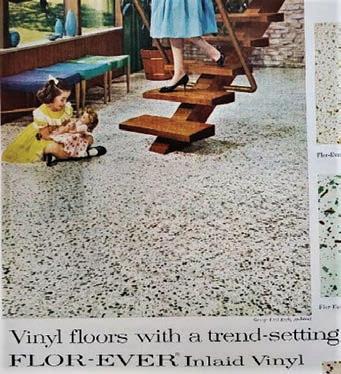
Ad Detergent for washing clothes used two different dolls in very similar ads. The mother is in the background with a washing machine and the little girl is in the foreground of the illustration washing her doll’s clothing in a toy washing machine. In 1954, Ad Detergent used a Harriet Hubbard Ayer doll and in 1956 they featured a hard plastic Tiny Tears with molded hair.

Harriet Hubbard Ayer doll was made by Ideal and named after a famous entrepreneur in the cosmetic business. The Harriet doll came in 14, 16, 19, and
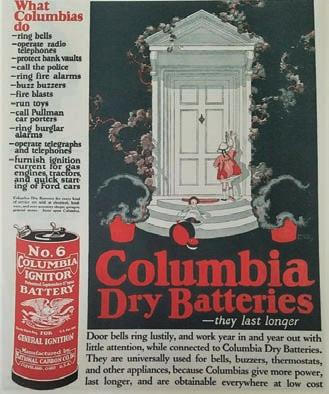
Top: Columbia Dry Battery Company lists the uses for their product accompanied by a Raggedy Ann doll, 1922.
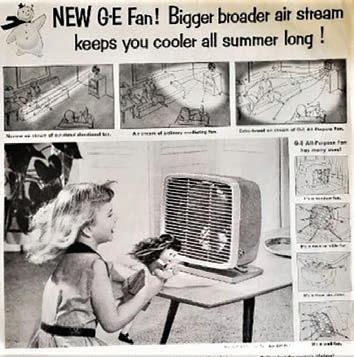
Second: Chatty Cathy is shared by twins as they enjoy N.O.F.M.A oak floors ad in The American Homes magazine, 1962.
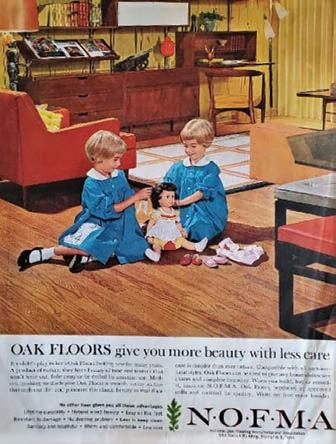
Third: General Electric fan cools television watching girl and her Betsy McCall in a Saturday Evening Post ad, 1953.
Bottom: A little girl is sitting on Flor-ever flooring with her Miss Revlon doll, Better Homes and Gardens, May 1959.
Left: In 1961 a Duraclean

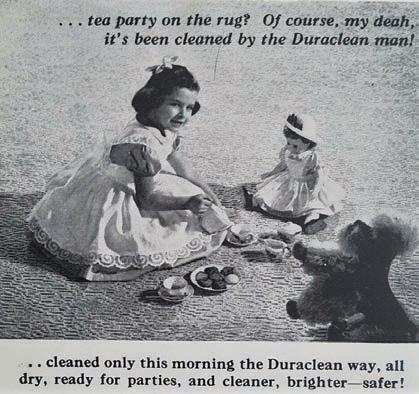
is, “cleaner brighter, safer.”
Middle: An Ad Detergent advertisement shows Tiny Tears getting her outfits washed, McCall’s 1956.
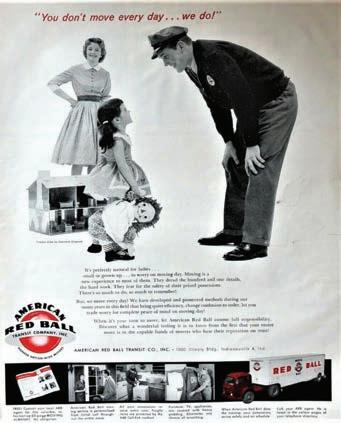
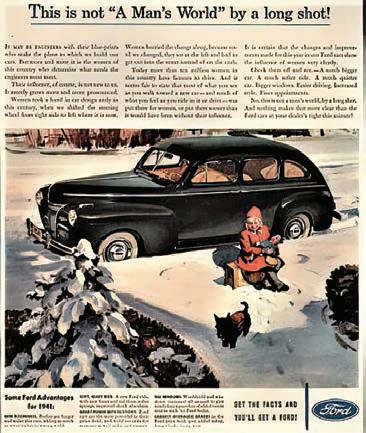
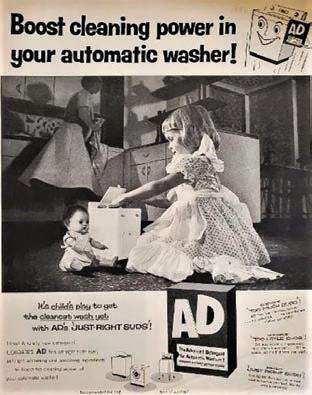
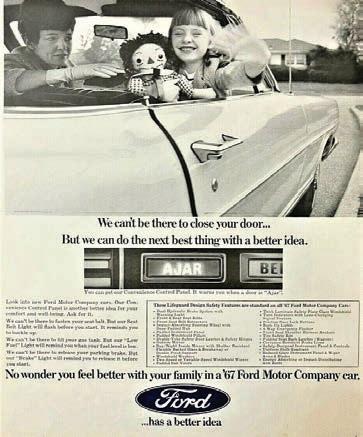
Right: A 1967 ad for Ford Motor Company shows a Raggedy Andy doll in one of their cars with the door ajar and explains how their control panel keeps you safe.
21-inch sizes and used a Toni doll hard plastic body and limbs. She had a vinyl head with rooted hair, but no face paint. Lucky little girls got to put makeup on her, wash her face, and try again. Harriet came with an 8-piece cosmetic set, and wore a grey dress with a red and white striped pinafore. Harriet was only sold in 1953.
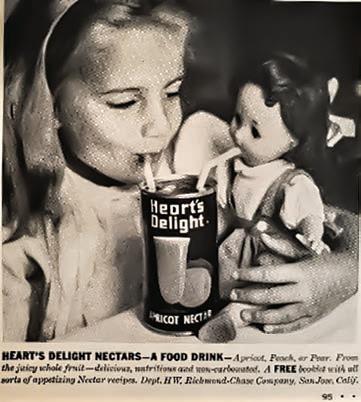
Tiny Tears was manufactured by American Character. Like most dolls with longevity, Tiny Tears went through changes over the years. Originally, from 1950 to 1955, she was a drink and wet baby doll with a hard plastic head with molded hair and a rubber body. Then in1959-1961 she wore a glued-on caracul wig and finally she became vinyl with rooted hair. Tiny came in 13, 16, and 20 inches.
In 1965, the Sears and Roebuck Christmas Catalog
sold a sibling set of dolls, Pink and Pretty Big Sister and Little Sister. The larger doll was used in a 1967 Congoleum-Nairn vinyl flooring advertisement. It showed a sweet girl in pink pajamas sitting on the floor reading to her doll. The Headline is, “When she is too old for bedtime stories this floor will still be beautiful.”
You must give Post Cereal Company credit for their 1958 Variety-Pack ad which shows Miss Revlon, Ginny, and Raggedy Ann all sharing a bowl of cereal. All three dolls were extremely representative of the dolls loved by little girls in the 1950s. To have the three dolls was truly a young lady’s dream.
Ginny was a merchandising phenomenon in the 1950s and collectors still cherish her today. An 8-inch toddler doll by Vogue was introduced in 1948 and sold until 1962 as a hard plastic doll with a quality wig,
carpet cleaning service advertisement shows a tea party on the floor because it Left: American Red Ball Transit Company uses Raggedy Ann in their 1959 ad. Middle: A Betsy McCall doll is drinking Heart’s Delight Apricot Nectar, 1956.sleep eyes and an outlandish wardrobe. Her outfits were elaborate with accessories to match. Ginny also had a wooden bedroom set with matching wardrobe. Many companies copied Ginny, but never had her success.
The one doll that I have found used in advertisements more than any other doll, was Raggedy Ann. She can be found in over 100 vintages advertisements from the 1930s to the 1970s. Raggedy Ann and her brother Andy originated with author and illustrator, John Gruelle in the early 1990s. He found an old handmade ragdoll in the attic which prompted him to write a series of books. Their popularity inspired the dolls which were first made in 1920 by P.F. Volland Company accompanied the book.
Beers, Keelier, and Bowman manufactured early Raggedy Andy dolls. Georgene Novelties sold the dolls from 1938 to 1962, followed by Knickerbocker Toys from 1963 to 1982. There have been three more companies that manufactured the Raggedy siblings: Applause Toy Company/RussBerrie, Hasbro/Playskool, and Aurora World Inc.
The earliest Raggedy Ann in an advertisement that I could find was in 1922 by the Columbia Dry Battery Company. Raggedy Ann being used in advertising reached its apex in the 1950s and 60s being found in dozens of ads. She advertised Canada Dry Ginger Ale in 1956, Post Raisin Bran in 1958, Pure-Pak Milk and American Red Bull Transit in 1959, and Ford in 1967, to name a few.
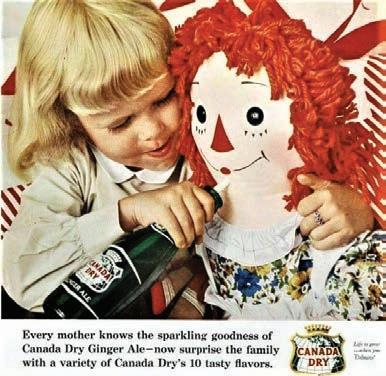
Zale’s Jeweler used Raggedy Ann to sell diamond rings in 1966. Zales compared having a diamond ring with, “The night of the first snowfall when you and Raggedy Ann curl up on a couch under a big quilt in front of a roaring fireplace and Mommy let you sleep there all night.” Zales did a wonderful job of summoning memories of childhood security and comfort using Raggedy Ann.
Vintage advertisements did more than tout the qualities of their products, they intentionally pulled on our heartstrings invoking our desire to be trendsetting, to assure our children were healthy, and appealed to our need to protect and keep our families safe, to have comfortable and attractive homes and for women to be stylish and feminine. All of these advertisements did so by placing some of our favorite dolls in their ads. Tricky? Maybe, but aren’t we glad they did?
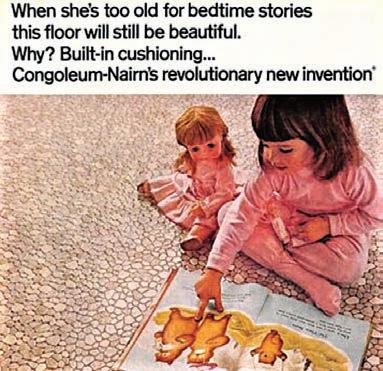
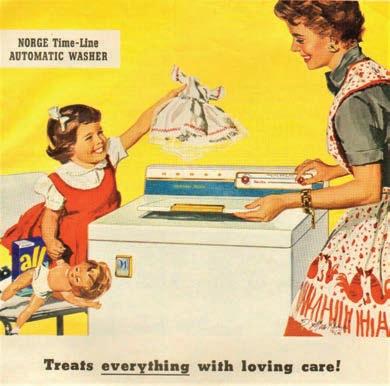

Top Row (left to right): Congoleum-Nairn’s flooring shows the Pink and Pretty Big Sister Doll from the 1965 Sears Christmas catalog.
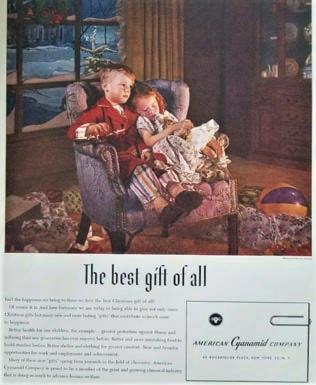
A Harriet Hubbard Ayer doll in a McCall’s 1954 advertisement for Ad Detergent, “It’s child’s play to get the cleanest wash yet.”
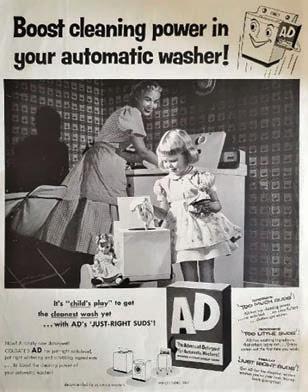
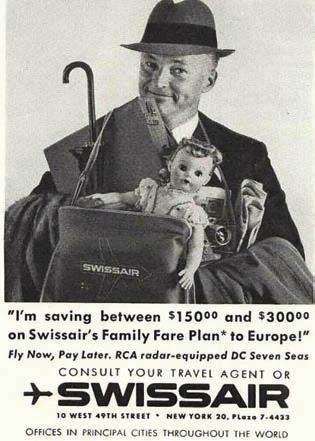
Second Row (left to right): Norge Time-Line automatic washer ad, 1946, shows a doll with the heading, “Treats everything with loving care.”
Swissair, 1958, advertises a family plan with a man carrying a Sears Happi-Time Toddler doll.
Bottom Row (left to right):
Little girl shares her Canada Dry Ginger Ale with Raggedy Ann, 1956. American Cyanamid Chemical Company in their 1952 advertisement shows a snowy night, but siblings and their doll have, “Greater protection against illness and suffering.”
Top Row (left to right):

Madame Alexander’s Cissy was used for many Yardley product magazine ads in a promotional campaign in 1956.
A 1957 Ivory Soap ad features a toddler and doll, “More doctors recommend Ivory than any other soap.”
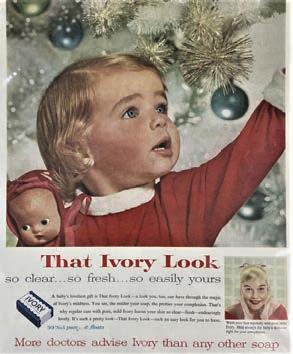
Pure-Pak Milk’s advertisement with, “Health protecting package!” shows Raggedy in the background, 1959.
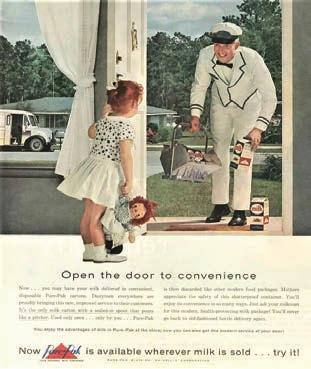
1950 Kelvinator refrigerator ad shows a mother and her little girl admiring the refrigerator with Raggedy Ann looking on.
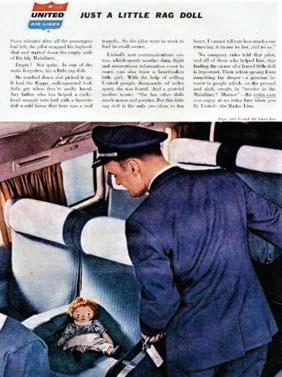
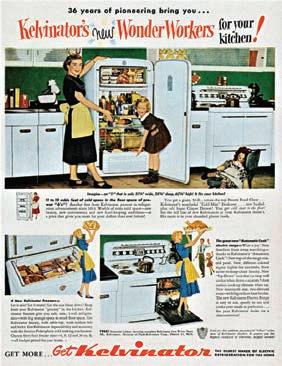
Bottom Row (left to right):
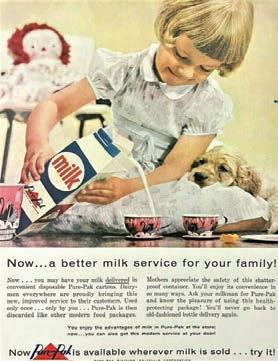
A United Airline’s captain finds a Raggedy Ann doll left behind in their 1958 ad.
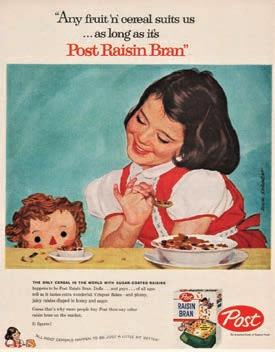
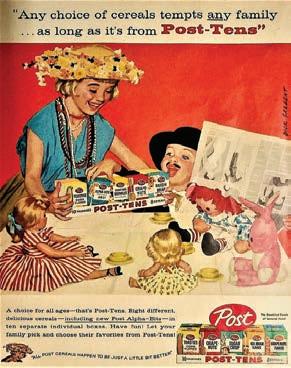
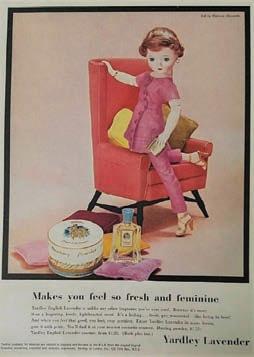
Post Raisin Bran, 1958, uses Raggedy Ann in their cereal advertisement.
Raggedy Ann appears in a Pure-Pak Milk ad in 1959 for, “convenient delivery.”
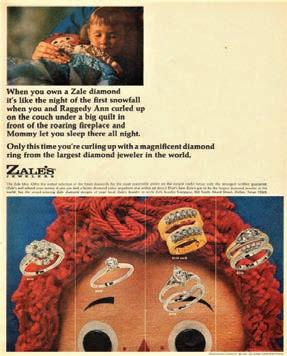
A 1958 ad for a Post-Tens pack of cereal features Little Miss Revlon, Ginny doll and Raggedy Ann.
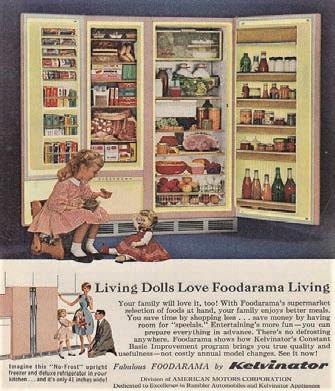
Left: A Madame Alexander’s Cissy doll advertises Yardley’s dusting powder, 1957.
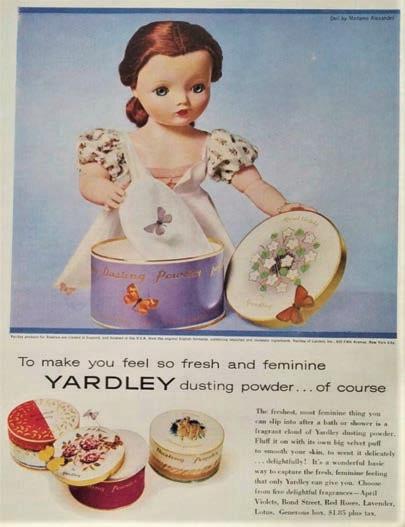
Top Left: A Kelvinator Foodarama refrigerator ad shows a little girl with her Madame Alexander Kelly doll, 1961.
Top Right: Zale’s Jewelers compares having a diamond ring with curling up with your Raggedy Ann doll in their 1966 advertisement.
It began with a painting, a study of a nude maiden, rather modestly posed, standing ankle deep in a misty lake tinted by the early morning sun. Painted in 1912 by French artist Paul Émile Chabas (1869-1937), Matinee de September (September Morn) caused little consternation

in its native France (Illustration 1). In fact the painting was awarded the Medal of Honor when it was exhibited in the Paris Salon. However, Ms. Morn received a very different reception upon her arrival in the United States the following year.
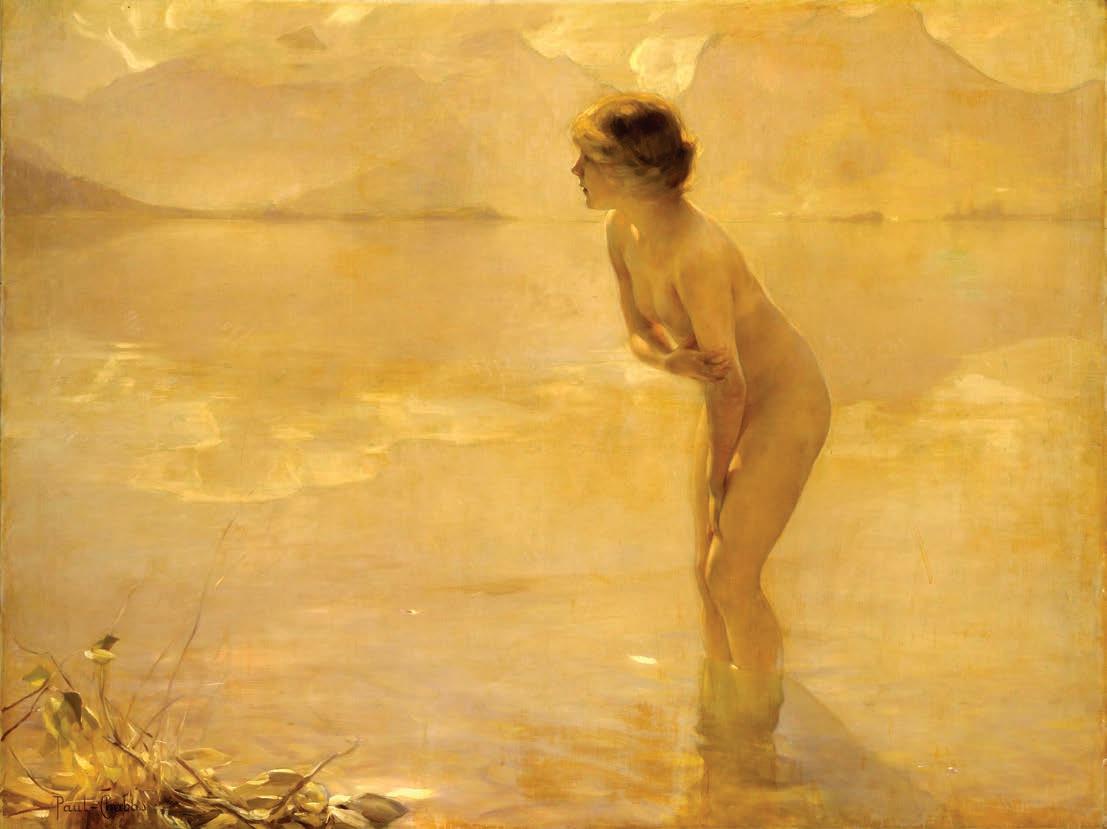
Oh! please don’t think I’m bad or bold Cause where it’s deep, it’s awful cold!” September Morning, G.G. Drayton
When a reproduction of the painting was exhibited in the window of a Chicago art store, the city charged the gallery owner with violating a city ordinance barring the display of lewd pictures. The subsequent trial for indecency and acquittal of the store owner first brought the painting to the wider attention of the American public. A subsequent display of Ms. Morn in the window of a New York City gallery caught the censorious eye of Anthony Comstock, the leader of the New York Society for the Suppression of Vice; Comstock is alleged to have charged into the gallery declaring that there was “too little morn and too much maid!” After the gallery owner refused to remove the picture from the window display, Comstock threatened legal action. Although the gallery owner was never charged, the press covered the story and soon crowds came to the store to admire Ms. Morn and to purchase prints of the now famous, or some would say infamous, picture. However, publicist Harry Reichenbach in his autobiography claimed that he was in fact responsible for introducing Comstock and Ms. Morn. Reichenbach asserted that the store had printed several thousand copies of the painting but was having trouble selling the prints. Hired by the store to create a demand for Ms. Morn, Reichenbach acted the role of the outraged citizen, repeatedly complaining to Comstock about the public display of the innocuous nude. To prove to Comstock that Ms. Morn was corrupting the nation’s youth, he took Comstock by the store where a gang of aforesaid youth (hired by Reichenbach at fifty cents apiece) were openly ogling the damsel on display.

Proving that there is no such thing as bad publicity, Ms. Morn soon became one of the most recognized and reproduced artworks in the United States. She appeared not only on postcards and prints, but adorned everything from stickpins to candy boxes. Scattered attempts throughout the country to suppress September Morn only added to her allure. Her popularity inspired various parodies, the most famous and sought after being created by illustrator Grace Gebbie Drayton, whose well-fed cartoon children appeared in popular comic strips and as mascots for the Campbell Soup Company.
The 6.5-inch tall vase in Illustration 2 substitutes one of Drayton’s chubby cherubs for the lithe Ms. Morn. The caption reads “Oh! please don’t think I’m bad or bold Cause where it’s deep, it’s awful cold!” Of excellent sharp bisque, underneath the vase is incised faintly underneath with the sunburst mark of the German company of Schafer and Vater and on the back of the base with a facsimile of Ms. Drayton’s signature, “G.G. Drayton.” (Illustration 3). This image and caption first appeared in two dimensions on postcards and prints with the title “September Morning (with apologies),” copyrighted in 1913 by the Campbell Art Company (the company was not the art arm of the Campbell Soup Company, but instead was founded by Alfred S. Campbell and specilized in fine art prints and reproductions).
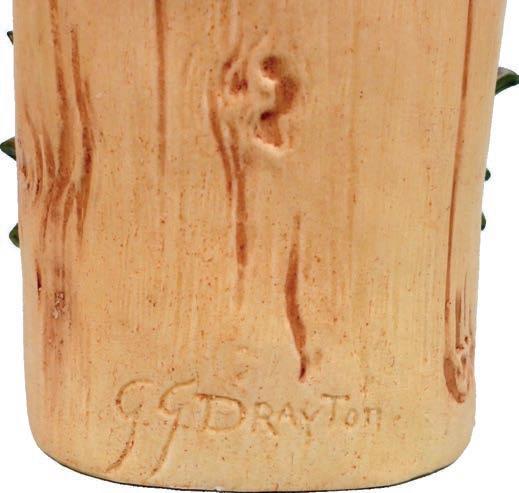
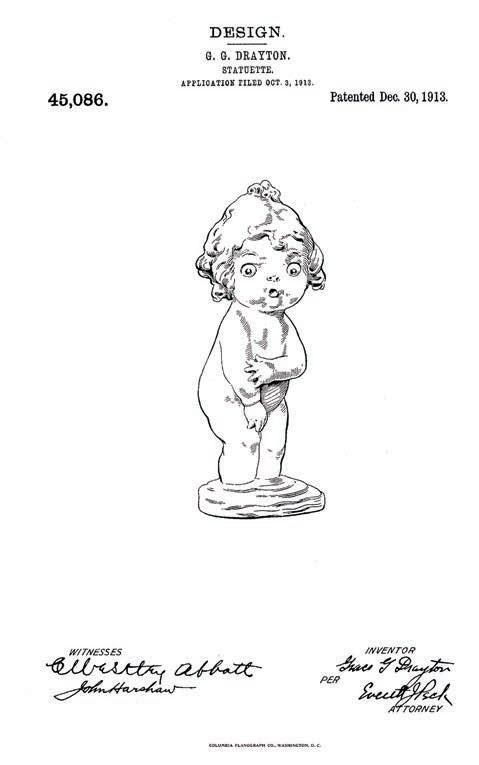
Illustration 2. 6.5” bisque vase designed by Drayton and manufactured by Schafer and Vater. Incised underneathwith the Schafer sunburst and on the back of the base “G.G. Drayton.”
Illustration 3. United States design patent granted to Drayton on December 30, 1913.
Illustration 4. Two bisque statuettes designed by Drayton. The taller is 6.5” and the other is 5.25”. Each signed on the back of the base with a facsimile of Drayton’s signature.
Drayton received a patent for a three-dimensional version of her cartoon on December 30, 1913 (Illustration 4). No mention is made of September Morning in the patent application, Drayton claiming only that she had “invented a new, original, and ornamental Design for a Statuette.”
Illustration 5 pictures two bisque versions of Drayton’s statuettes. The smaller statute is 5.25 inches tall and while sharply modeled is very simply decorated, the surprised skinny-dipper being left largely white, with her facial features accented with brown and the ripples at her ankles tinted pale blue.
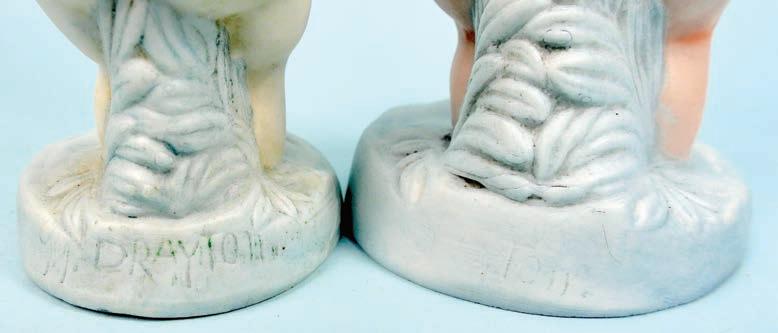

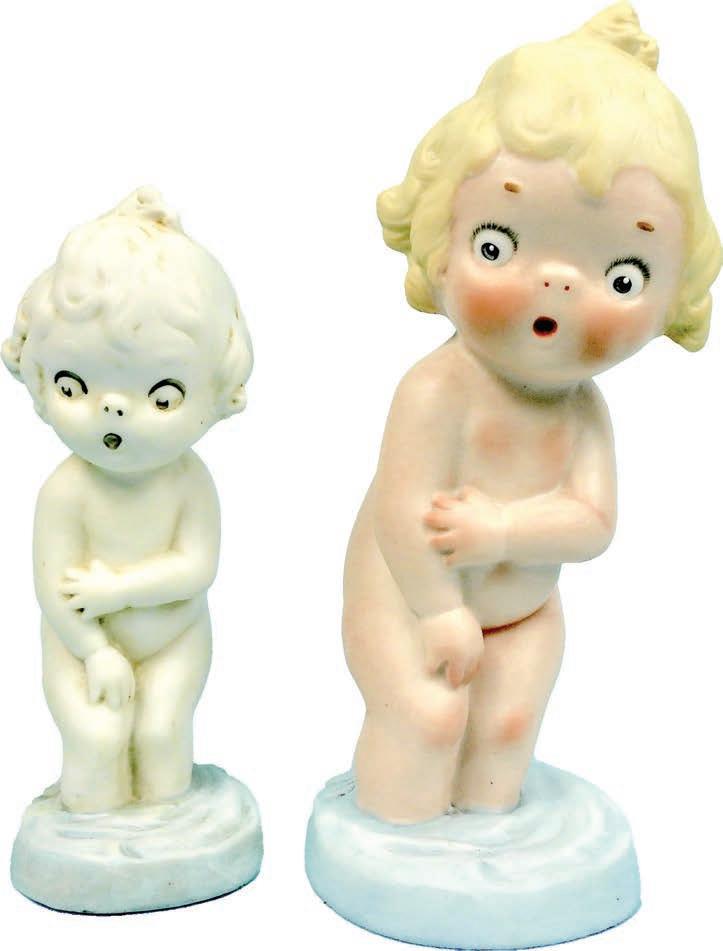
The larger lass, at 6.5 inches tall, is by contrast delicately detailed, with finely painted eyelashes accenting her highlighted eyes and a rosy complexion with lavish blushing. Both carry a facsimile of Drayton’s signature on the back of their bases, but have no other marks (Illustration 6).
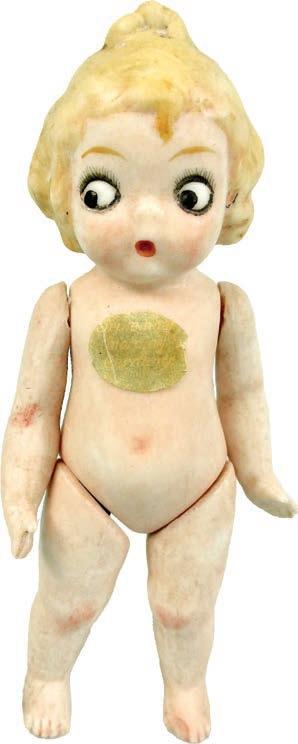 ABOVE: Illustration 5. Drayton’s facsimile signature on the statuettes.
RIGHT: Illustration 6. 4” tall “September Morning” all bisque doll. Loop jointed at the arms and legs,
ABOVE: Illustration 5. Drayton’s facsimile signature on the statuettes.
RIGHT: Illustration 6. 4” tall “September Morning” all bisque doll. Loop jointed at the arms and legs,
Drayton’s statuette soon evolved into a doll. This little all-bisque miss in Illustration 7 is just 4 inches tall and loop jointed at the hips and shoulders. She may be the smallest size of these elusive Drayton dolls, as I have seen versions up to 7.5 inches high. The original paper label on her chest reads “September Morning Germany” and the round paper label on her back declares “Design Patented.” George Borgfeldt and Company of New York applied for a patent on February 12, 1914, for a “September Morn” doll. Borgfeldt was a doll importer, assembler, and distributor in New York City, and worked with a number of companies and doll artists to arrange to have their creations manufactured in Germany, so it is probable that the company had a hand in helping Drayton’s statuette become a real doll.
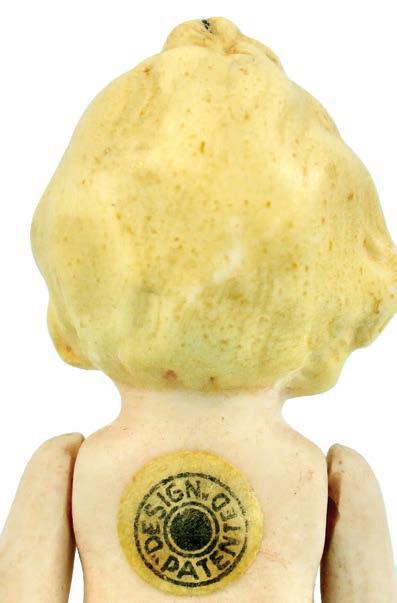
Drayton’s Little Miss September Morning certainly may not be “bad or bold,” but she is an endearing artifact of an era and a very collectible one at that. q
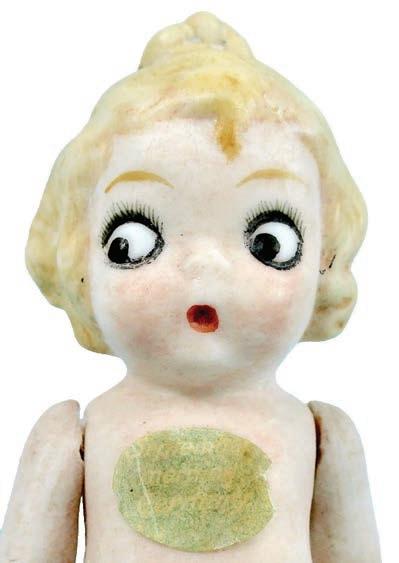
Illustration 8. Original paper label on the back of the doll reading “Design Patented.”
Illustration 7. Original paper label on the doll’s chest reading “September Morning Germany.”

Catalog of Copyright Entries, September morning (with apologies to Paul Chabas), Vol. 8 ,Part 4, Page 187, Washington Government Printing Office,1913. Drayton, G.G. (1913) Statuette, U.S. Patent No. D0045086, Washington D.C., United States Patent and Trademark Office. Official Gazette of the United States Patent Office, September Morn’ Doll, Vol. CCI, Page 885, Washington Government Printing Office, April,1914.
Strong, Mark. “Campbell Art Co.” Meibohm Fine Arts, www. meibohmfinearts.com/artists/details/105 Weintraub, Sharon. Bawdy Bisques and Naughty Novelties; German Bath/ing Beauties and Their Risqué Kin. Atglen, Pennsylvania, Schiffer Publishing, Ltd,, 2005.
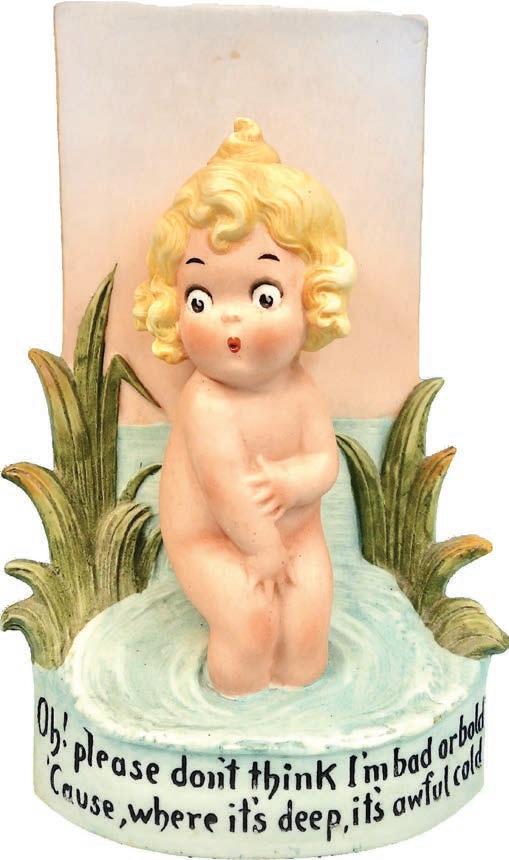
The Founding of the United States about unsung heroes of the American Revolution. The first name mentioned was Phillis Wheatley! The next name is Crispus Attucks. What are the chances that these two names would appear? The two Floyd Bell dolls I own are Phillis and Crispus. Another Synchronous moment!
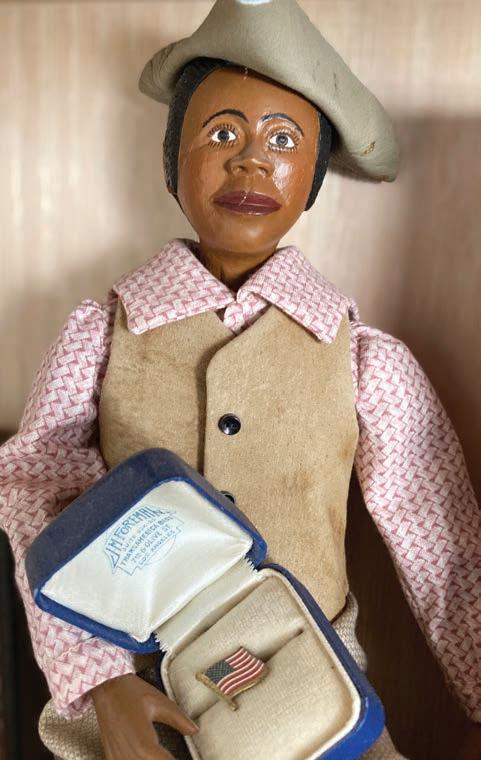
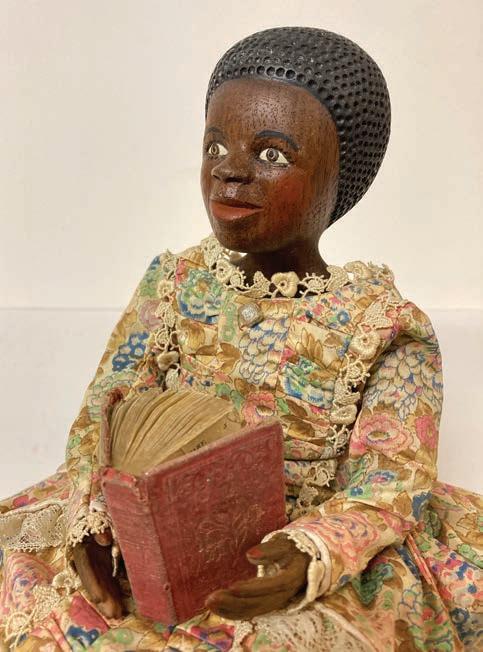
What students should learn in American schools above all is the foundations of our country.
Many of us learned about George Washington, Paul Revere, and even Betsy Ross. However, the history of the Revolutionary War is vast with heroes that may not have been covered in American History classes. Below, we’ve profiled ten men and women who deserve recognition for their accomplishments during the Revolutionary War.
Phillis Wheatley waged a war for freedom with her words. Captured as a child in West Africa, then taken to North America and enslaved, Wheatley had an unusual experience in bondage: Her owners educated her and supported her literary pursuits. In 1773, at around age 20, Wheatley became the first African American and third woman to publish a book of poetry in the young nation. Shortly after, her owners freed her. Her work, which reflected her close knowledge of the ancient classics as well as Biblical theology, carried strong messages against slavery and became a rallying cry for Abolitionists.
Many historians credit Crispus as the first man to die for the rebellion. He became a symbol of black American patriotism and sacrifice. Tensions mounted between the British and the Colonial sailors of Massachusetts ports, in March of 1770—coming to a head in an angry confrontation that became known as the Boston Massacre.
Witnesses say that Attucks, who was a runaway slave who worked as a sailor and rope maker played an active role in the defense of the colonial sailors against the British. Of the five colonists who died, he was said to be the first to fall. Attucks is also credited as being the first martyr to the American cause.
While Floyd’s dolls have always given me great joy, to that I can now add that they have provided a touch of magic, i.e. synchronicity, as well.
Crispus AttucksThe world’s leading magazine devoted to dolls: antique, vintage, collectible and artist dolls, dollhouses, miniatures, bears and doll companions.
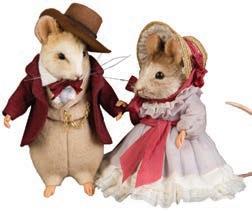
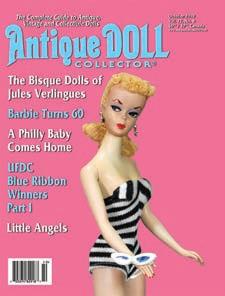

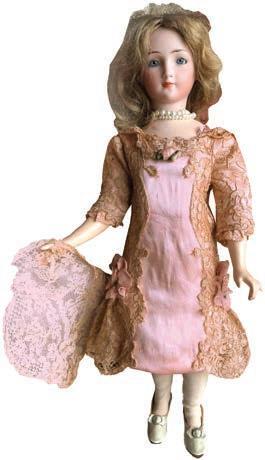
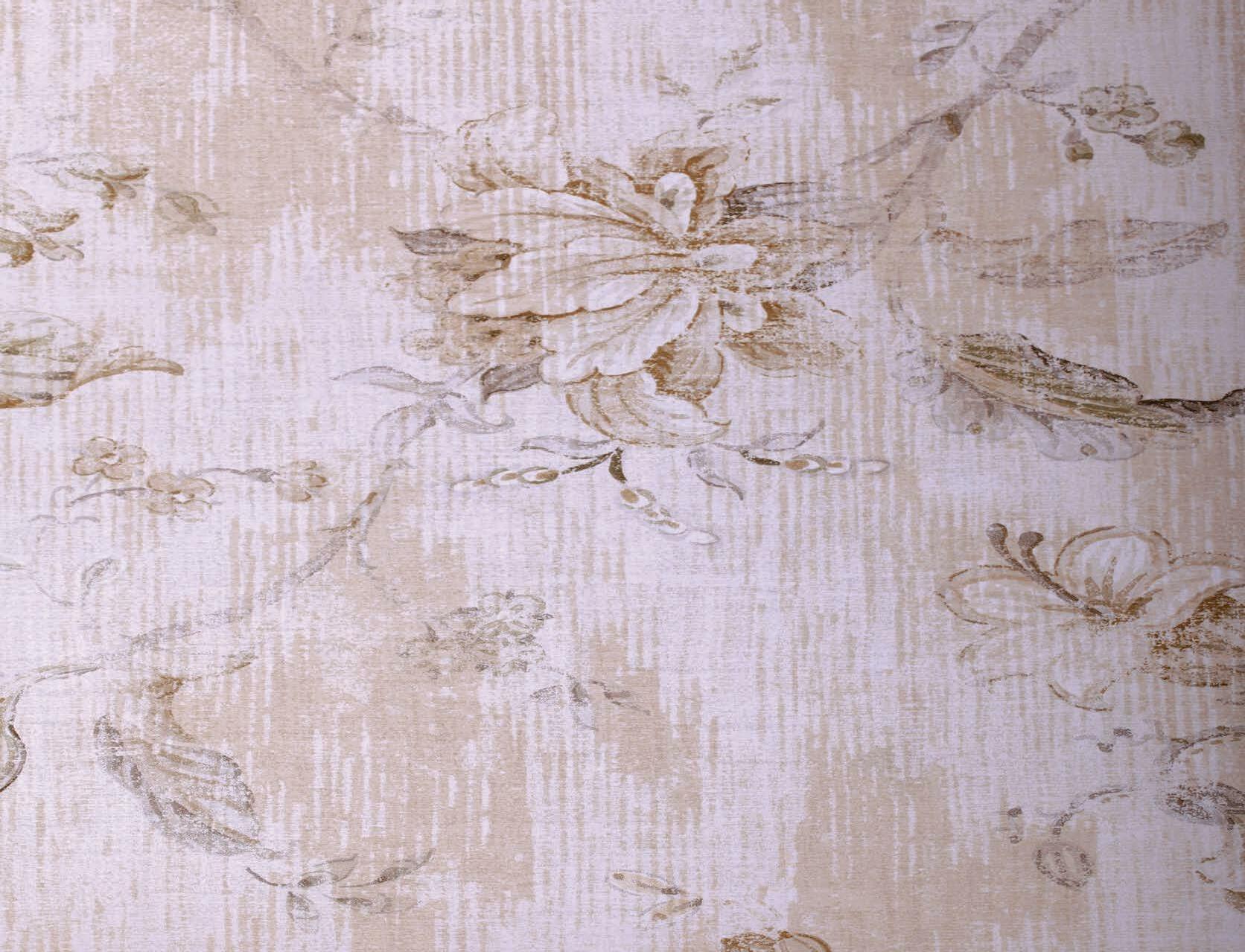
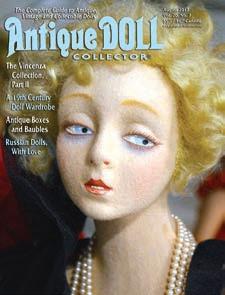
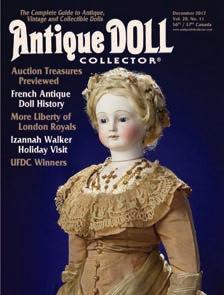
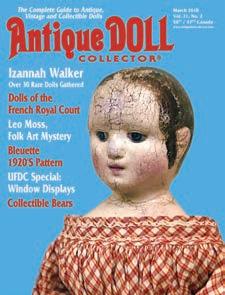
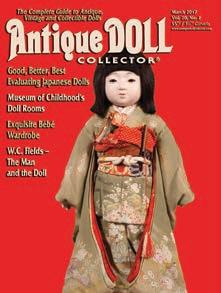
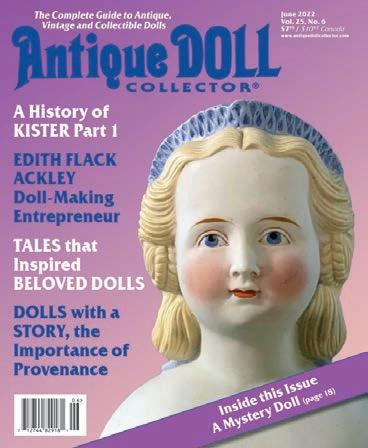
In-depth articles with great color photos by noted experts.
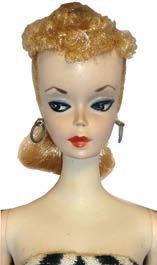
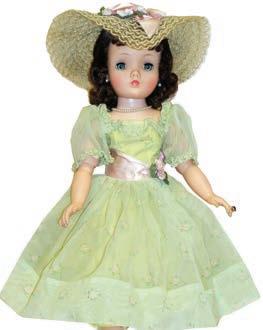
Advertising from the world’s foremost doll dealers and auction houses.
Beautiful easy-to-follow patterns.
Be among the first to see previews of upcoming auctions.
A comprehensive review of the UFDC National Convention.
Highlights from important doll shows.
The latest auction and museum news.
An opportunity to sell your dolls in our Emporium and Classified ads.
A calendar of shows, auctions, and museum exhibitions.
Jan 2009 “Charming Chinas: Affordable China Head Dolls,” by Jacqueline Wilson Apr 2009 “Identifying Miniature Parian Dolls, 1850s-1900s,” by Kathy Embry Aug 2009 “Identifying German Chinas and Parians, Part One,” by Mary Krombholz Sept 2009 “Identifying German Chinas and Parians, Part Two,” by Mary Krombholz Sept 2010 “Study of a Parian Peddler and Her Wares,” by Debra Gulea Apr 2011 “A Study of Similar China and Parian Molds,” by Fred Olsen Jul 2011 “Those Rare, Elegant China Head Dolls,” by Maureen Herrod
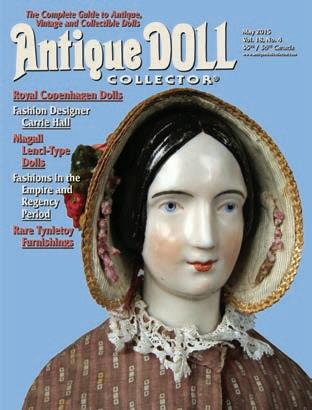
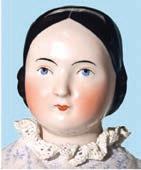

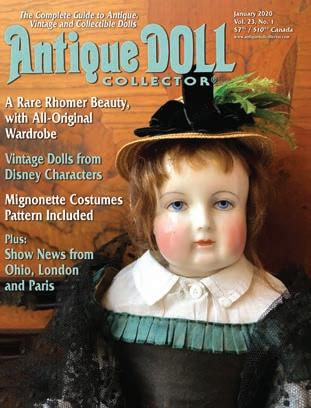
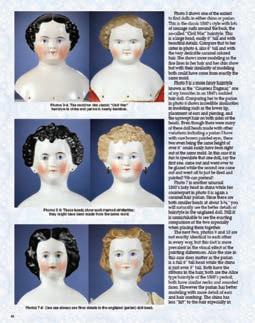
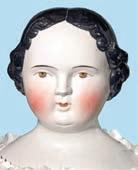
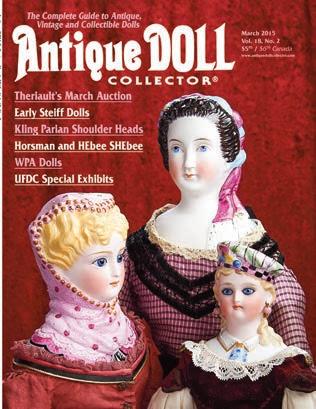
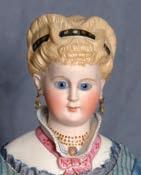
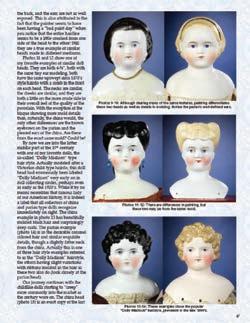
2011 “Schlaggenwald Chinas, Part I,” by Susan Moore Oct 2011 “Schlaggenwald Chinas, Part II,” by Susan Moore Sept 2012 “China Dolls with Exquisite Faces,” by Laurie Christman
2013 “Another French China Doll?” by Estelle Johnston
2015 “Identification and Dating of Kling Parian Shoulder Heads, Part One,” by Mary Krombholz Feb 2015 “Rörstrand of Sweden. . . A Closer Look,” by Kate Reed Mar 2015 “Identification and Dating of Kling Parian Shoulder Heads, Part Two,” by Mary Krombholz May 2015 “‘To be or not to be, that is the question!’ An Antique or Reissue Royal Copenhagen Doll,” by Laurie Christman Apr 2018 “China Heads in Exotic Garb: A Rare Group Examined,” by Linda Holderbaum Dec 2018 “Tinted China Dolls,” by Martha Waterman Nichols Jun 2019 “Hertwig China Gentleman: A Repair Odyssey,” by Mary Elizabeth Lampron Groupé Dec 2019 “Who am I? Clues from Porcelain Doll Shoulder Heads” by Ann Coleman
2020 “Mademoiselle Eglantine de la Maison Rohmer, s’il vous plait!” by Samy Odin Jul 2020 “The Lovely Bathing Beauties of Galluba and Hoffman,” by Judit Armistead Oct 2021 “The Eyes Have It. The Pink Ladies of Blampoix,” by Melanie Luther

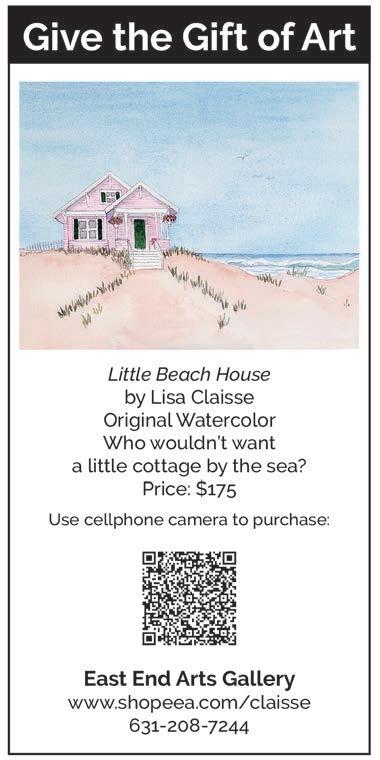
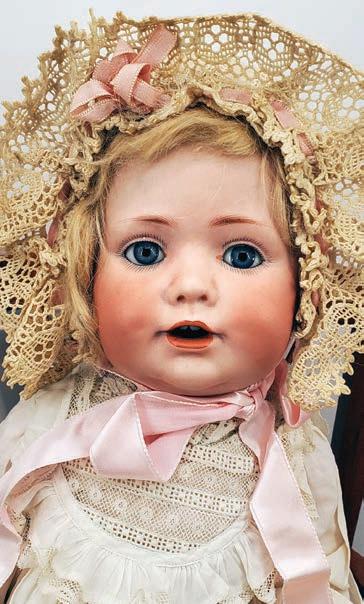
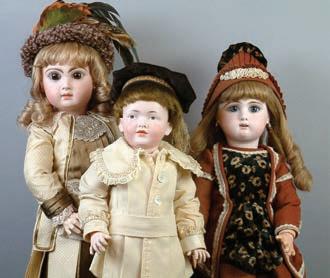
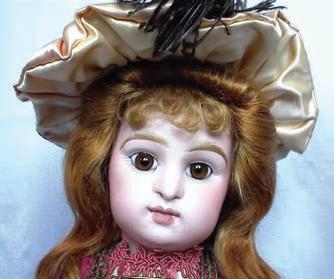

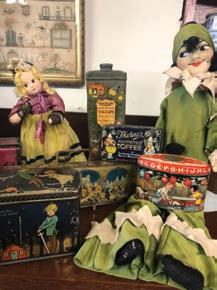
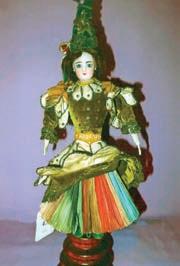
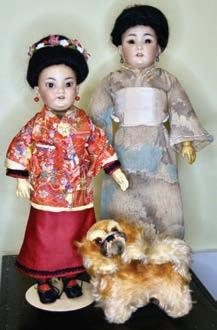
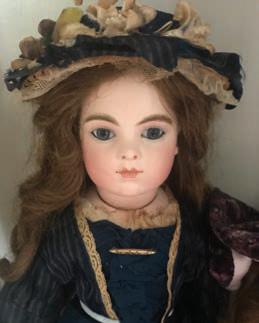

Send in your Calendar Listing to: antiquedollcollector.com/enhancedevents.html or email events@antiquedollcollector.com or mail to Antique DOLL Collector, c/o Calendar, P.O. Box 349, Herndon, Virginia 20172. If you plan on attending a show, please call the number to verify the date and location as they may change.
4/09/22-10/30/22 ~ Switzerland. Spielzeug Welten Museum Basel. Special exhibition “Happy Birthday Globi!” +41 (0)61 225 95 95. sina@swm-basel.ch. www.swmb.museum.
4 ~ Iowa City, IA. Ackerman’s July 4th Stars and Stripes Antique Market. Johnson County Fairgrounds. Ackermans. 319-338-8449 or 319-430-3737. ba_iowacity@yahoo.com.
9 ~ Fletcher (Asheville), NC. Doll & Bear Show & Sale. WNC Agricultural/Boone Bldg, 1301 Fanning Bridge Rd. Southeastern Doll Shows. Jackie Stone. jackiestone@charter.net. www.SoutheasternDollShows.com.
17 ~ Buena Park, CA. Doll Show & Sale. Sherri’s Doll Show Featuring Barbie Dolls. Holiday Inn, 7000 Beach Blvd. Sherri Gore. 424-394-7612. sherribean7@aol.com.
24 ~ St. Charles, IL. Chicago Toy Show. Kane County Fairgrounds, Lincoln Hwy/IL Route 38. 4th Sunday of April, July & October. Herb@chicagotoyshow.com. 847-800-3009. Diana@chicagotoyshow.com. 847-772-6760. www.illinoisdollshows.com/.
26 ~ Hatfield, PA. STEIFF: Antique, Vintage, Artist Bears and Others. Online auction only. Alderfer Auction. 501 Fairgrounds Rd. 215-393-3000. www.alderferauction.com.
31-8/4 ~ St. Louis, MO. Dolls & Teddy Bears Show and Sale. Holiday Inn St. Louis Convention Center. 811 N. 9th St., Downtown. Rowbear Presents. Rowbear Lowman. 831-438-5349. NationalDollFestival@charter.net. NationalDollFestival.com.
2-6 ~ St. Louis, MO. UFDC 73nd Annual Convention. Timeless Treasures. Hyatt Regency St. Louis at The Arch. 315 Chestnut Street, St. Louis, MO. www.ufdc.org/convention.
5-8 ~ Online. Summer Sizzler Teddy Bear Online Show. Valerie Rogers, 502-423-7827, brtstar1@aol.com. www.bright-star-promotions.com.
14 ~ Hasbrouck Heights. Hasbrouck Heights NJ Doll, Bear & Miniature Show & Sale. Hilton Hasbrouck Heights. 650 Terrace Heights. Wendy Collins. 603-969-1699. CollinsGifts14@aol.com. Gary Passamonte. 845-271-9094. Gand@optonline.net.

21 ~ Lynnwood, WA. Antique Doll & Toy Market. Embassy Suites Hotel. 20610 44th Ave. Lisa Pepin. pepins4@msn.com. 206-669-7818.
21 ~ Strongsville, OH. Northern Ohio Doll & Bear Show. Best Western Plus, 15471 Royalton Rd., 44136. Eileen Green. 440-283-5839. phdofdolls@yahoo.com.
27 ~ San Diego, CA. Doll Show & Sale. Delightful Dolls of Southern California. Handlery Hotel 950 Hotel Cir N. Linda Payne Smith. lpaynesmith@cox.net. 619-265-0443.
27 ~ Schertz (San Antonio), TX. Doll Show & Sale. Hill Country Doll Show & Sale. Schertz Civic Center, 1400 Schertz Pkwy. Dorothy Meredith. 830-606-5868. dmeredith@dolldr.com. www.dolldr.com.
28 ~ Dedham, MA. Summer Dedham MA Doll, Bear & Folk Art Show. Collins Gifts. Sturbridge Host Hotel. Wendy Collins. 603-969-1699. CollinsGifts14@aol.com. www.collinsgifts.com
3 ~ Westhampton, NJ. Crescent Shrine. Sweetbriar Auctions Antique & Vintage Doll Auction. Dorothy Hunt. 410-275-2213. sweetbriar@live.com. www.sweetbriarauctions.com.
9-10 ~ Burbank, CA. Jewel City Doll Club 43rd Annual Doll Show and Sale. Burbank Elks Lodge. 2232 N. Hollywood Way. Admission $5. Free parking. Jewel City Doll Club. Janie Olds. 562-818-2501. j.l.olds@ca.rr.com.
9-12 ~ Online. Fall Stars Teddy Bear Online Show. Valerie Rogers, 502-423-7827, brtstar1@aol.com. www.bright-star-promotions.com.
10 ~ Triangle (Raleigh-Durham-Chapel Hill), NC. Triangle Doll & Bear Show & Sale. Southeastern Doll Shows. Amran Shriners Temple, 11101 Creedmoor Rd, Raleigh. Jackie Stone. jackiestone@charter.net. www.SoutheasternDollShows.com.
11 ~ ‘s-Hertogenbosch, Netherlands. The Big Event. Brabanthallen. Niesje Wolters van Bemmel agency. Suzan and Paul. 0031 (0)6 300 99 458. English, German and Dutch. info@niesjewolters.nl. www.niesjewolters.nl.

17 ~ Albany, NY. Shaker Doll Club Show & Sale. Admission $6. St. Sophia Greek Orthodox Church, 440 Whitehall Road. Linda Schatz. Liberty3@prodigy.net. 518-767-2924.
15-17 ~ Houston, TX. “Together Again! Friends, Dolls & Fun” Bay Area Doll Club of Texas Convention. Bay Area Doll Club. Marriott South, 9100 Gulf Freeway, Houston, Texas. Rebecca Hisle. 281-614-0077. beccasdolls@gmail. com. Convention workshops, dinners, DAG competition, and Sales Room.
17 ~ Marietta, OH. Fundraiser Doll Show & Sale. Children’s Toy and Doll Museum. American Legion Post 64, 800 Wooster St. Donna Kern. 740-373- 0349 or 740-516-3888 (cell). djdekern@suddenlink.net. mariettaohio.org/ member/toy-doll-museum/.
17-18 ~ Pecatonica, IL. 41st Semi-Annual “PEC THING” Antique & Flea Market. Winnebago County Fairgrounds. Off US Rte. 20, Halfway between Rockford and Freeport, IL. 815-239-1641. www.winnebagocountyfair.com. fairinfo@winnebagocountyfair.com.
Contact: Kay: 406-360-7214 (no text), or schrader1501@blackfoot.net
Karen: 970-381-9892, or ufdcrd6@ufdc.org
24 ~ Wichita, KS. Wichita Doll Show. Wichita Antique Doll Study Group. Holiday Inn Wichita KS. 549 S. Rock Road. wichitadollshow@outook.com. facebook.com/WichitaDollShow.
1 ~ Concord (San Francisco Bay Area), CA. Doll Show & Sale. 10am-3pm. World Doll Day Shows. Concord Plaza Hotel, 45 John Glenn Dr. Mary Senko. 425-330-1770. mary.senko@comcast.net. www.WorldDollDayShows.com.
2 ~ Plymouth, MN. Dolls & Toys & Bears OH MY! Shows by Bernadette. Annual Fall Show & Sale. Crowne Plaza Hotel. facebook.com/DollsToysBearsOHMY. dollstoysbearsohmy.wixsite.com/classic-layout.
2 ~ Sturbridge, MA. Sturbridge MA Fall Doll, Bear & Folk Art Show and Steiff Trunk Show. Collins Gifts. Sturbridge Host Hotel. Wendy Collins. 603-969-1699. CollinsGifts14@aol.com. www.collinsgifts.com
8 ~ Fredericksburg, VA. The Now and Then Doll Club Annual Doll Show and Sale. Fredericksburg Elks Lodge #875, 11309 Tidewater Trail. 10:00 am – 4:00 pm. Adults: $6.00/ $3.00 children. Contact: wanda.miller@verizon.net. 804-513-9011.
8-9 ~ Newark, OH. Ohio National Doll Show & Sale. A Doll Show like they used to be, JOY! The Complete Doll Buying Event with Nationally Recognized Dealers and Artists. Saturday: Lectures/Meal Events (see website for details), Sunday: Doll Show & Sale. New venue! Cherry Valley Hotel & Event Center, 2299 Cherry Valley Rd.SE, 43055. Gail Lemmon at 440-396-5386 or ohionationaldollshow@gmail.com. www.ohionationaldollshow.com. Calendar continued on page 72
10 A.M. to 2 P.M.
Handlery Hotel 950 Hotel Cir N, San Diego, CA 92108
Cost $6.00 Under 12 free with adult Percentage of Proceeds are donated to Children’s Charities.

Teddy bears to vintage doll clothing to beautiful antique dolls to unique artists’ dolls Doll stringing is available. Over 60 dealers! One of the most eclectic shows in Southern California.
For more info: Linda Payne Smith | lpaynesmith@cox.net | 619 265 0443 Visit us on Facebook: www.facebook.com/DelightfulDolls/
Sept 15-17 ~ Houston, TX. Bay Area Doll Club Festival and Doll Artisan Qualified Competition. Bay Area Doll Club. Marriott Hotel Houston, Hobby 9100 Gulf Freeway, Houston, TX 77017. Rebecca Hisle. 281-614-0077. beccasdolls@gmail.com. Must Register to attend the 3-day Festival. For more information, contact email in this listing.
Sept 24, 2022 ~ Seattle, WA. Seattle Doll & Bear Show. Queens of the Doll Aisle. DoubleTree Suites by Hilton, Seattle Airport Southcenter, 16500 Southcenter Parkway, Seattle, WA 98188. Hours: 11am to 4pm. Joe Koury. joe@queensofthedollaisle.com. 650-303-4140.
44th Annual Doll & Bear Show & Sale Sunday, October 9, 2022 10:00 am to 3:00 pm Machinists Hall 12365 St. Charles Rock Road Bridgeton, MO 63044

Adults - $6.00
Children 12 and under – FREE Early Buyer (9:00 am) $10.00
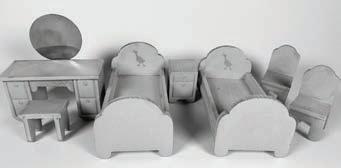
For more info: Connie 314-440-4086 Jeff 314-422-1502
Dealer Inquiries Welcome!
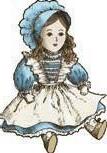
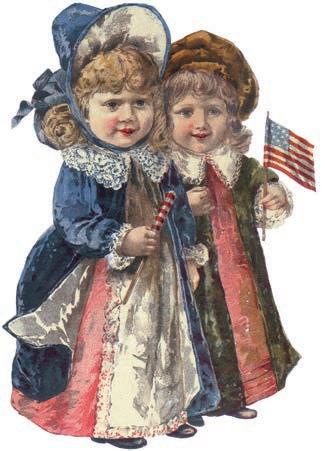
Visit us on Facebook: The Spirit of St. Louis Doll Club and at www.stlouisdollclub.com
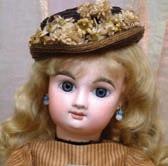
9 ~ Bridgeton (St. Louis), MO. Doll & Bear Show & Sale. The Spirit of St. Louis Doll Club. Machinist Hall, 12365 St. Charles Rock Rd. Connie 314-440-4086. clknarr@aol.com. www.stlouisdollclub.com.
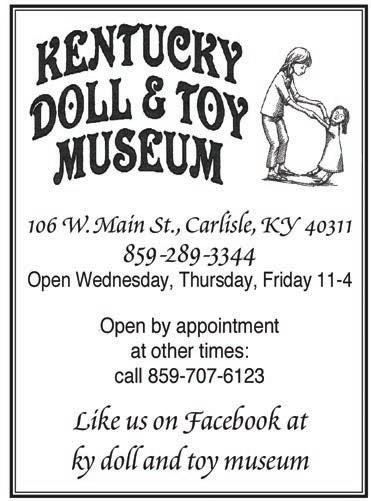
9 ~ DeWitt (Lansing), MI. Doll Show & Sale. Banquet and Conference Center of DeWitt. Sandy Johnson Barts. 269-599-1511. SJBbetsys@comcast.net. www.lansingdollshow.com.
9 ~ Phoenix, AZ. Valley of the Sun Annual Doll & Bear Show. No. Phoenix Baptist Church, 5757 N Central Ave, 85012. Harlene Soucy. 480-831-9081. soucy12@cox.net. Tables: Bebe Brown. 480-628-9586. bbgray23@gmail.com.
15 ~ Des Moines, IA. Happy Sisters Doll & Toy Show. American Legion Hall #374. Betty Peterson. bpcleo@netzero.com. 515-664-4992 (call or text).
15 ~ Shreveport, LA. Doll Luncheon & Show. North Louisiana Antique Doll & Toy Club. First Baptist Church, 543 Ockley Dr. Robin Grubbs. 318-780-8864. weebeetoys@bellsouth.net. Anita Berg: anitahb@mac.com.
16 ~ Portland, OR. Portland Doll & Bear Show. Queens of the Doll Aisle. We have a new location! Embassy Suites - Portland Airport. 7900 NE 82nd Avenue. Portland, OR. Hours: 11 am to 4 pm. Joe Koury. joe@queensofthedollaisle.com. 650-303-4140.
16 ~ Cheektowaga, NY. Niagara Frontier Doll Club’s 35th Annual Show & Sale. Buffalo Airport Hotel 6600 Genesee St. Marlies Wesolowski. 716-649-3305. marlieswesolowski310@gmail.com. Facebook - Niagara Frontier Doll Club’s Annual Doll Show.
20-23 ~ Baltimore, MD. Baltimore Art, Antique & Jewelry Show. Palm Beach Show Group. Baltimore Convention Center, Inner Harbor, One W. Pratt St. 561.822.5440. info@palmbeachshow.com. www.PalmBeachShowGroup.com.
22 ~ Jonesborough, TN. Doll Show & Sale. Jonesborough Visitor Center, 117 Boone St. Ellen Stafford. 423-753-0022. ellen@jonesdollhouse. com. Jonesdollhouse.com.
22 ~ Marietta, GA. Doll Show & Sale. Peachtree Doll Collectors. Faith Lutheran Church & School. Brenda Welker. 678-523-3150. BLWelker8@gmail.com.
22 ~ Rossford (Toledo), OH. Doll, Bear & Toy Show & Sale. Toledo Doll Show. Total Sports Rossford, 10020 S Compass Dr. Karen Kosies. toledo@dollshows.net. Call/Text 520-270-0179. www.toledodollshow.net.
23 ~ Oxnard, CA. Doll Show & Sale. 10am-3pm. World Doll Day Celebration. Courtyard by Marriott, 600 E. Esplanade Dr. Mary Senko. 425-330-1770. mary.senko@comcast.net.


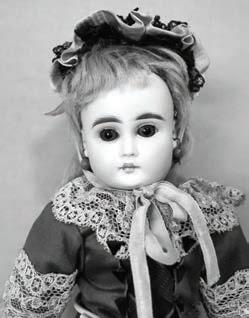
Find more doll events www.antiquedollcollector.com, select “Events” tab.
Please include payment with your ad. Larger ads are considered display ads — call us for information. Monica Besette at 717-752-9090 or email monicab@antiquedollcollector.com Antique Doll Collector P.O. Box 349, Herndon, VA 20172
OPEN Thursday Saturday 10 am 4 pm
NCMDTM.com or 704‑762‑9359
Ph. 732‑536‑4101 Email: santiqbebe@aol.com www.rubylane.com/shops/sarabernsteindolls



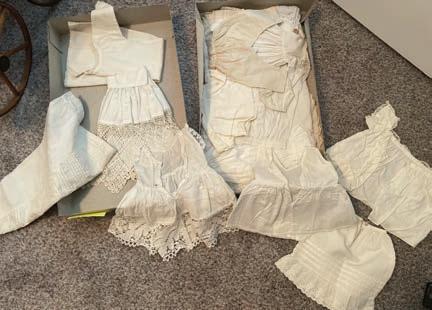
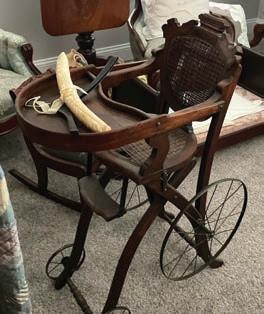

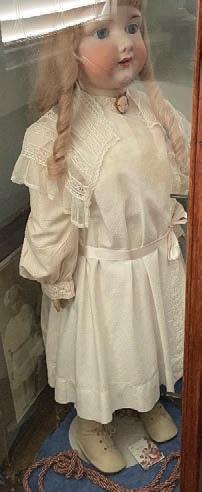
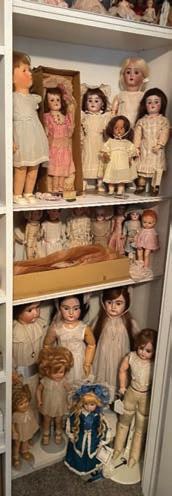
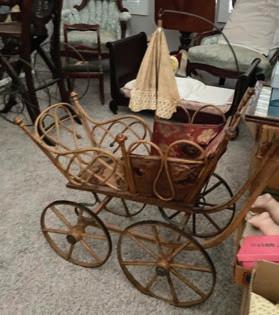
1025 Bowman Rd., Westfield, NC 27053
Find my latest treasures in a charming setting. Make an appointment to visit my private doll shop. Socially distanced and by appointment only. Please call or text me to make an appointment: 336.755.1400
Looking forward to seeing you in St.
You’ll be greeted by a fresh collection of brand new items, some pictured below!! Plus, my shop is always chock full of doll goodies galore and the option to buy, sell or trade! Choose from my large and well-priced collection of antique and vintage doll dresses, slips, chemise, pantaloons, shoes, wigs, ribbons, fabrics, furniture and accessories. Bring your dolls to dress, trade and repair. Have fun!!
If you are thinking of selling your doll treasures, I buy everything from one doll or doll accessory, to an entire collection. I pay excellent prices for dolls, shoes, clothes, wigs, miniatures, doll jewelry, doll houses, furniture and accessories.
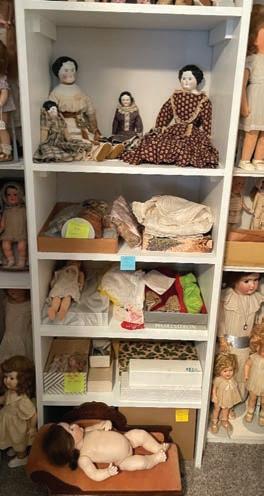
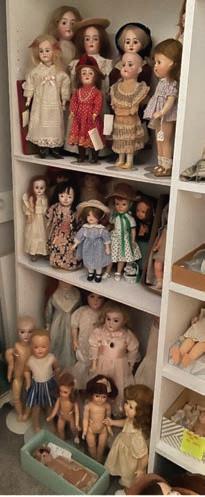 Louis at Rowbear’s National Doll Festival, August 31st - July 3rd
Louis at Rowbear’s National Doll Festival, August 31st - July 3rd
